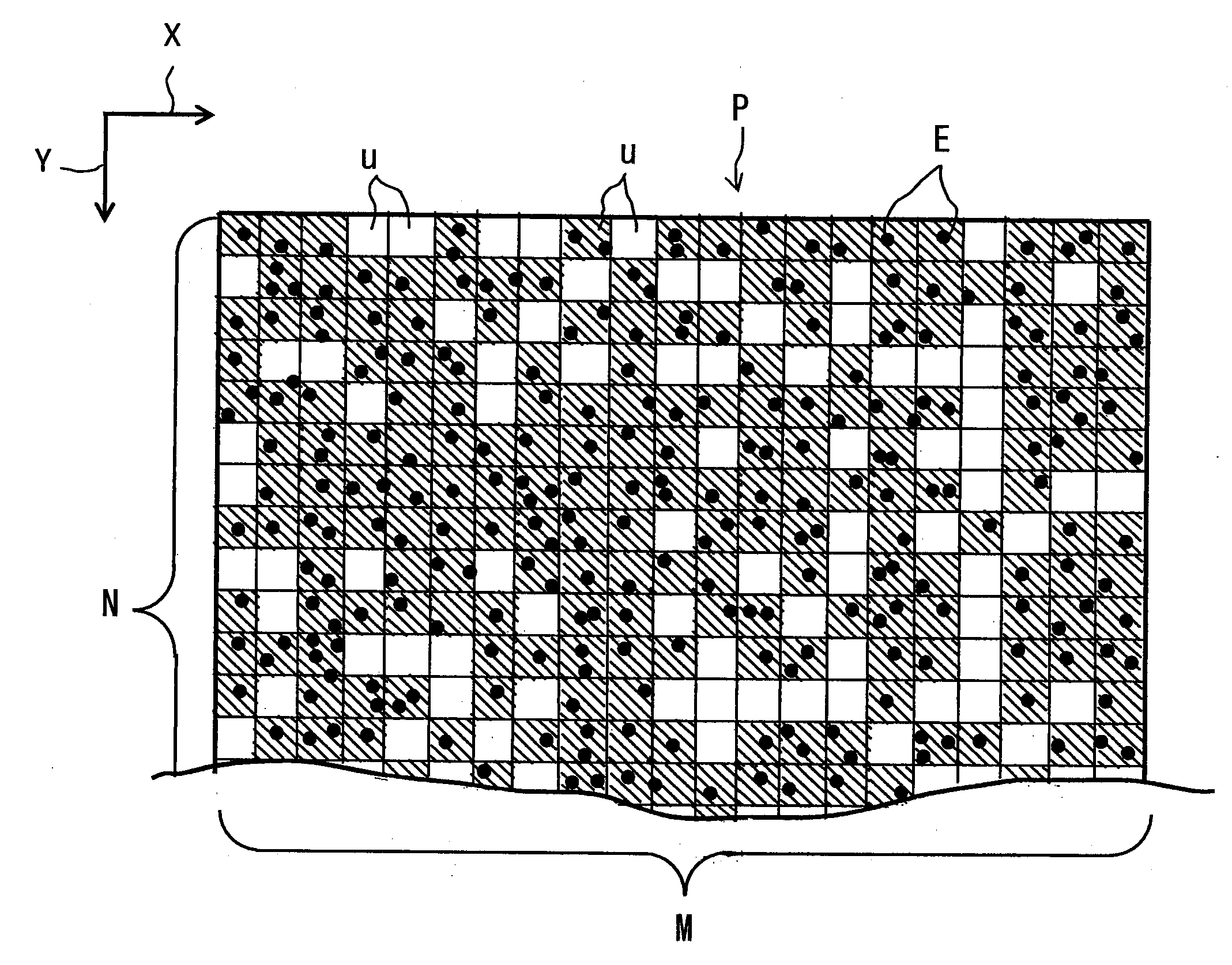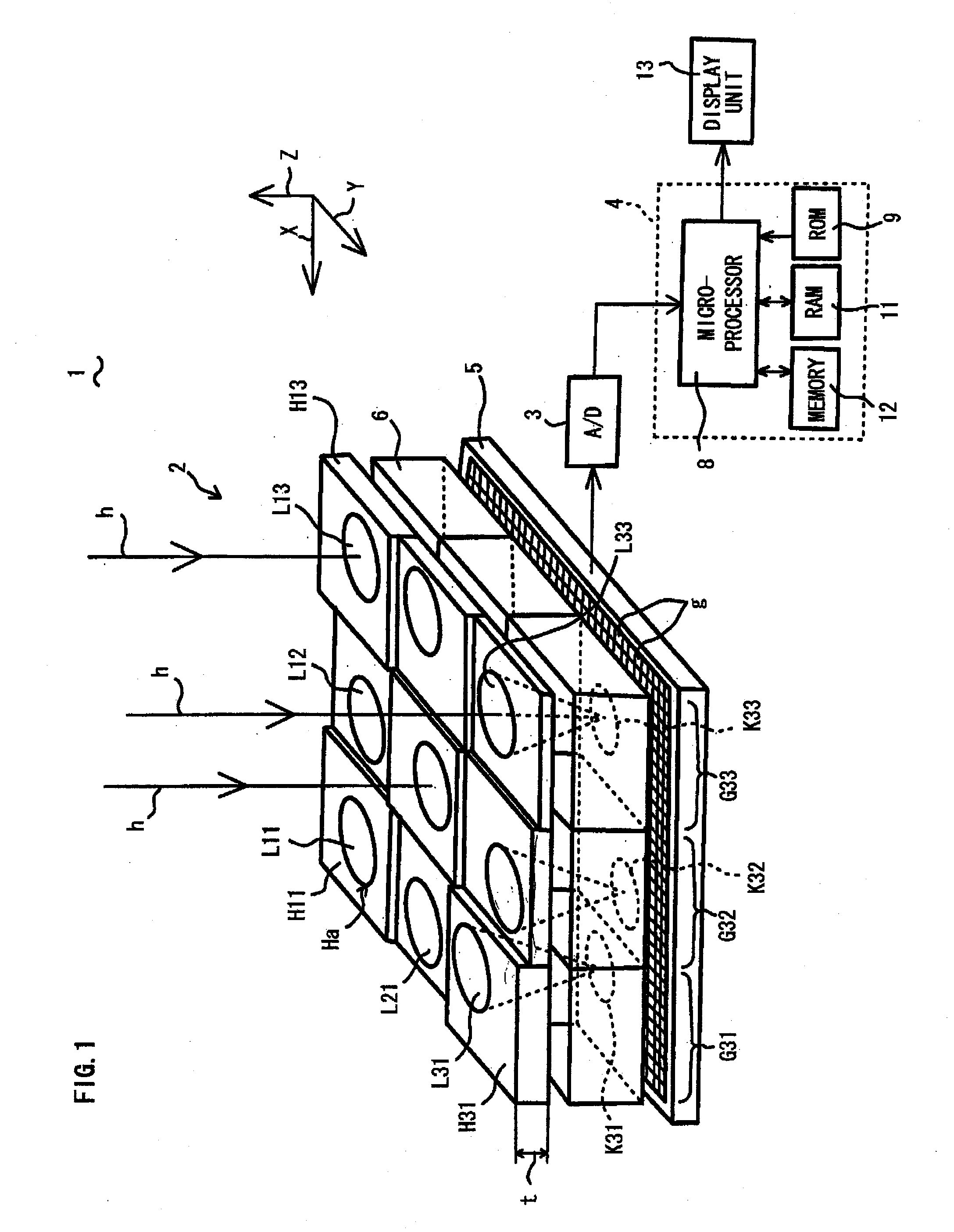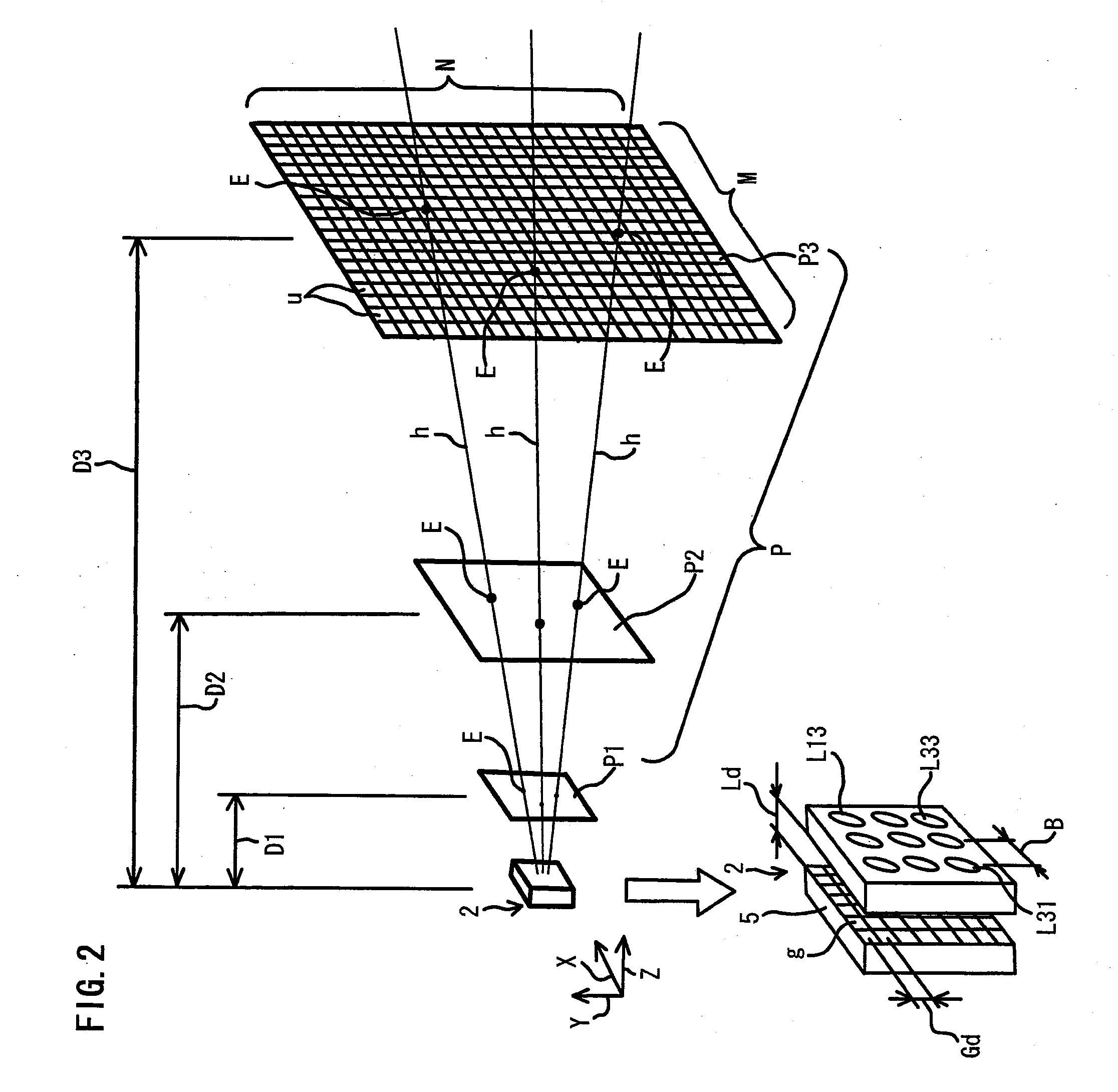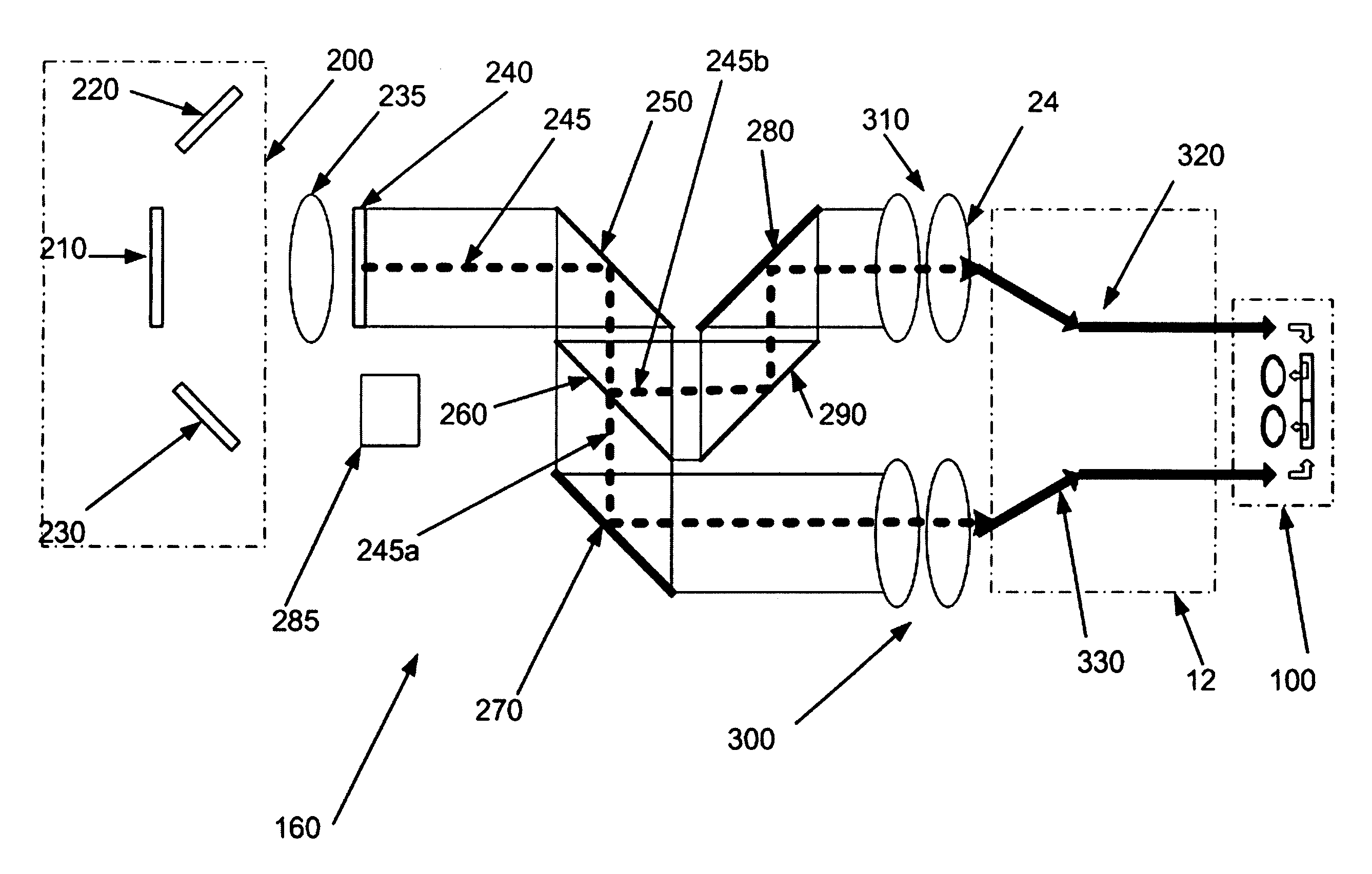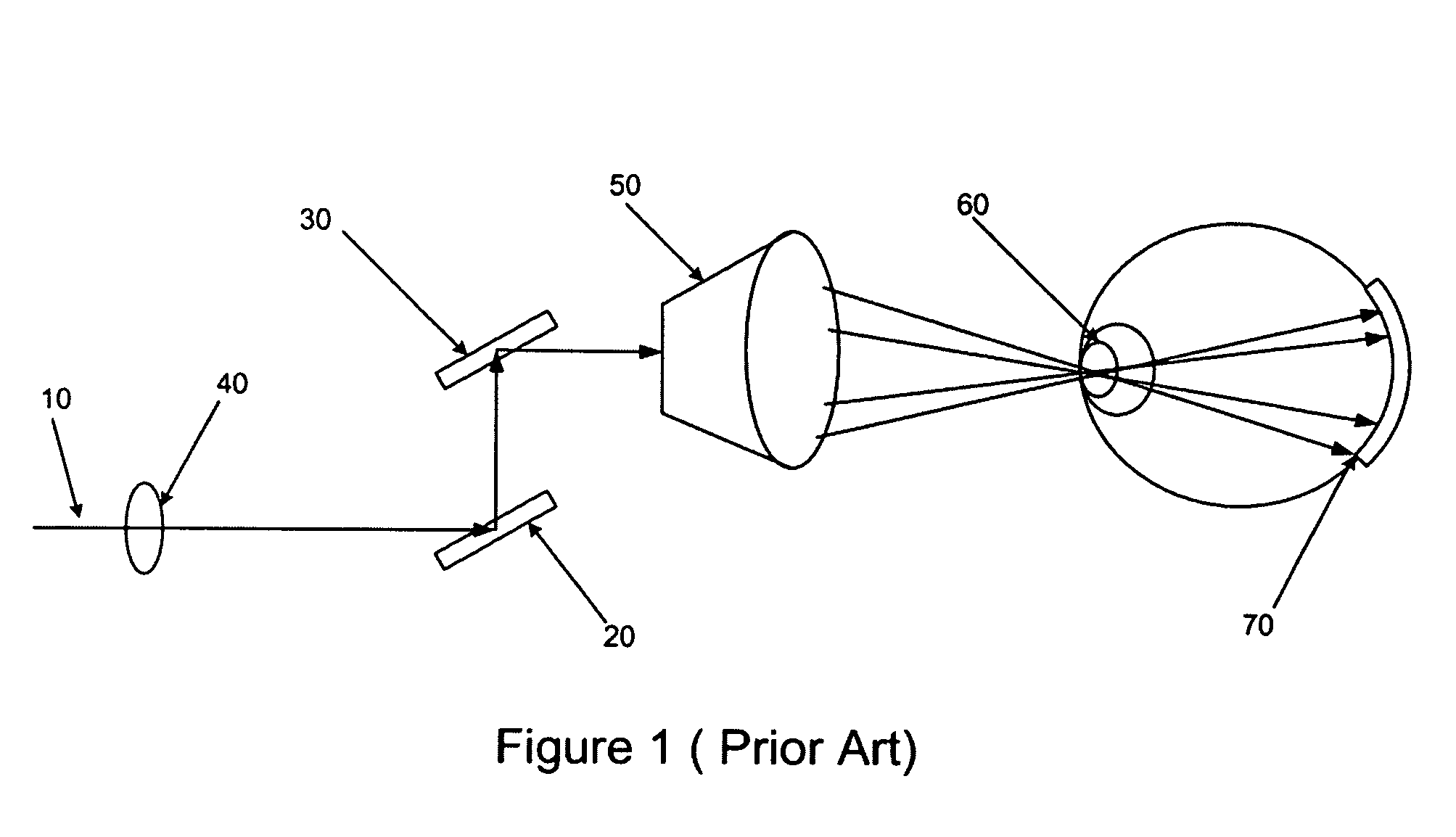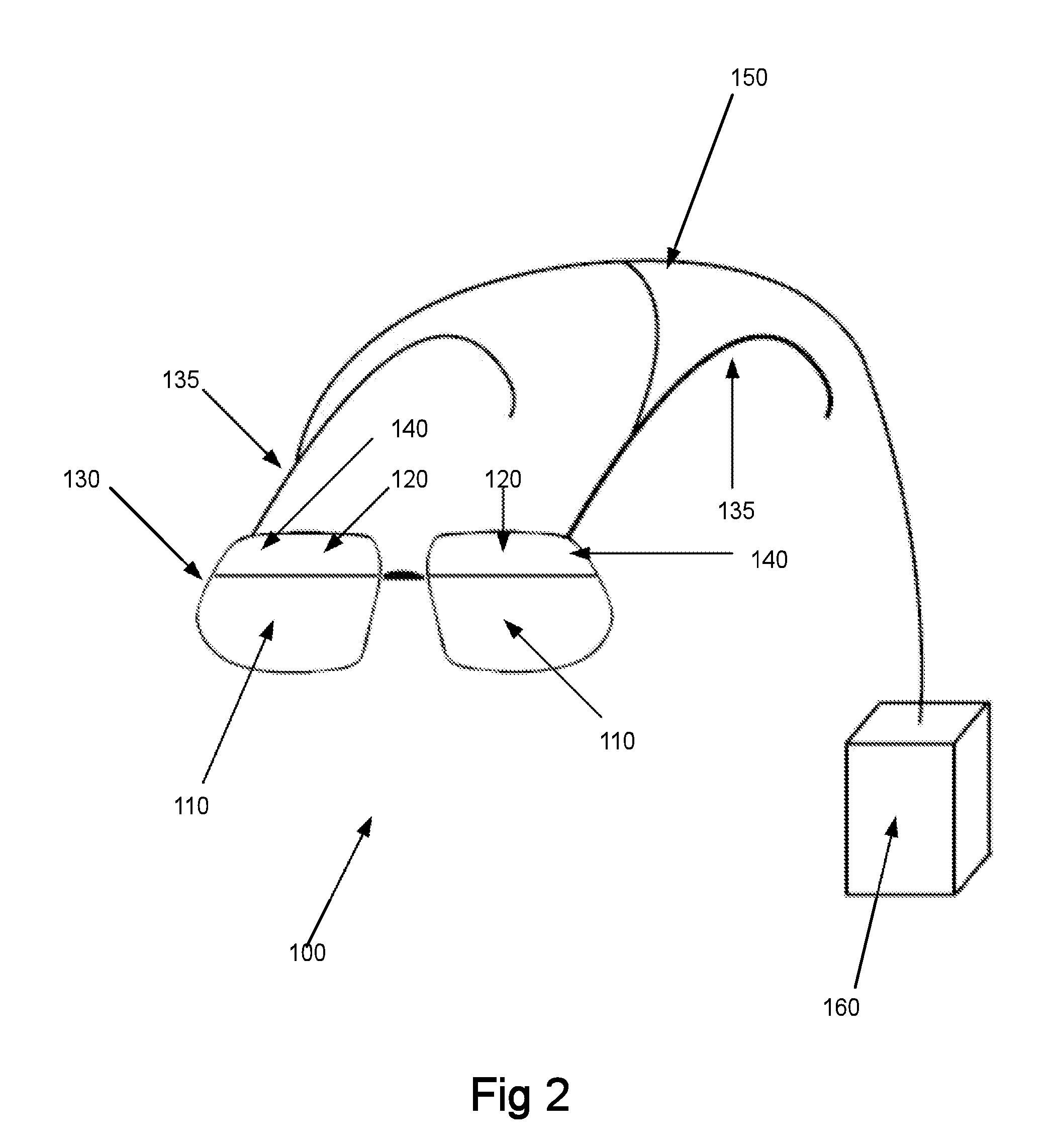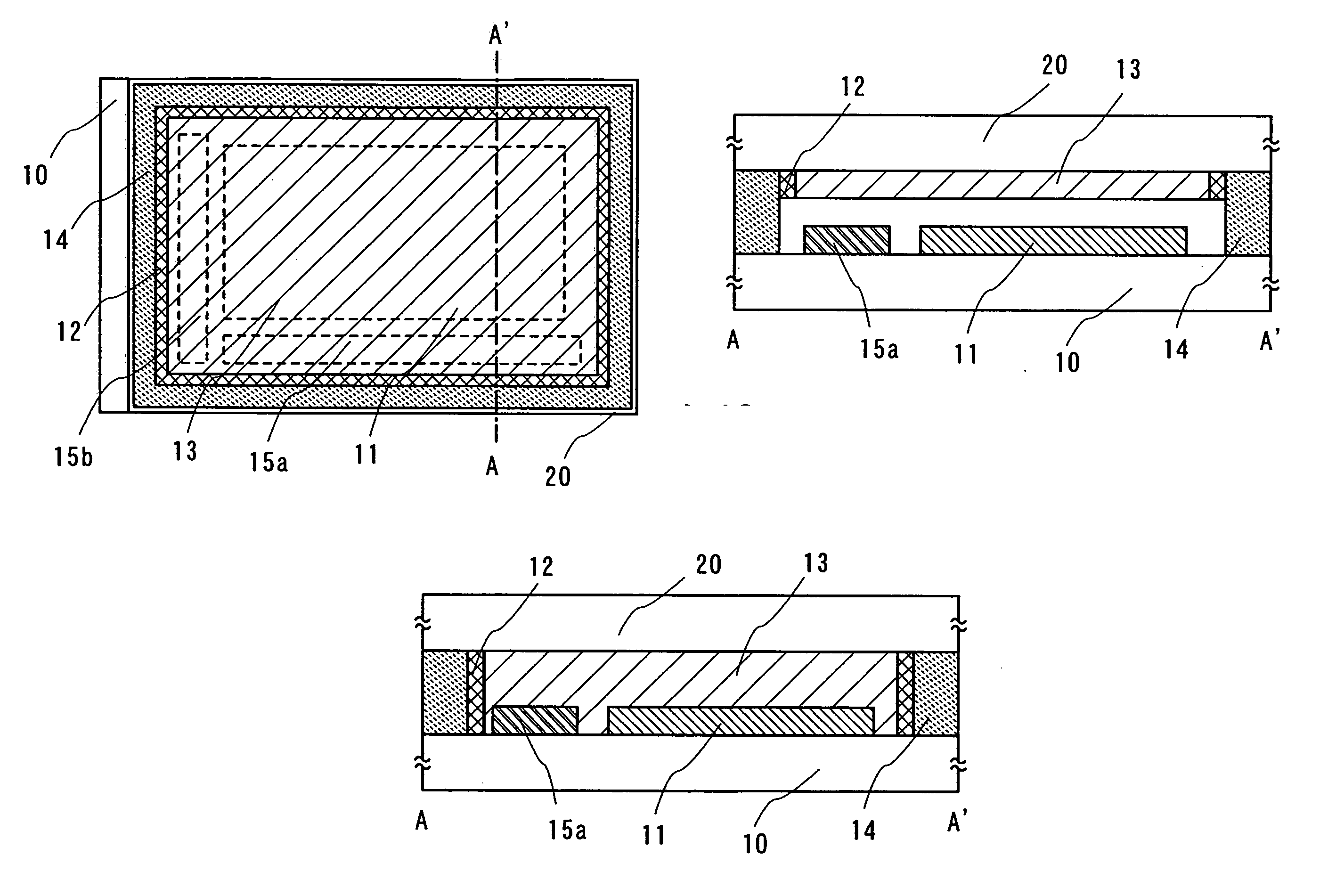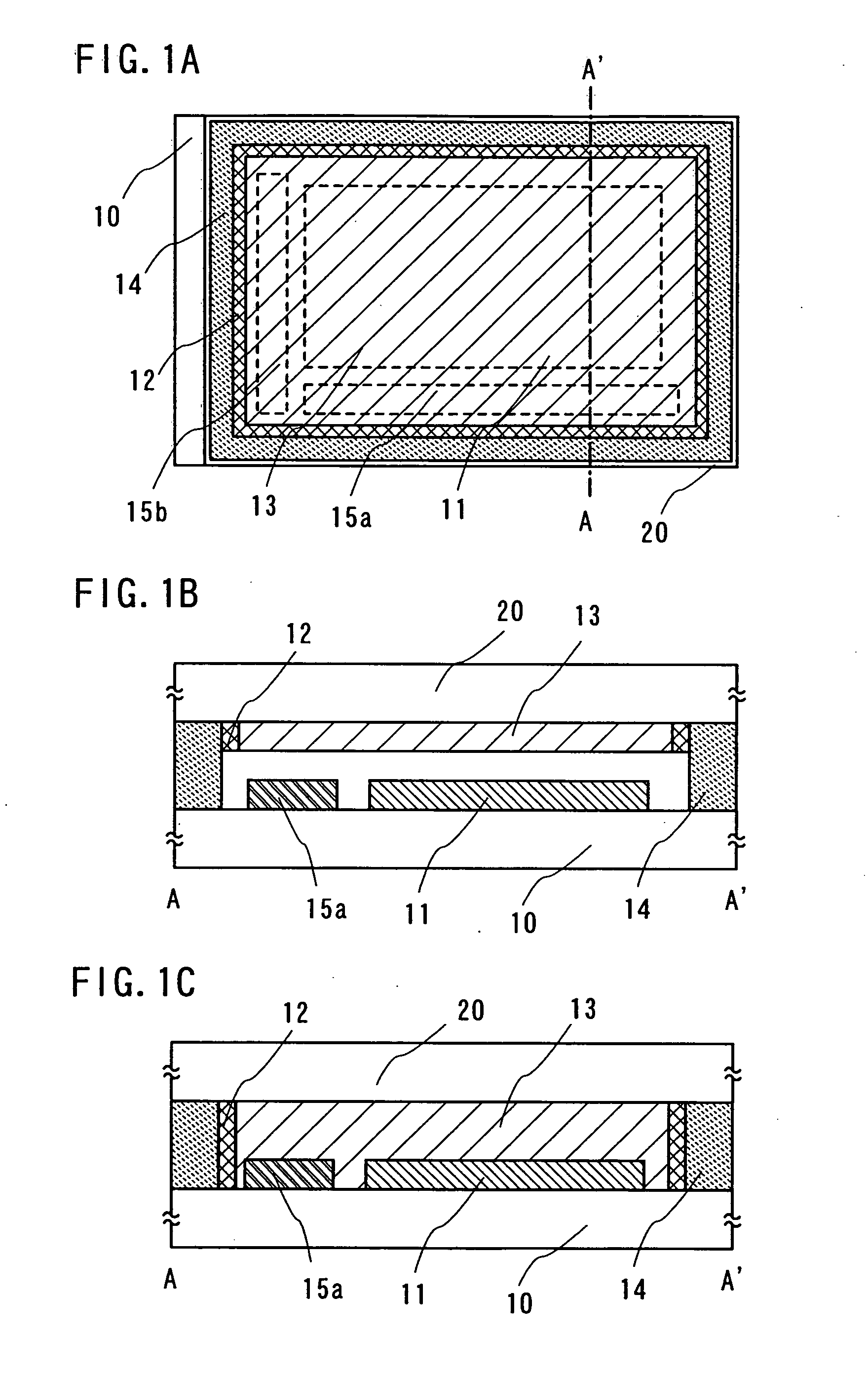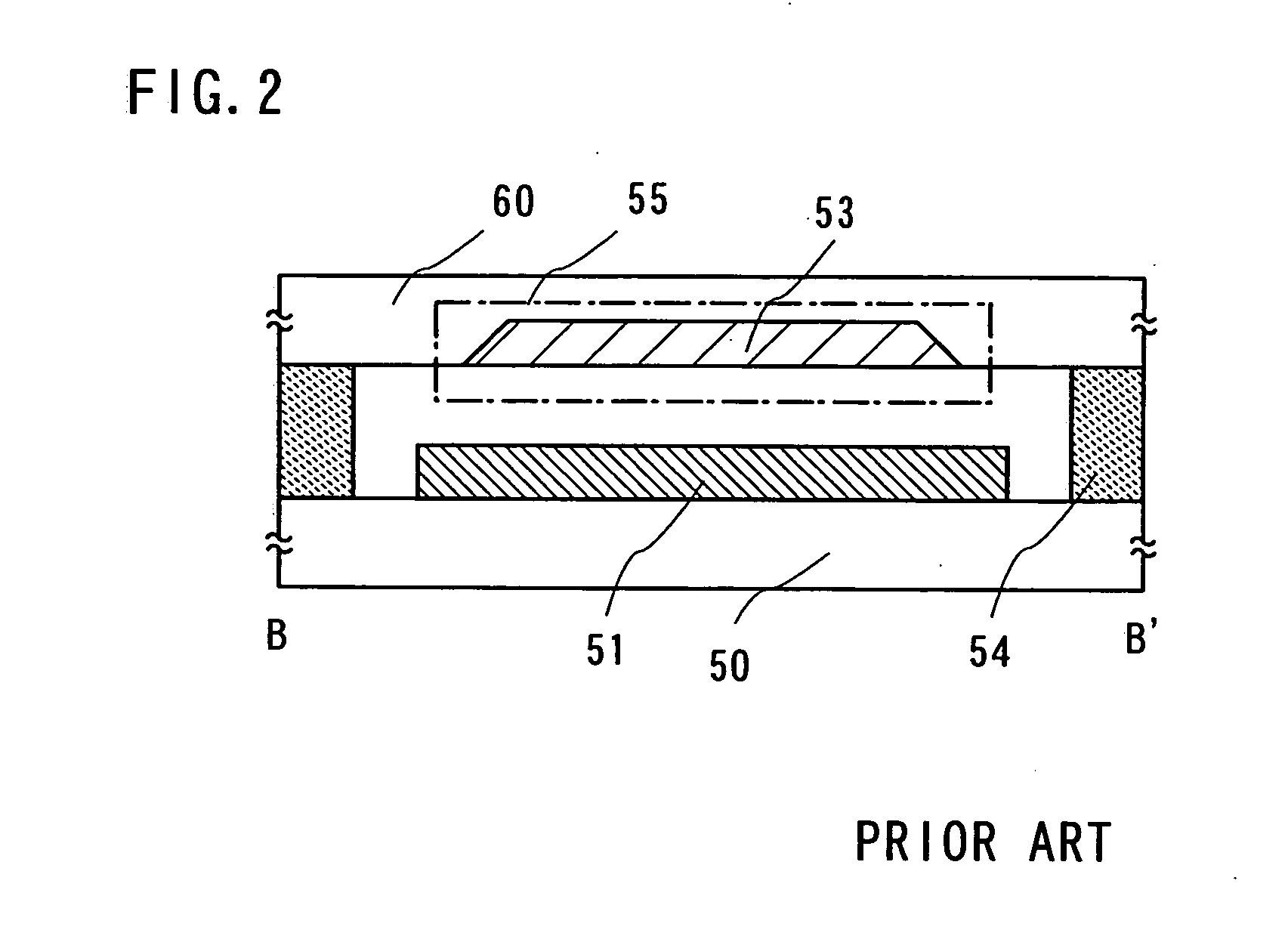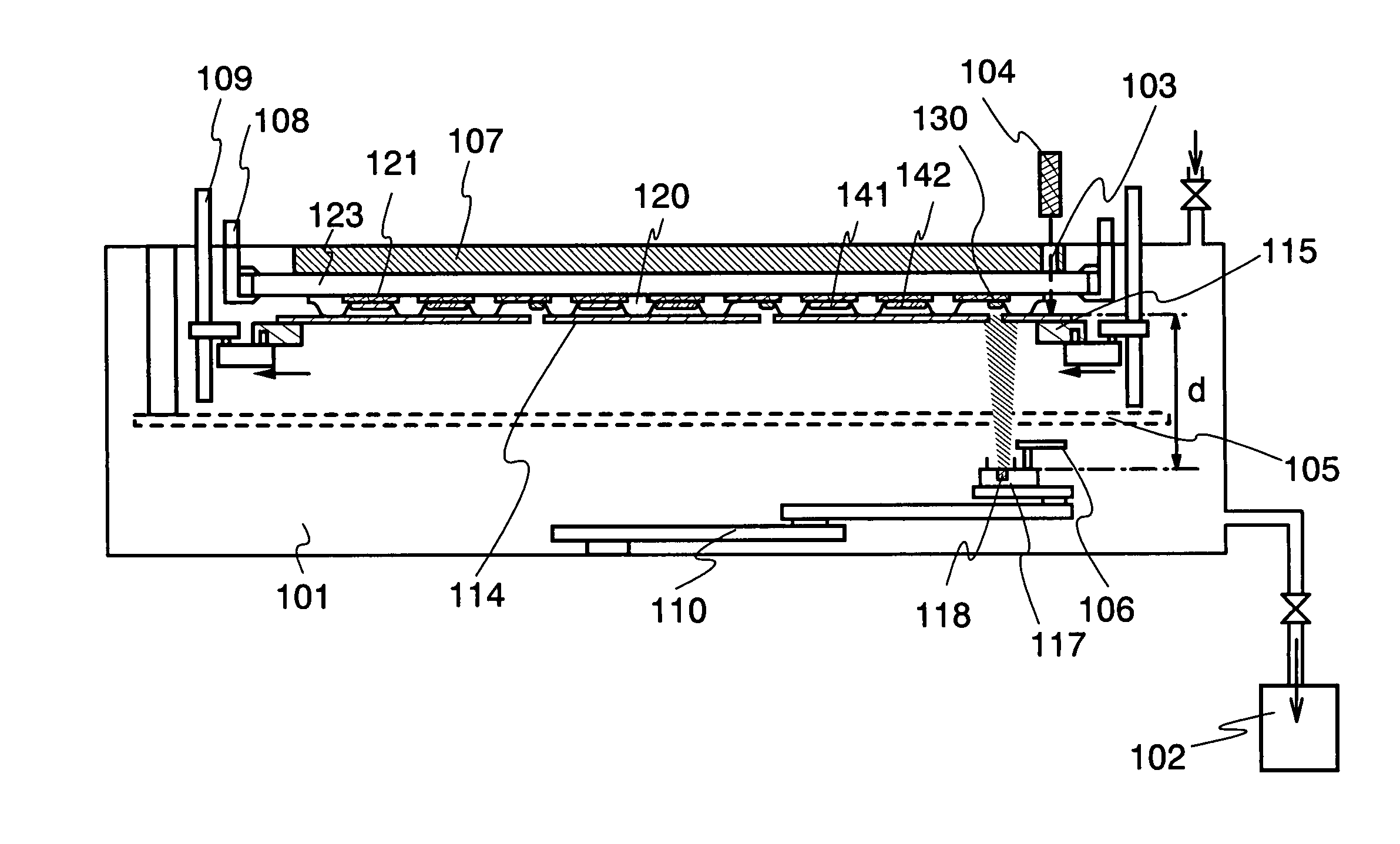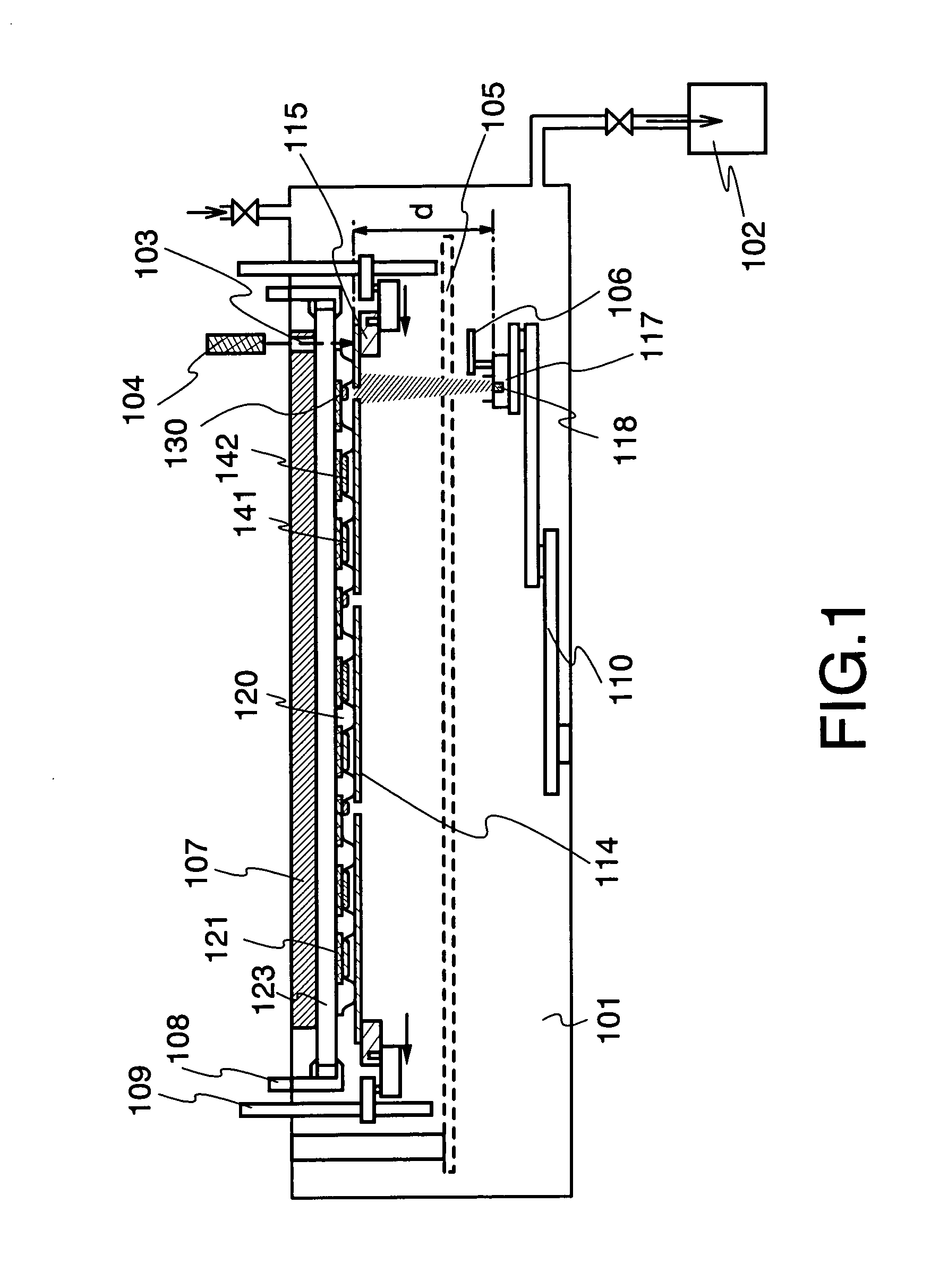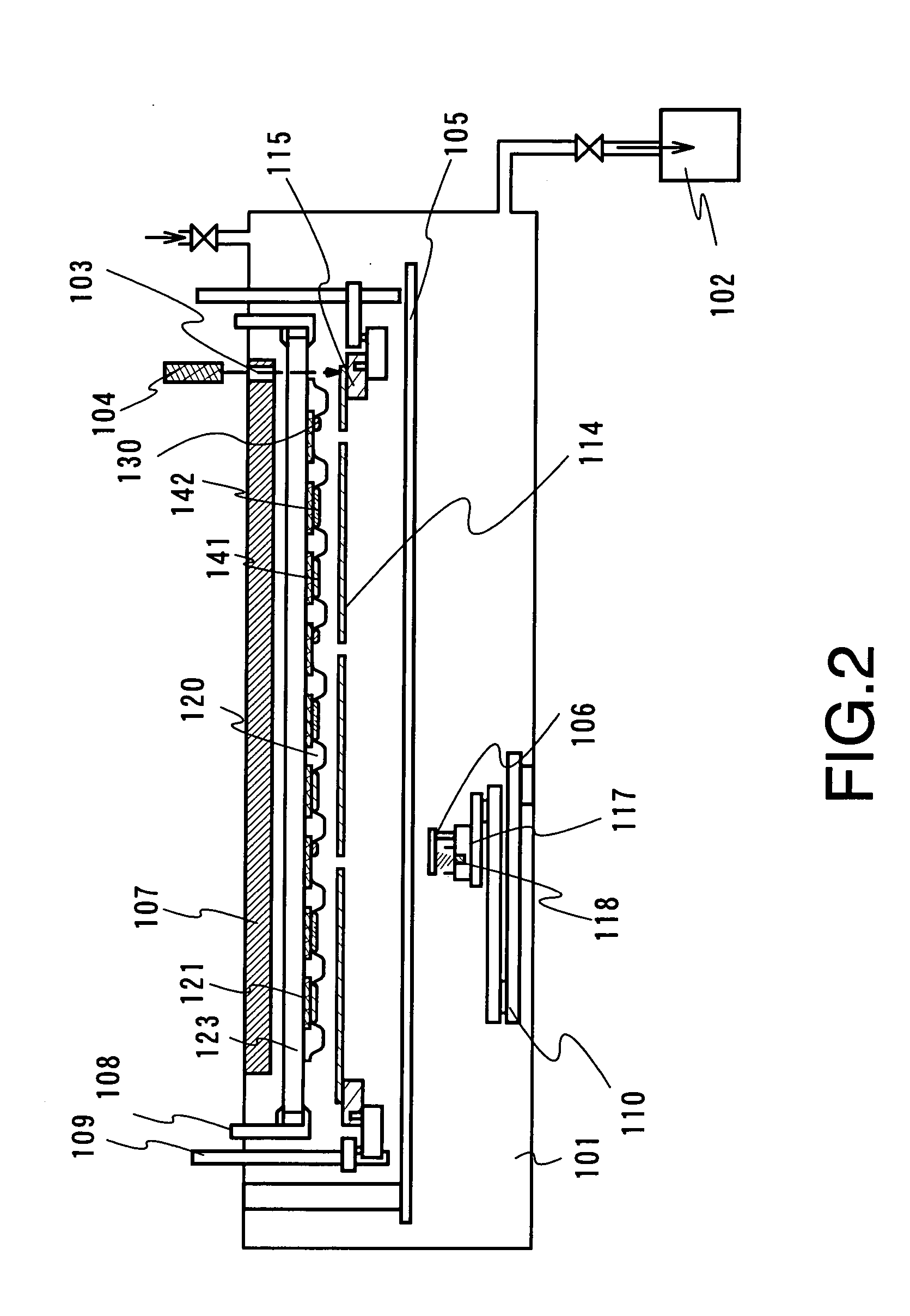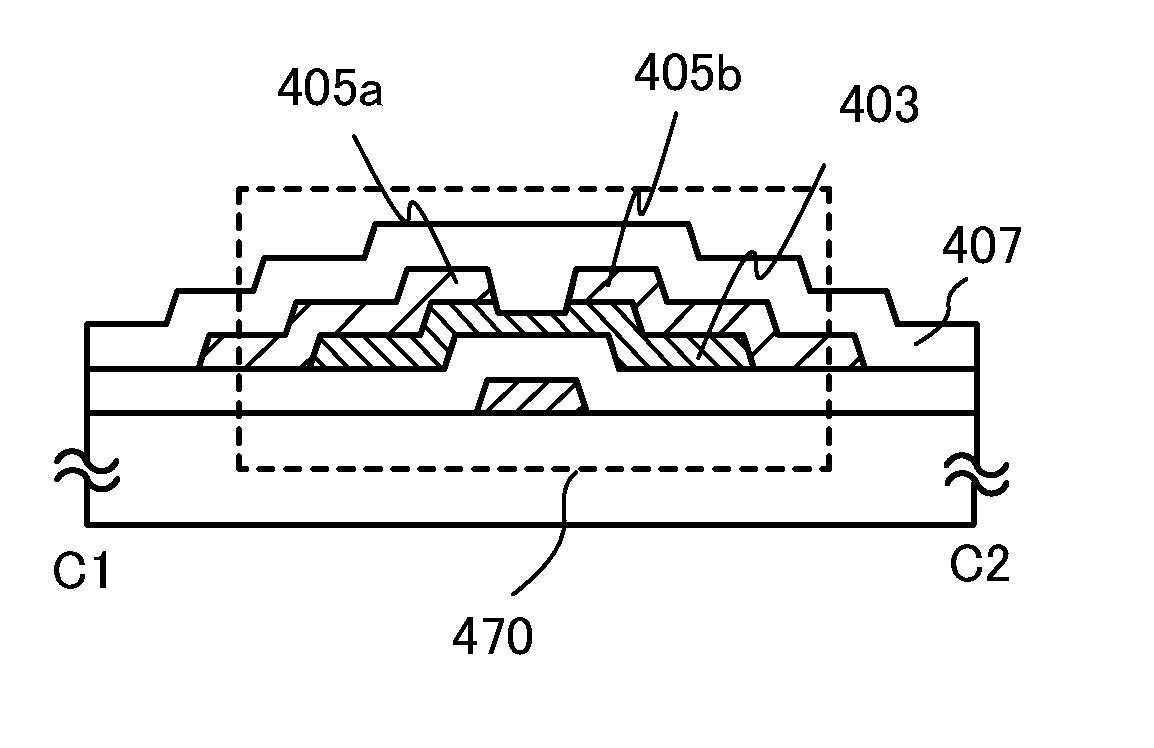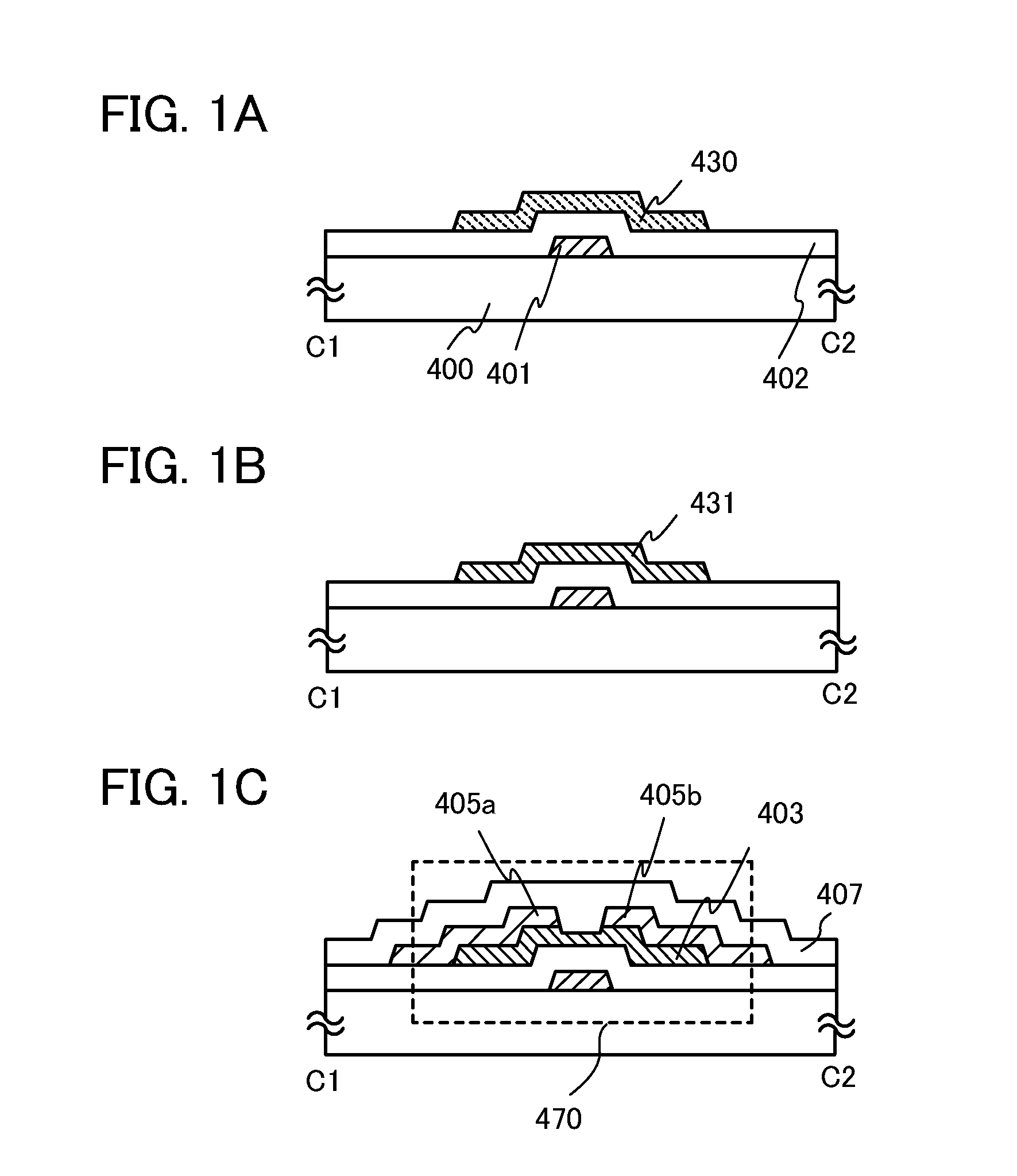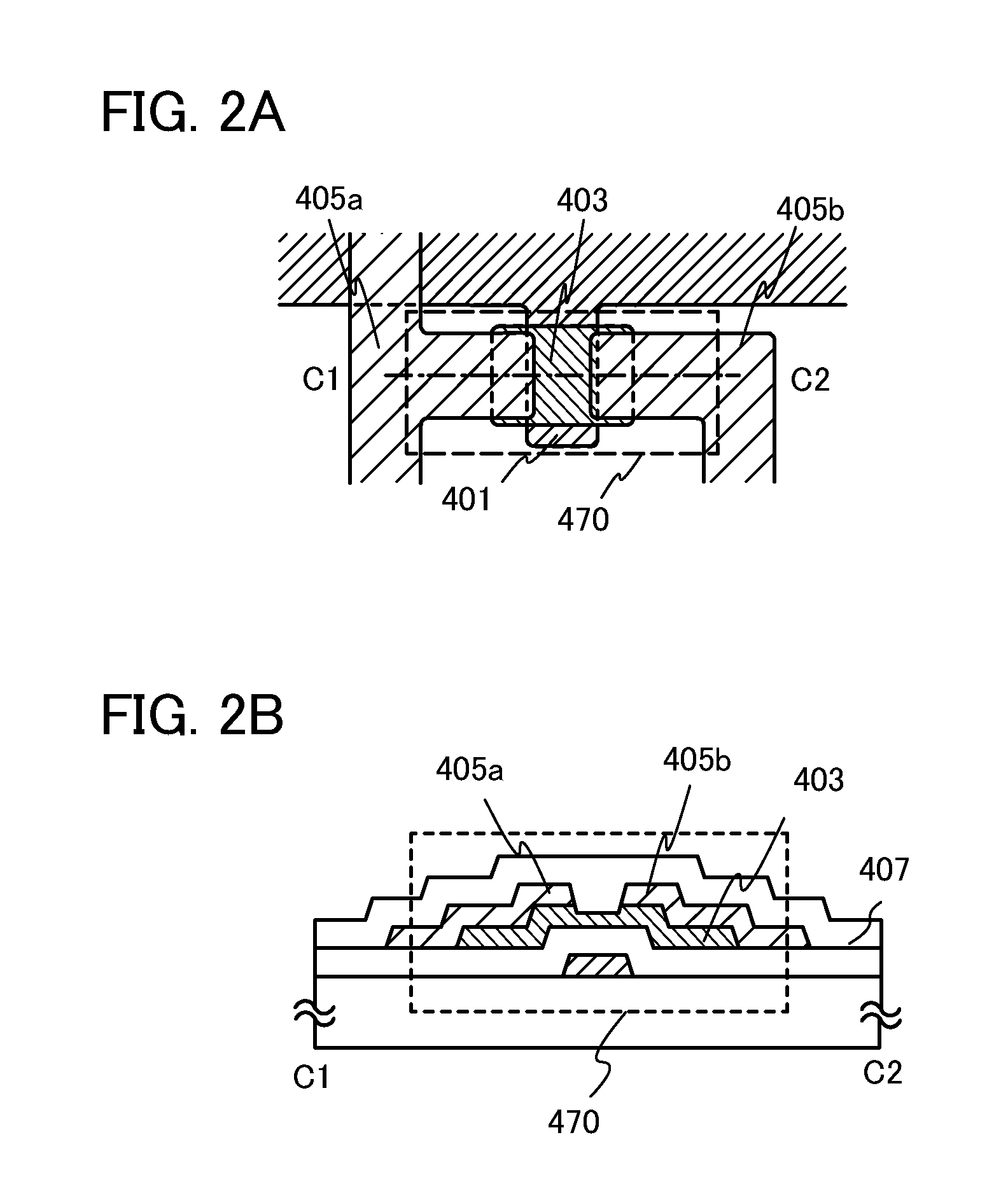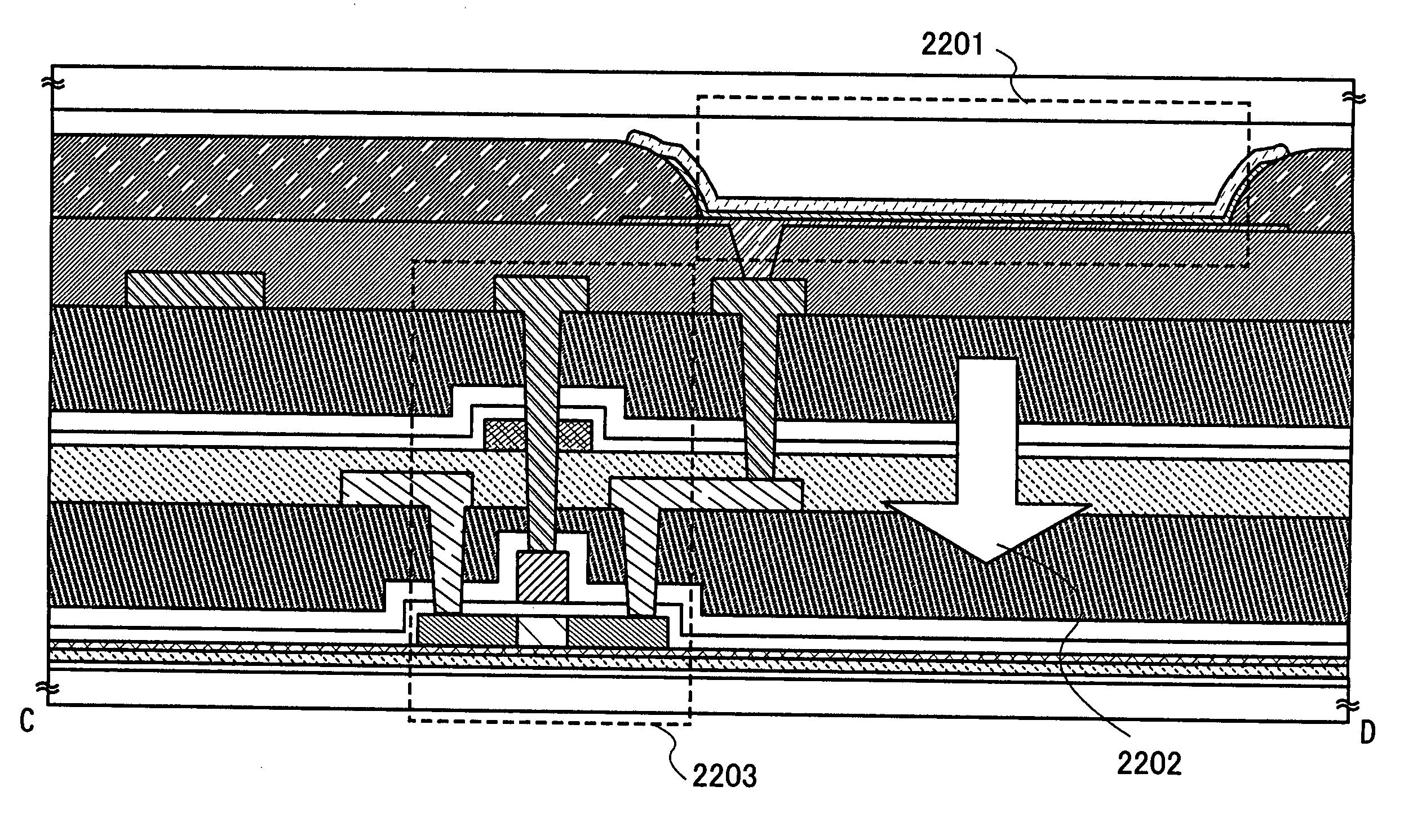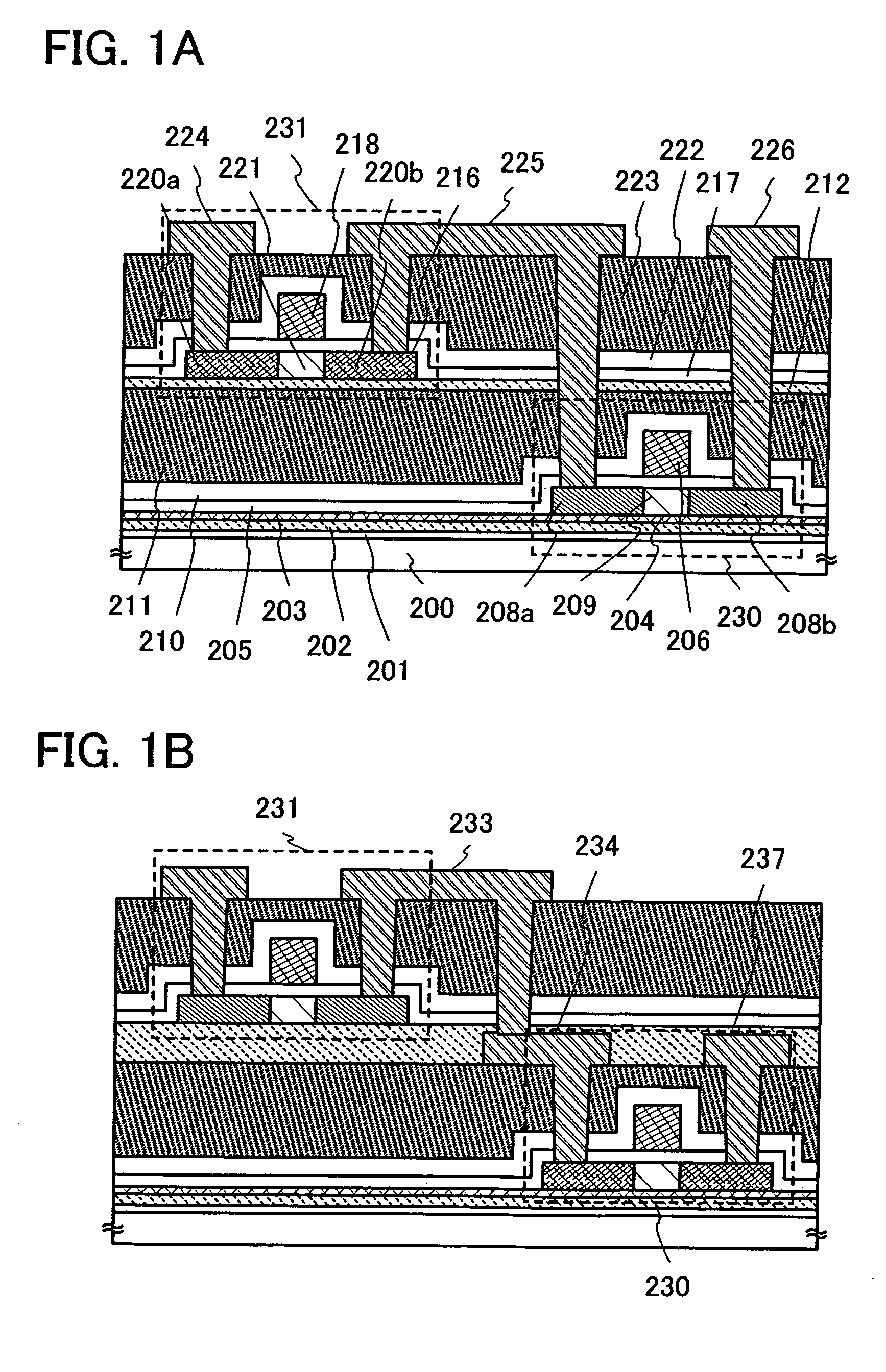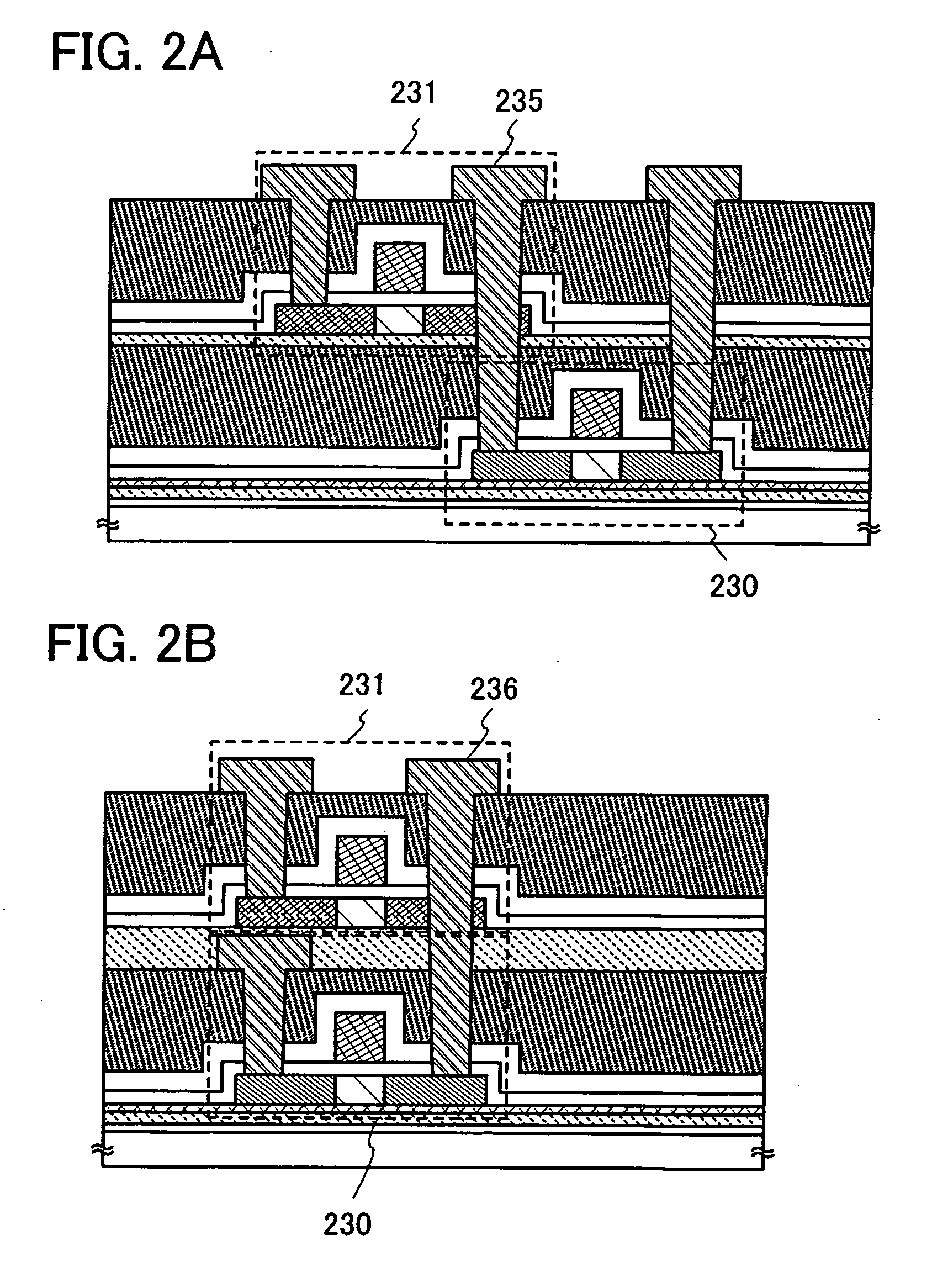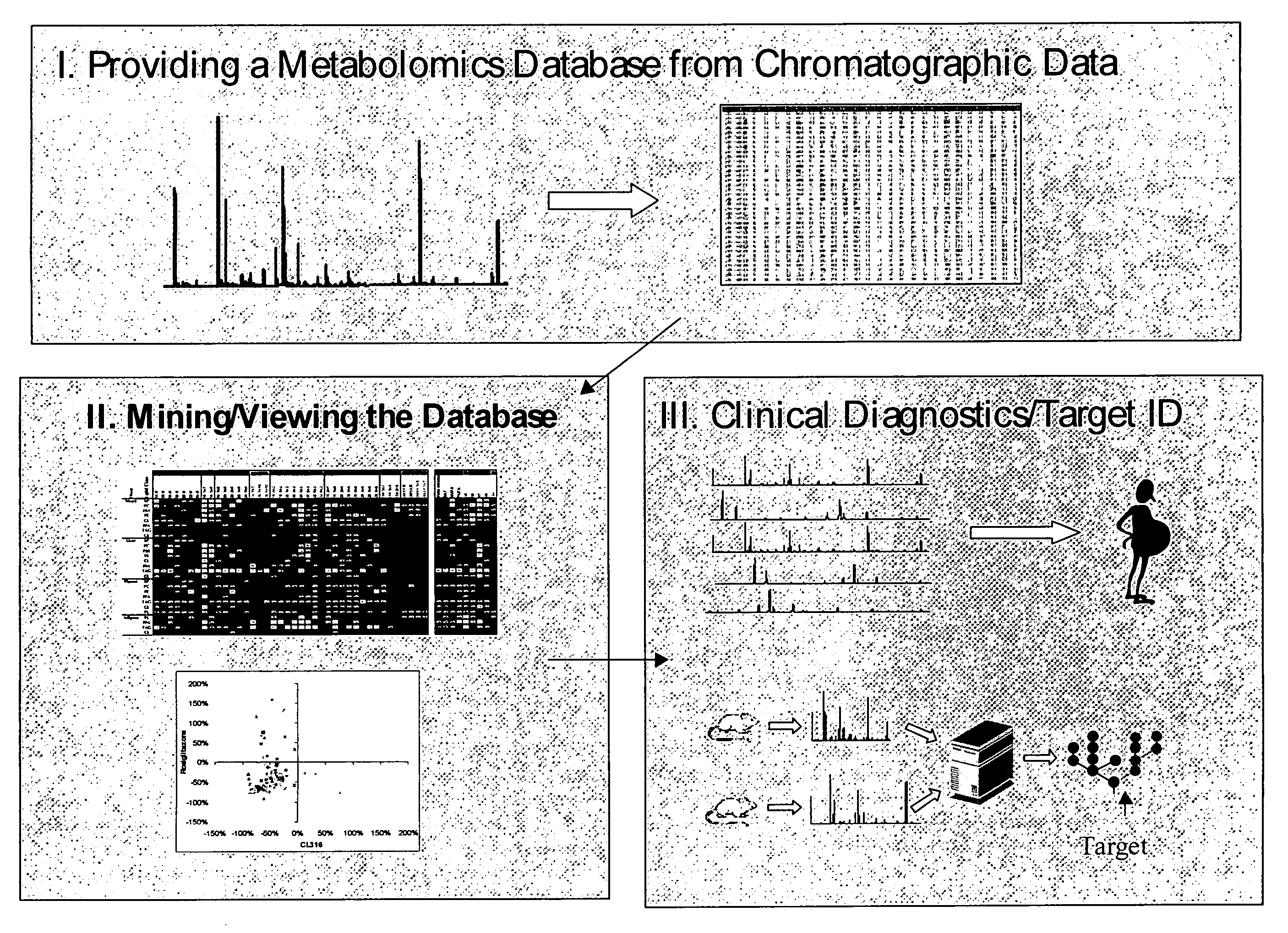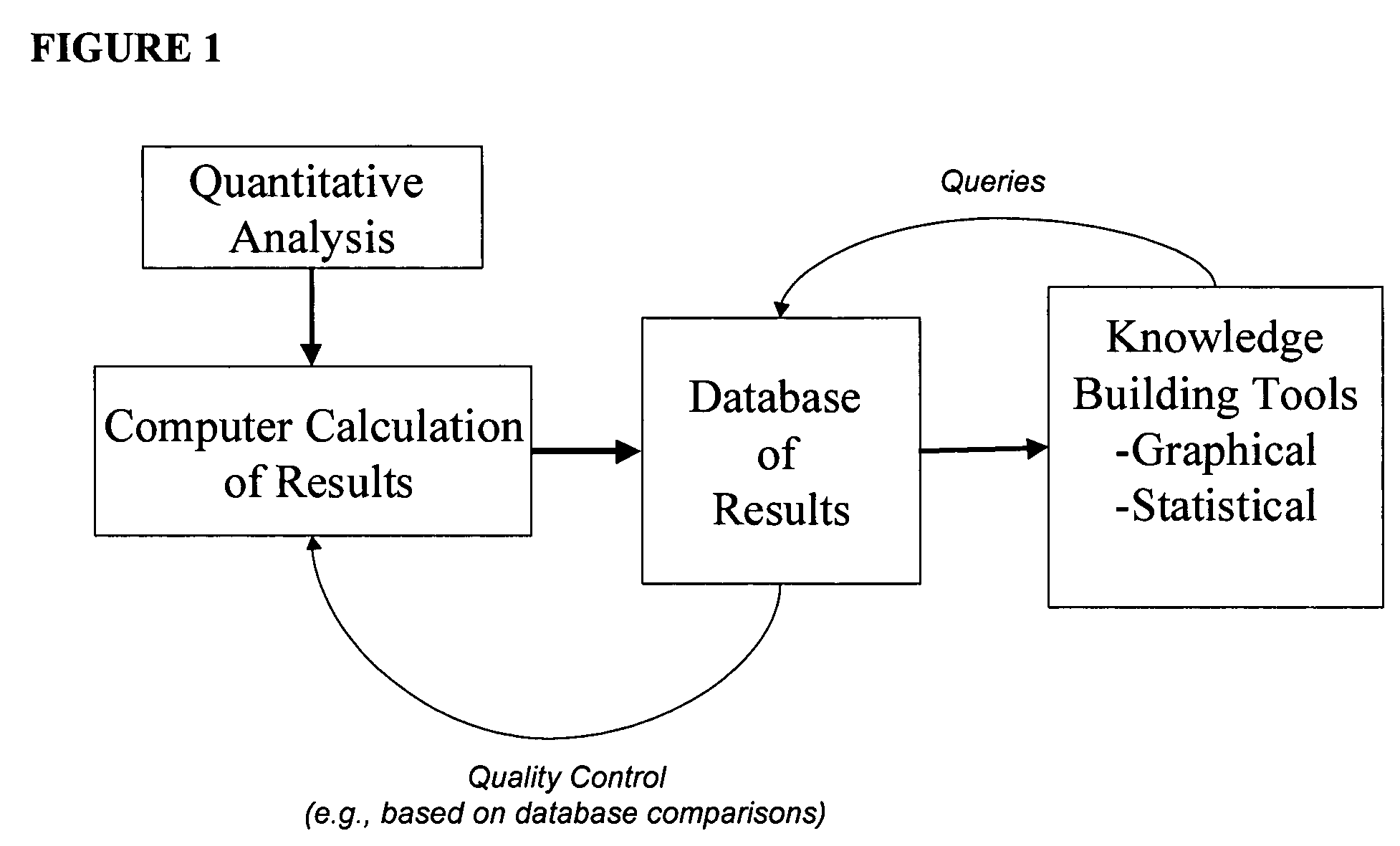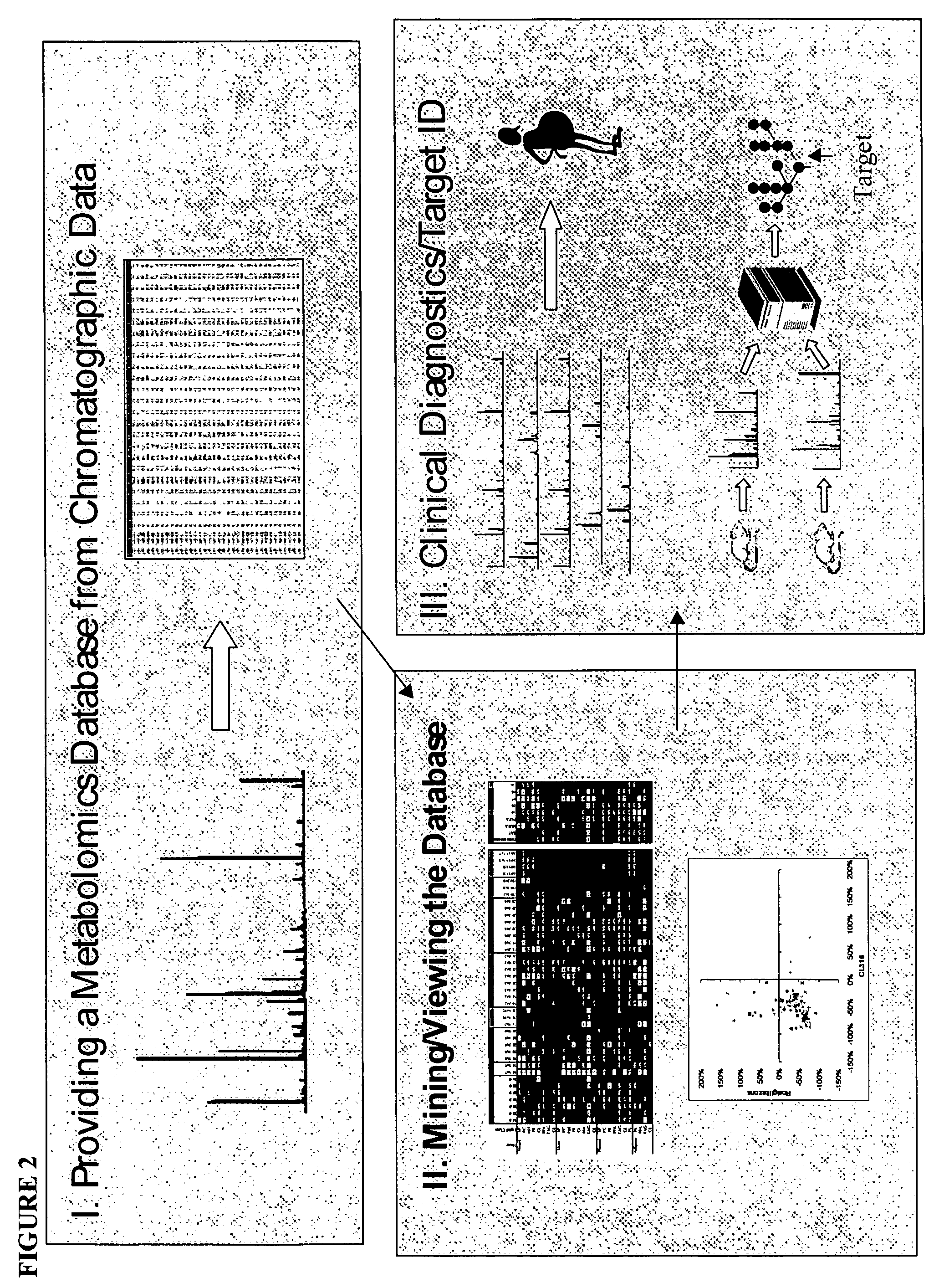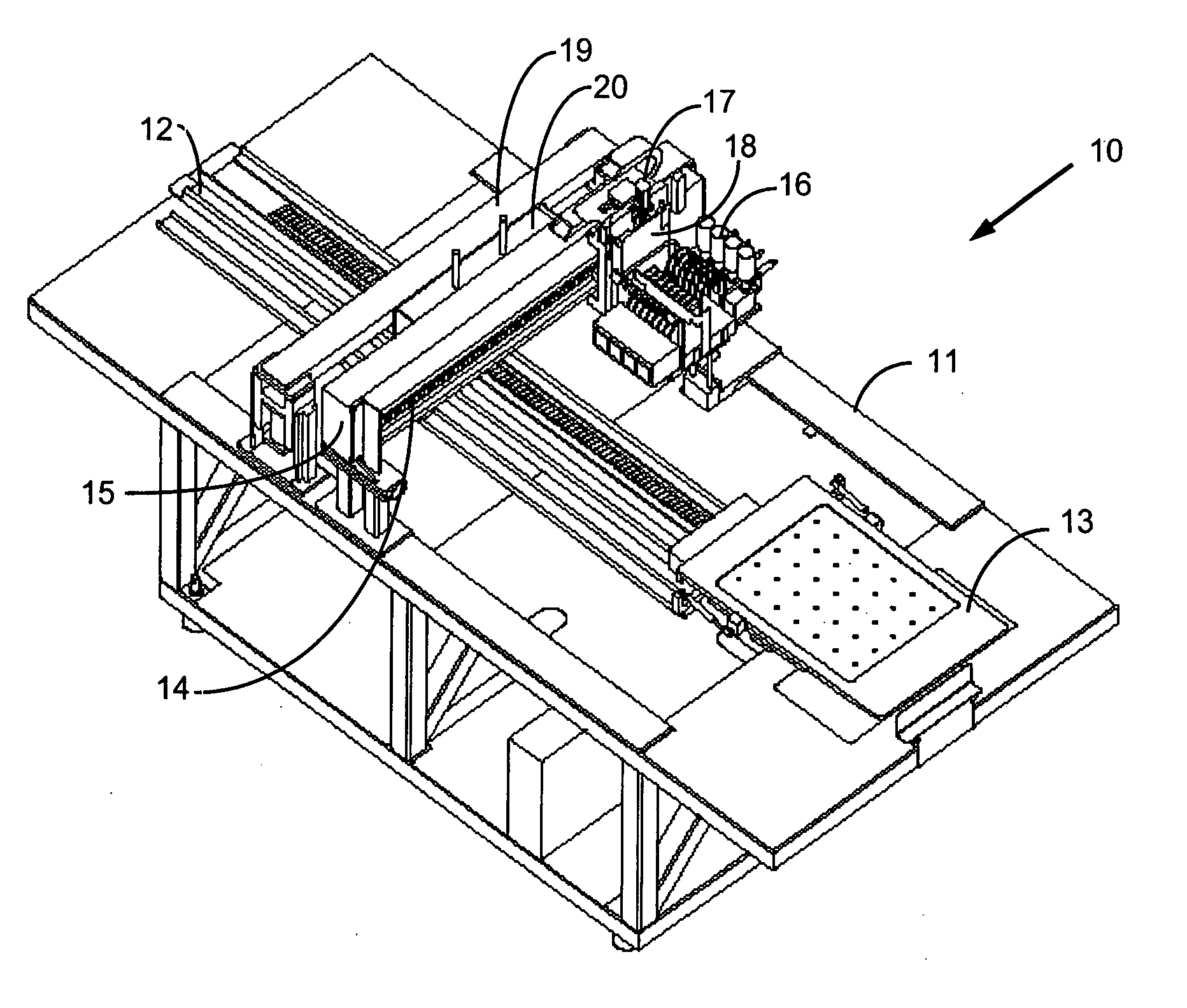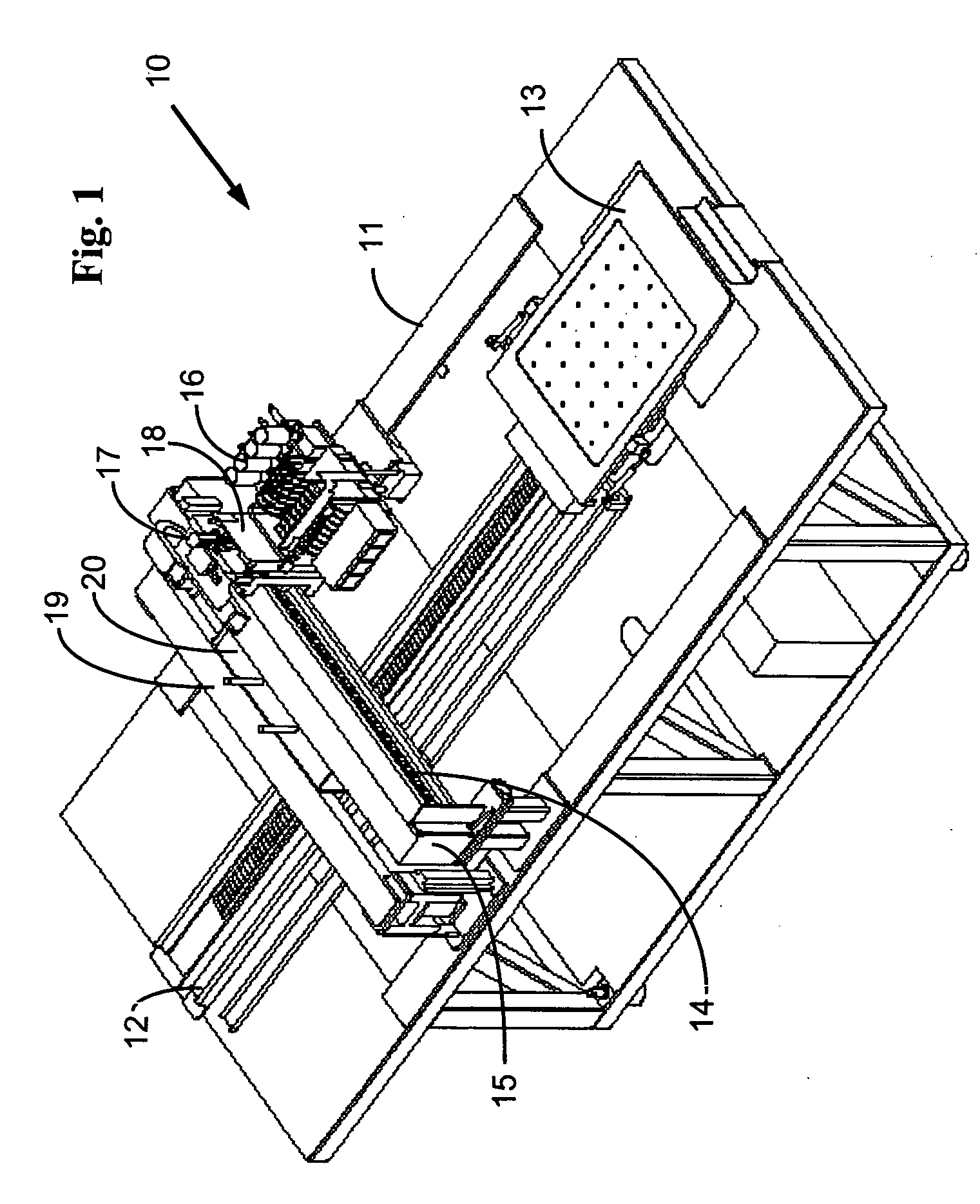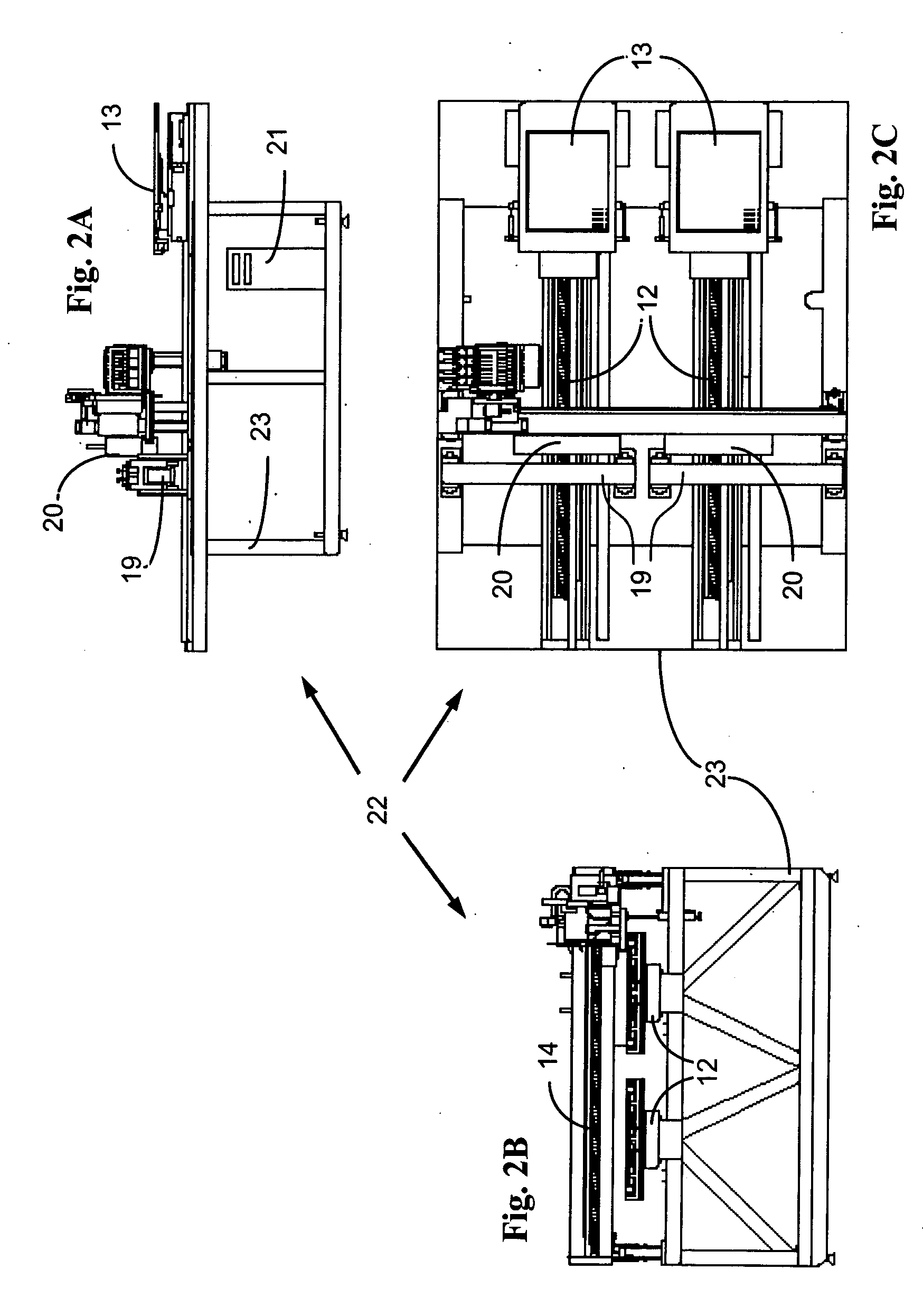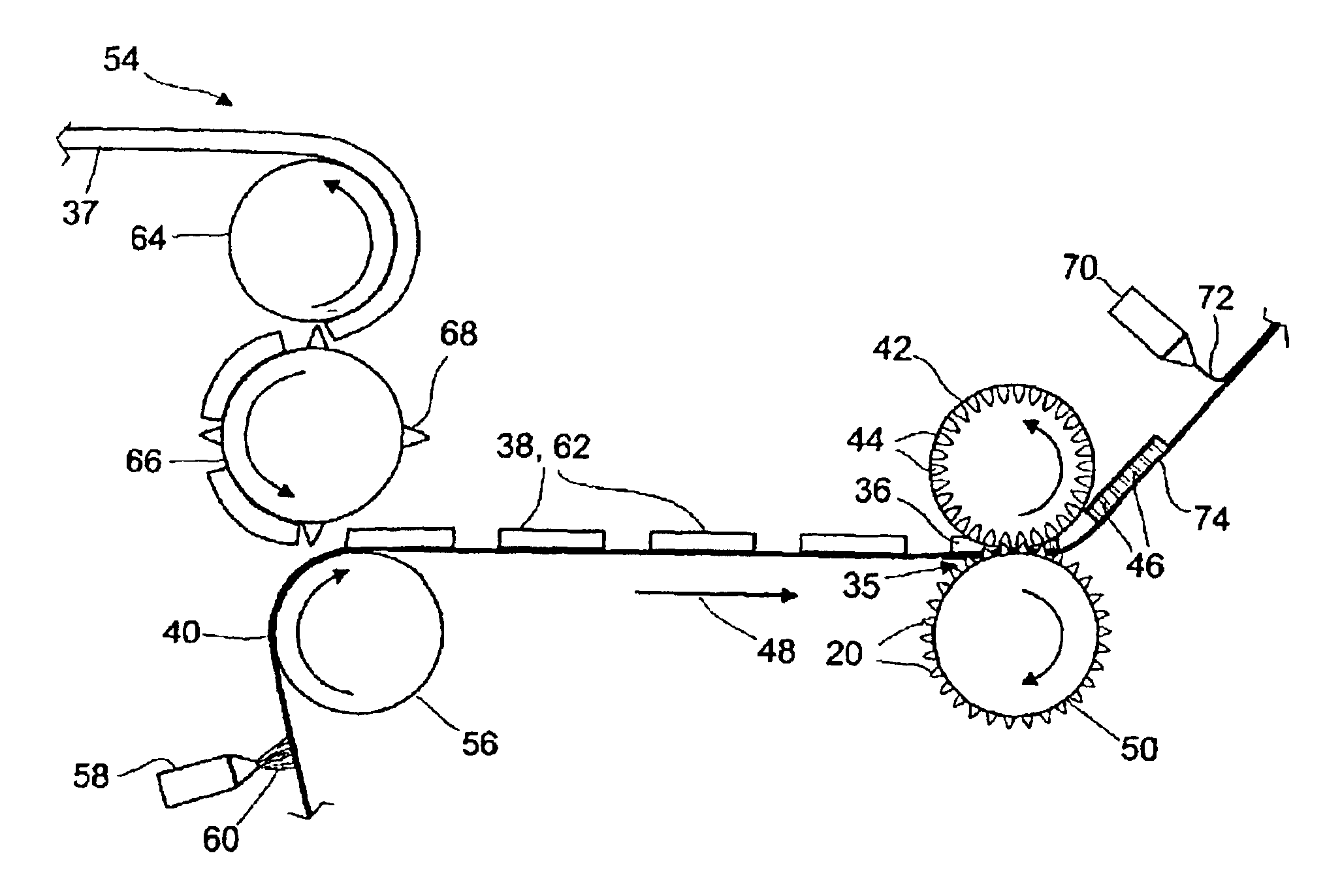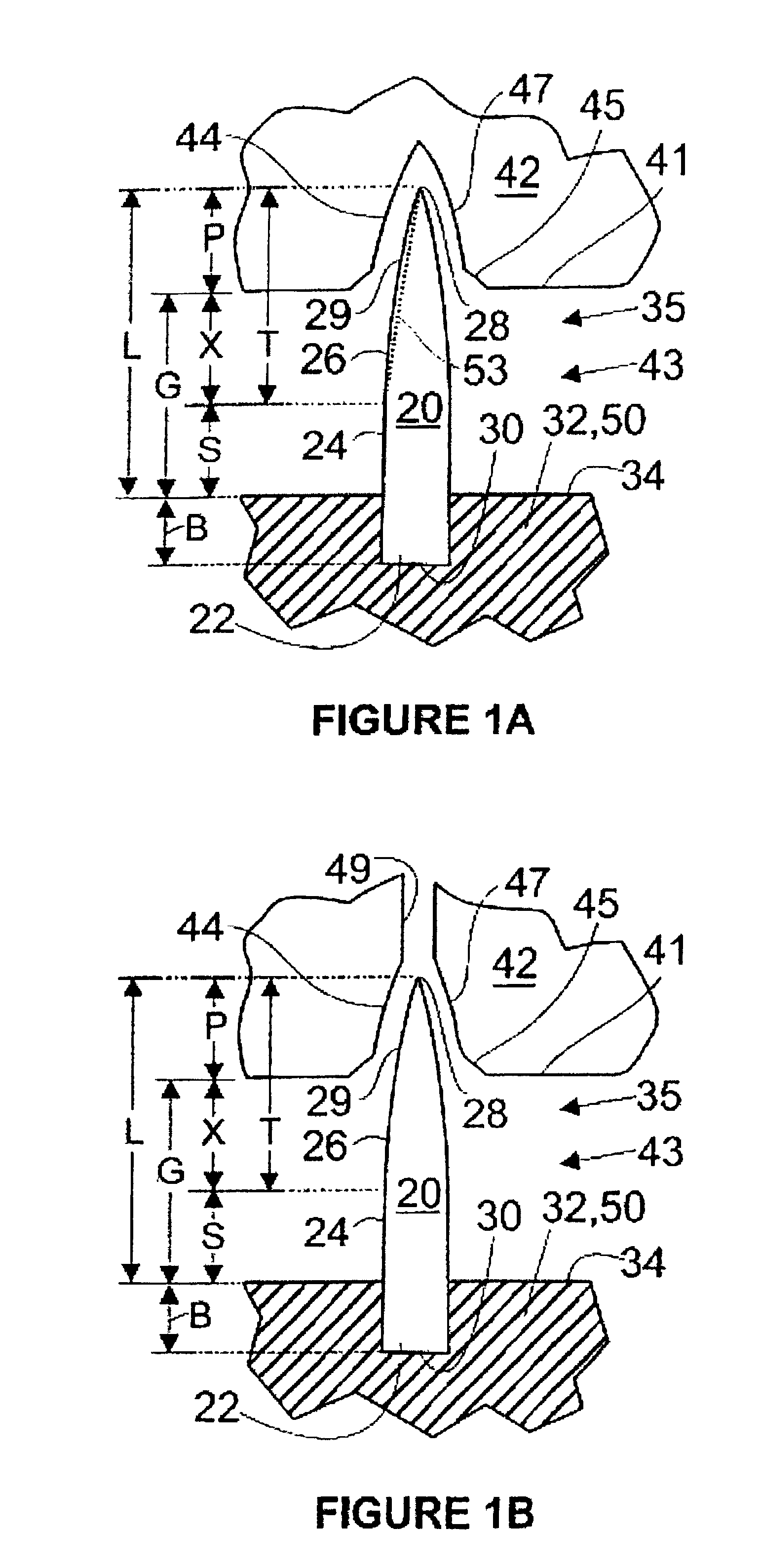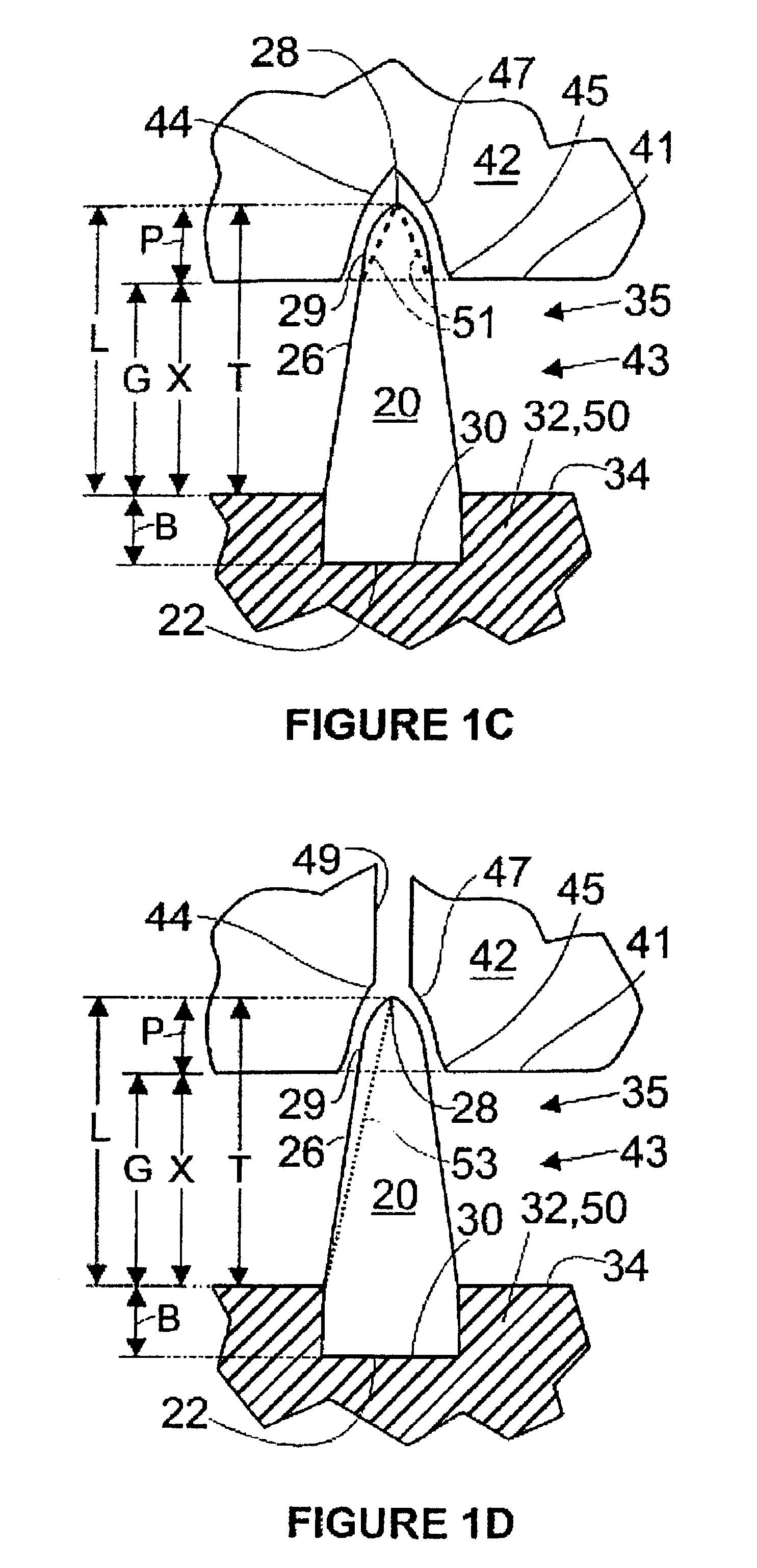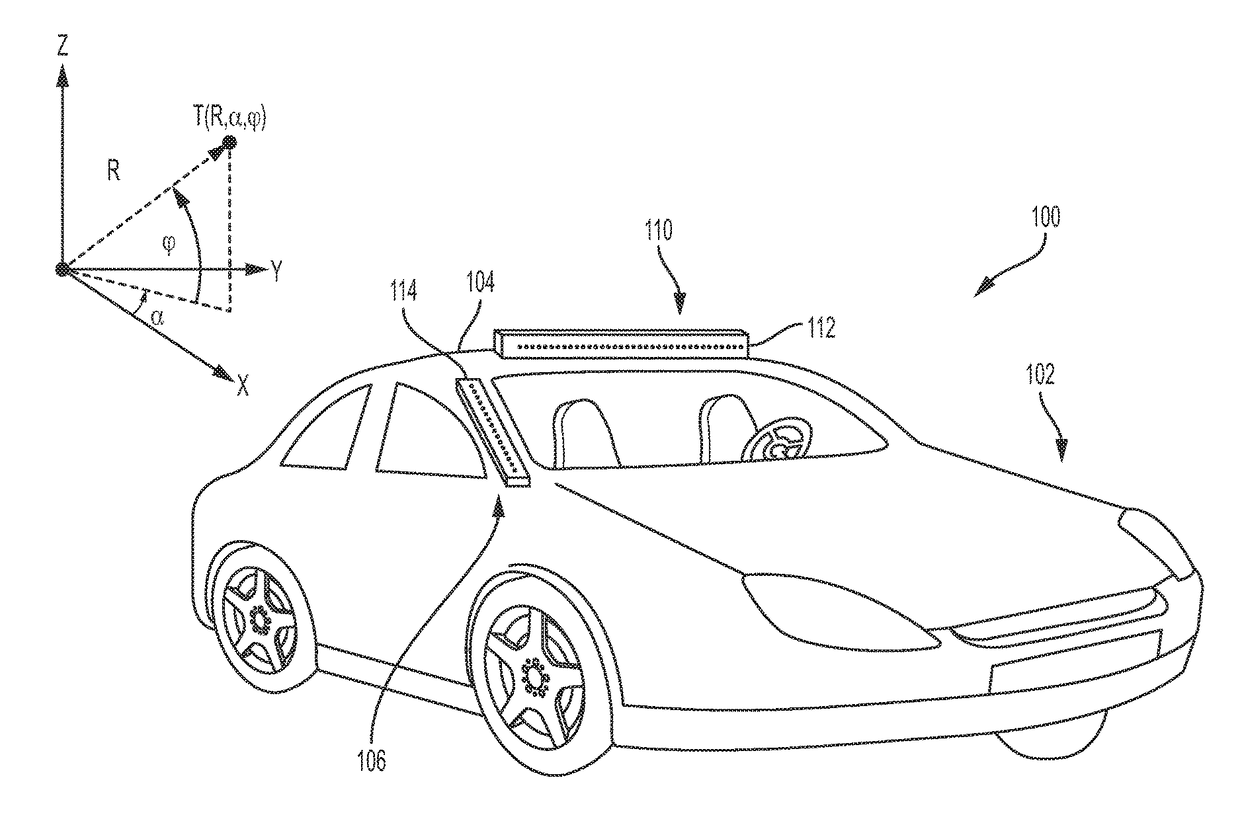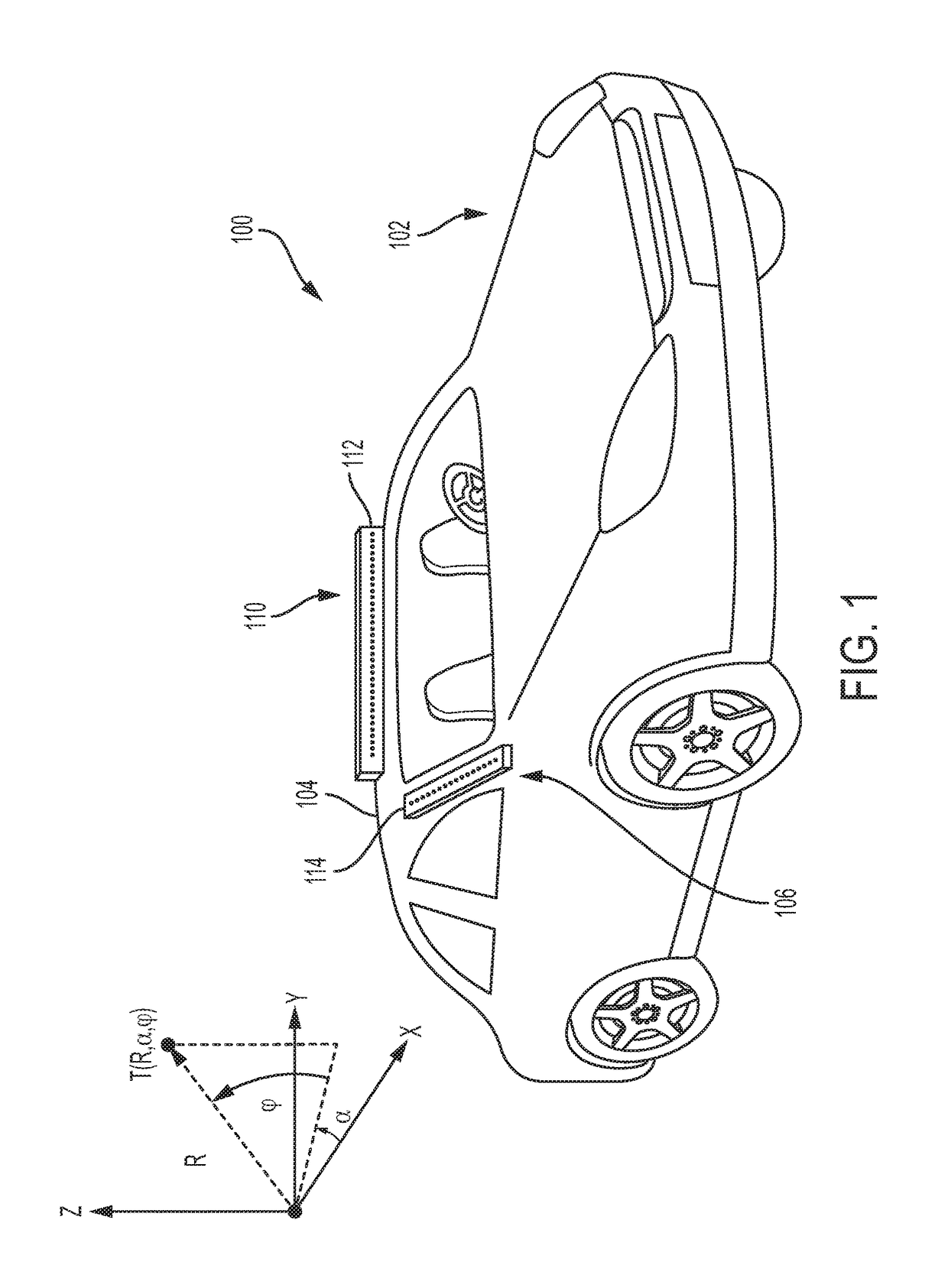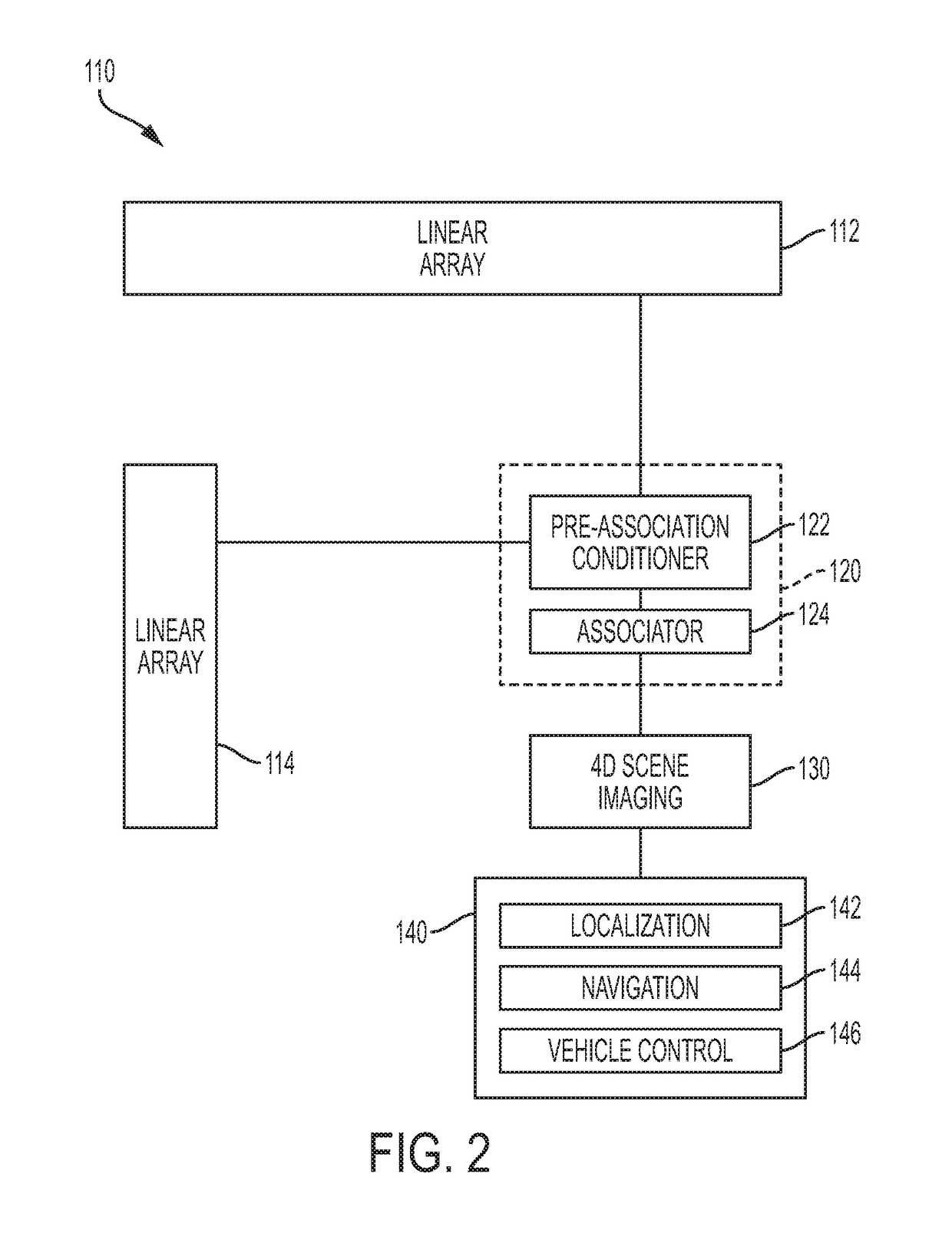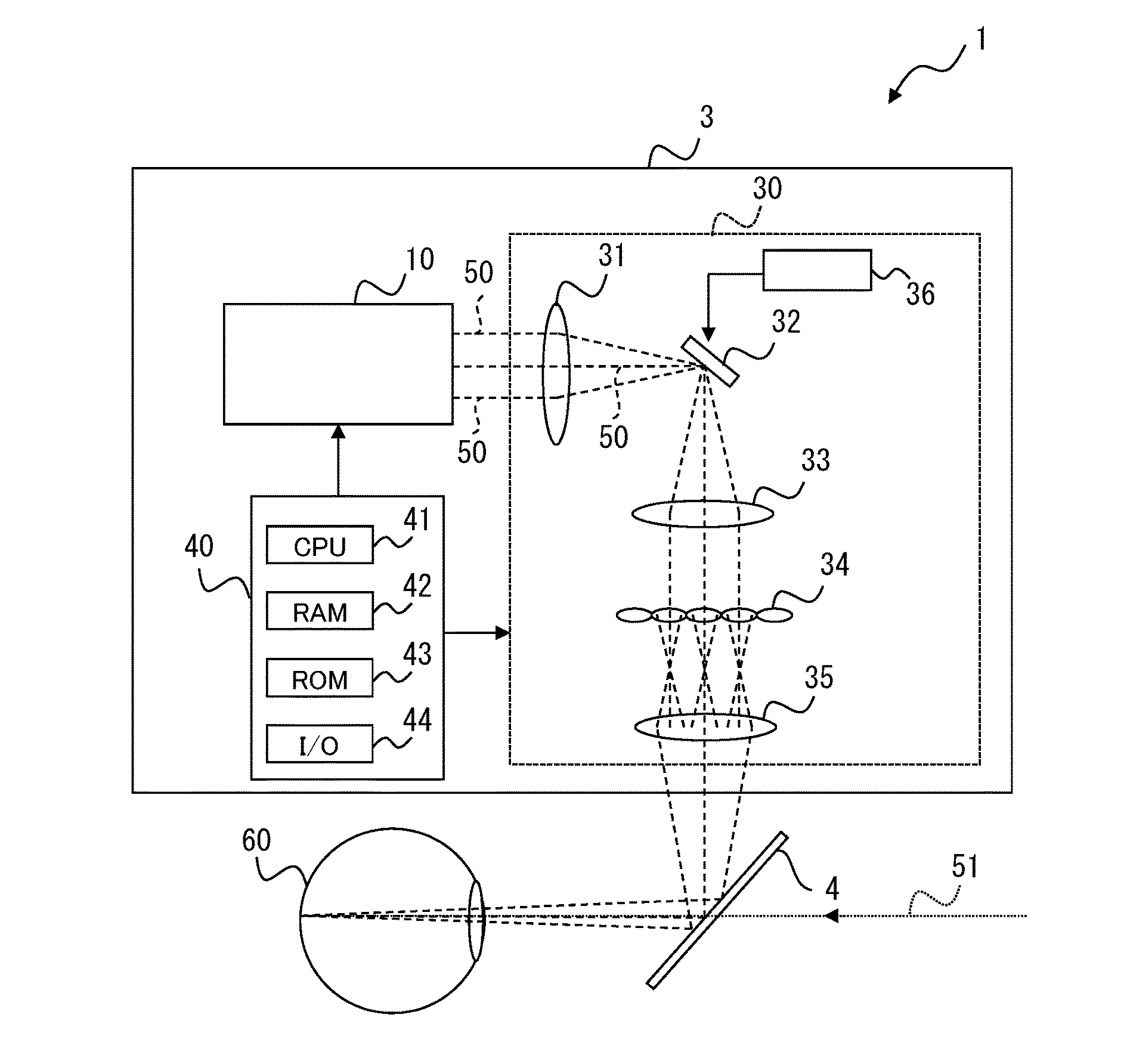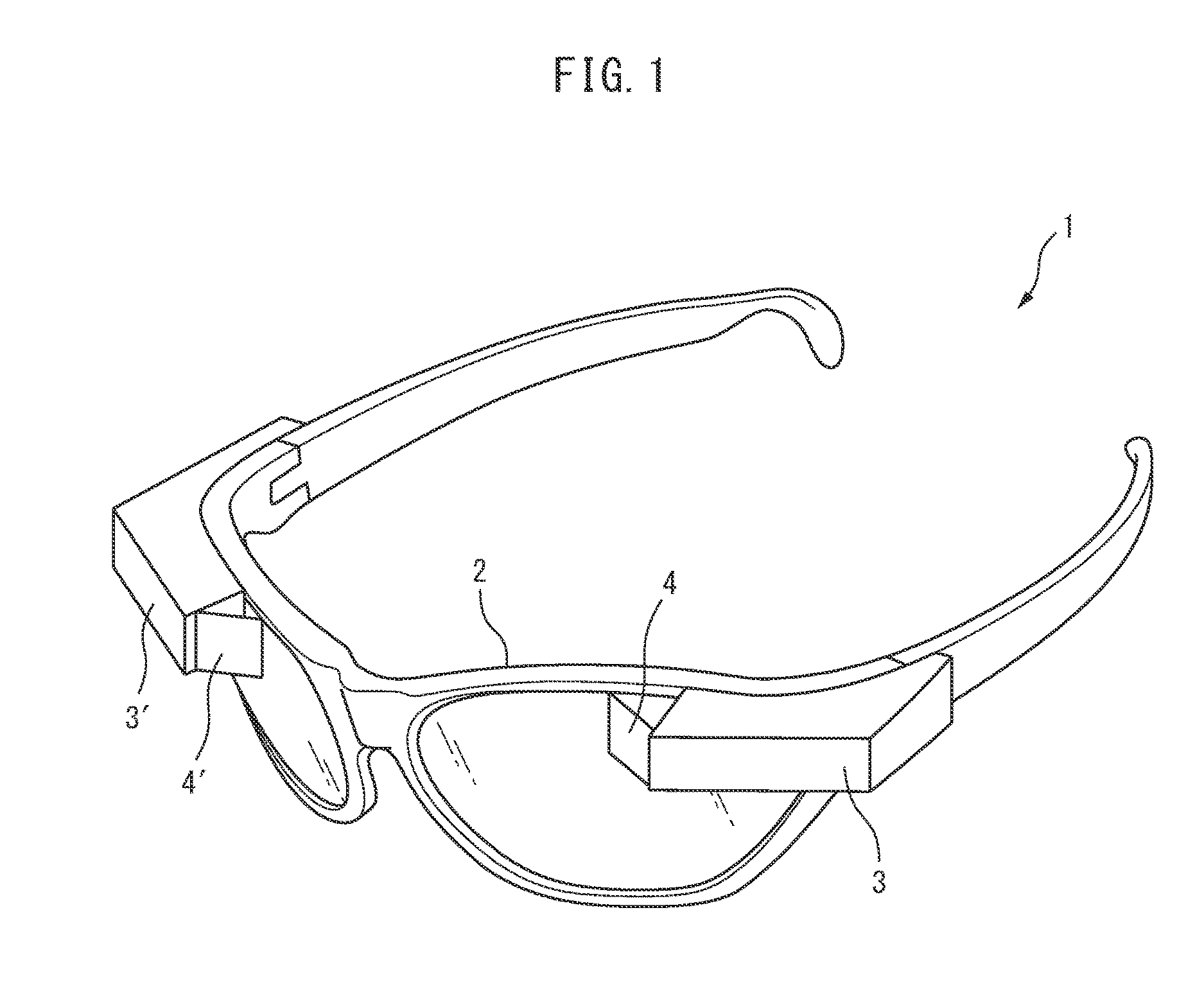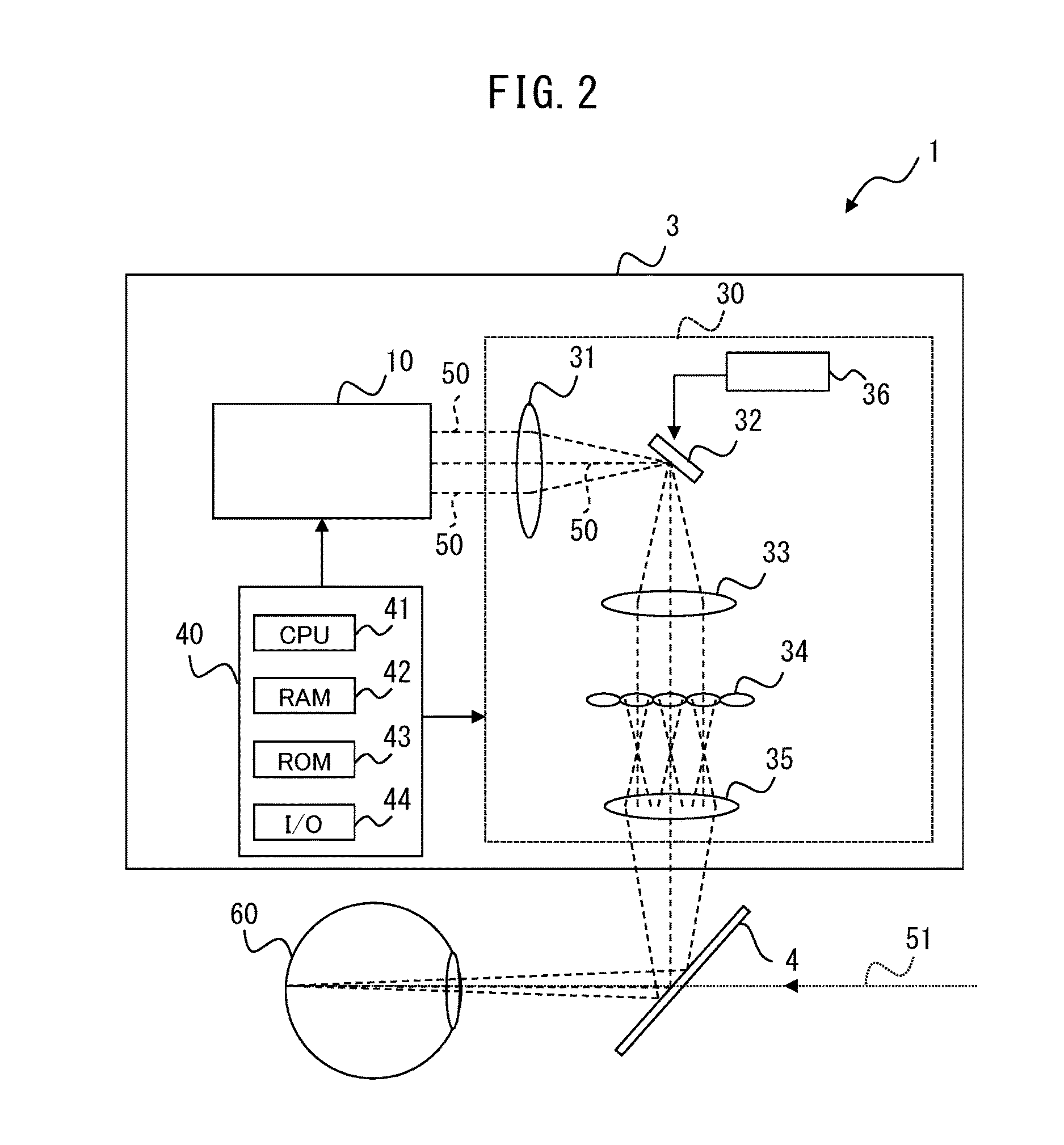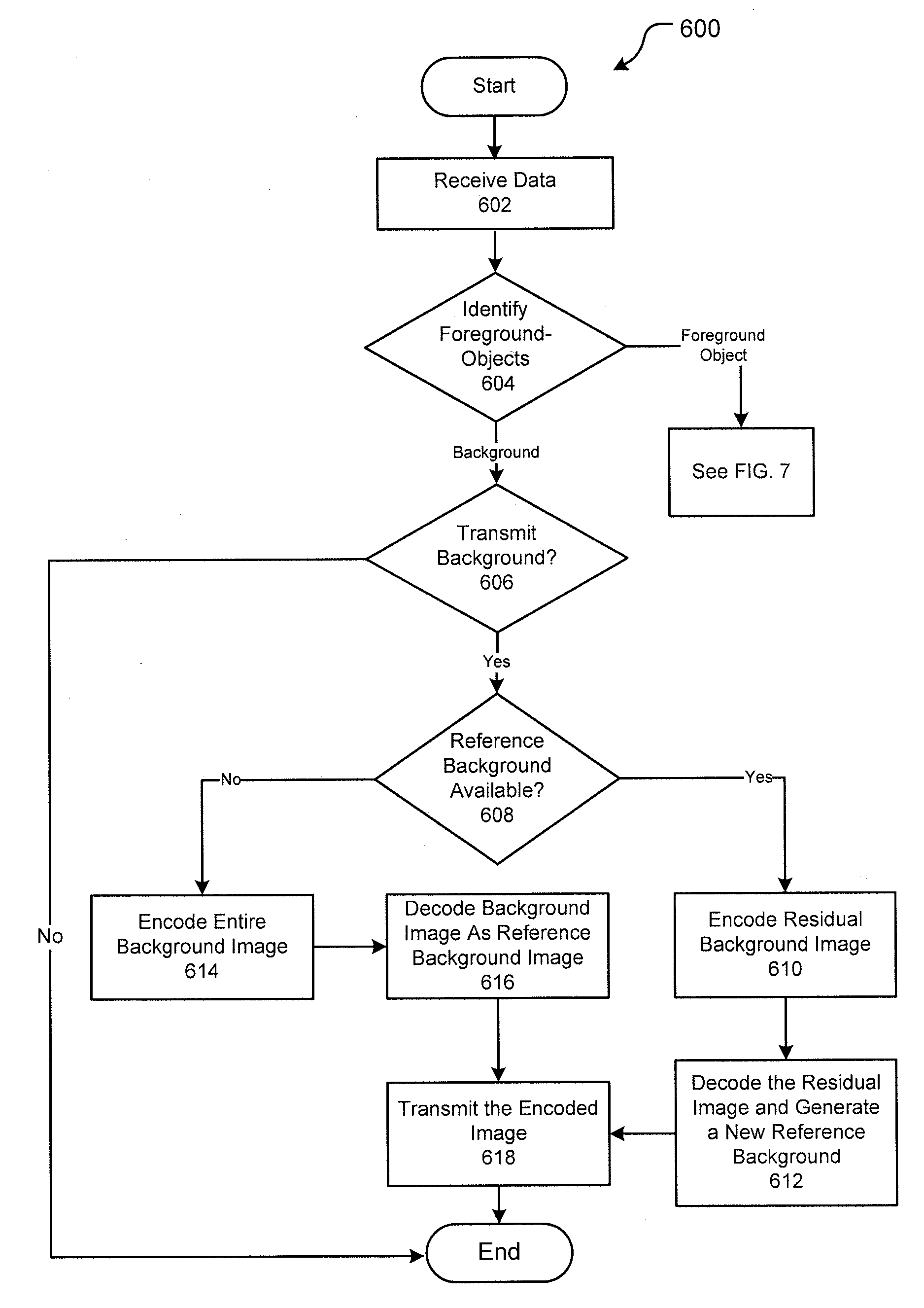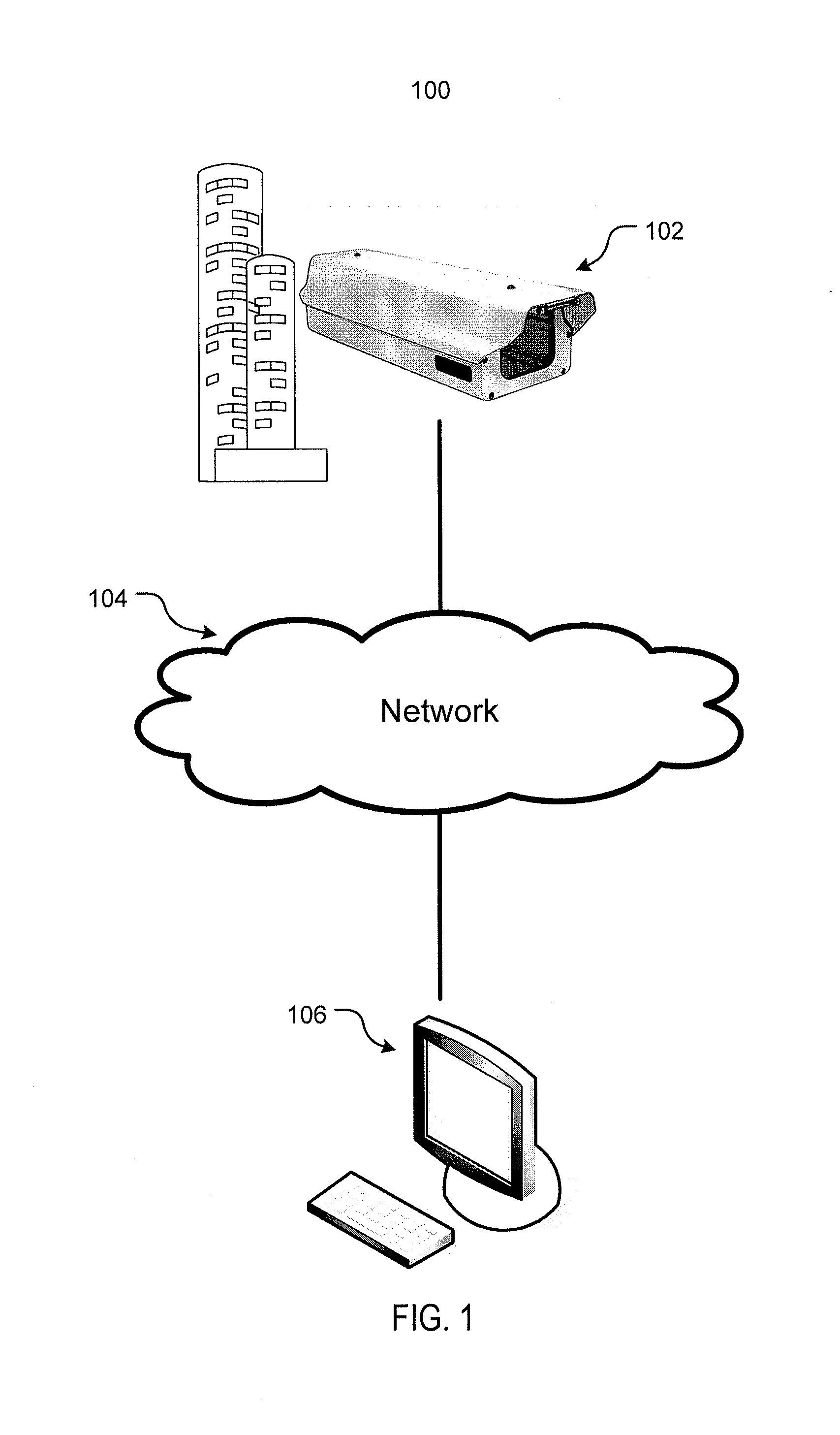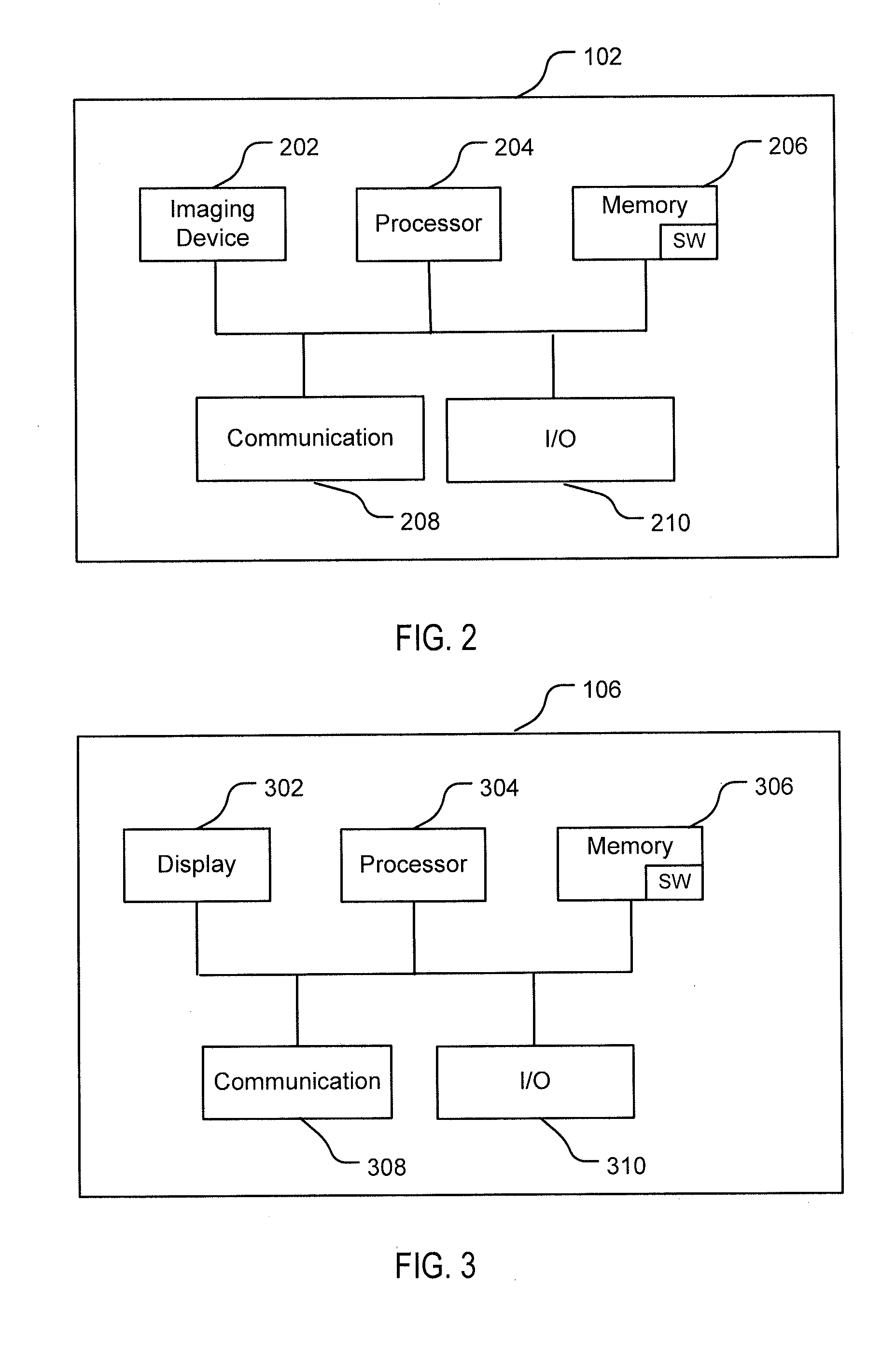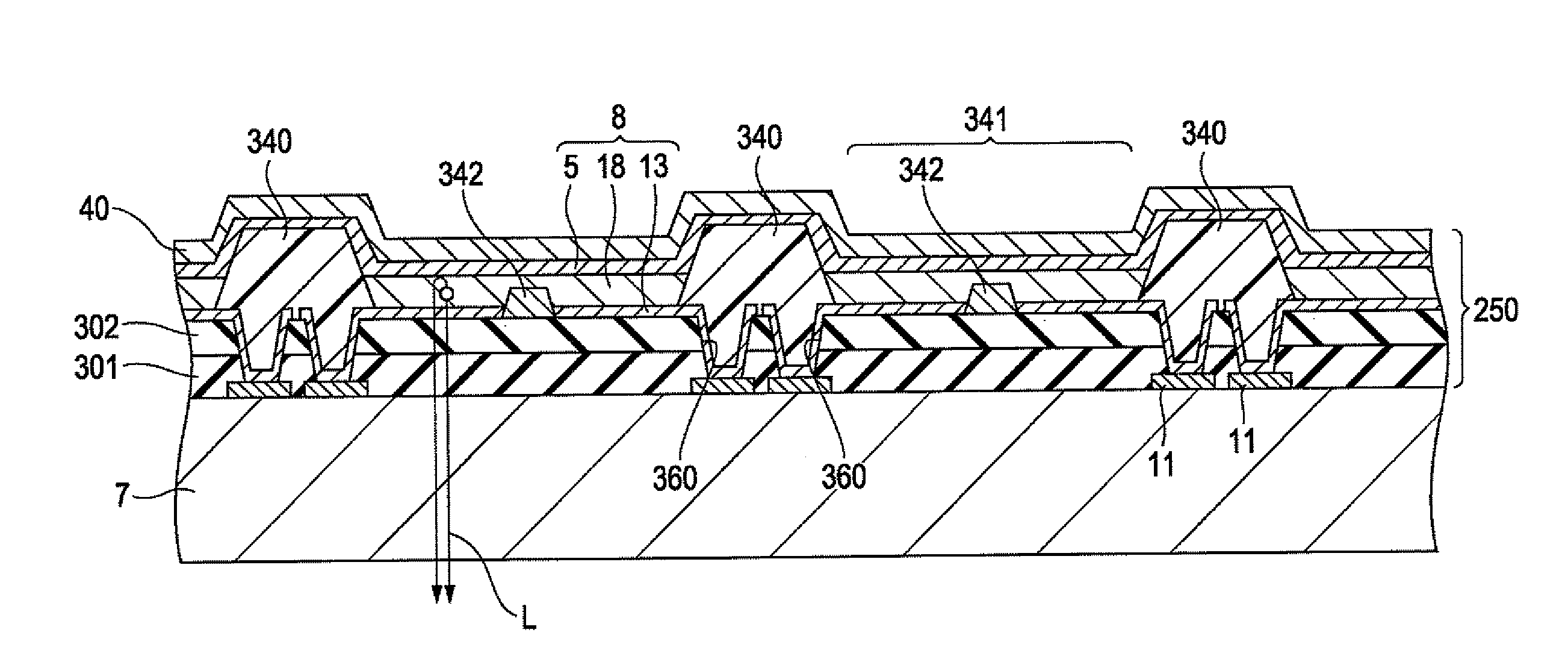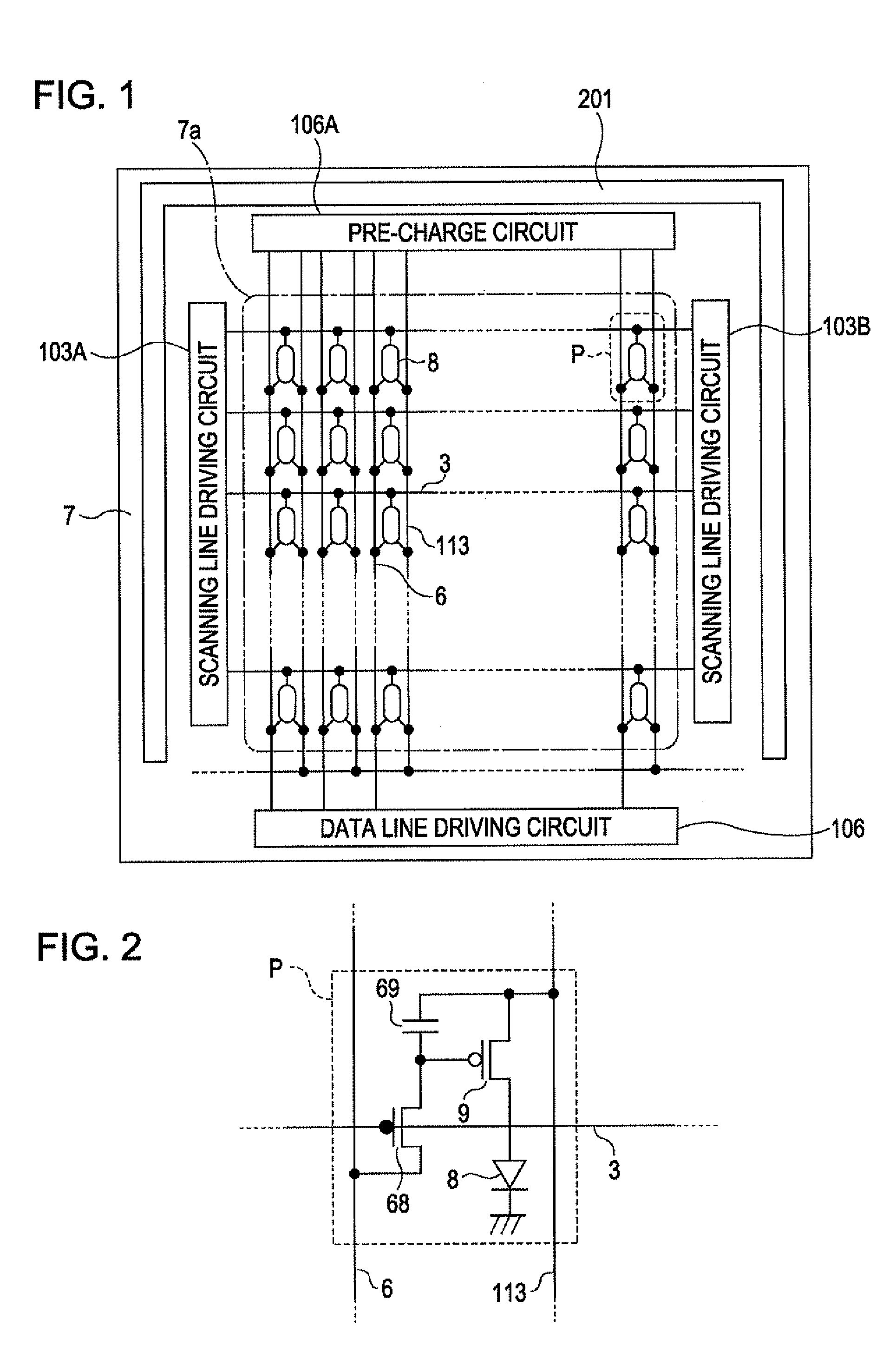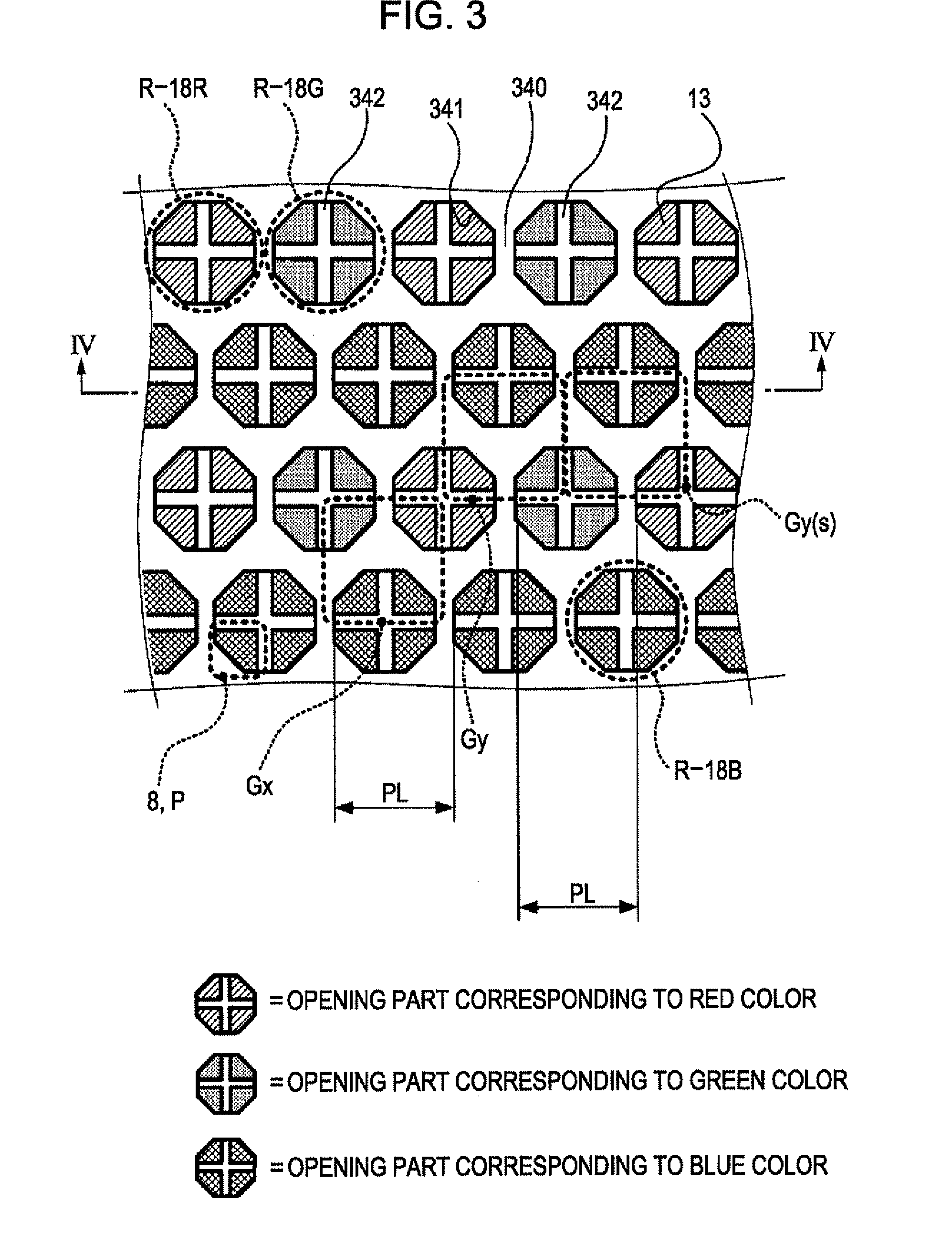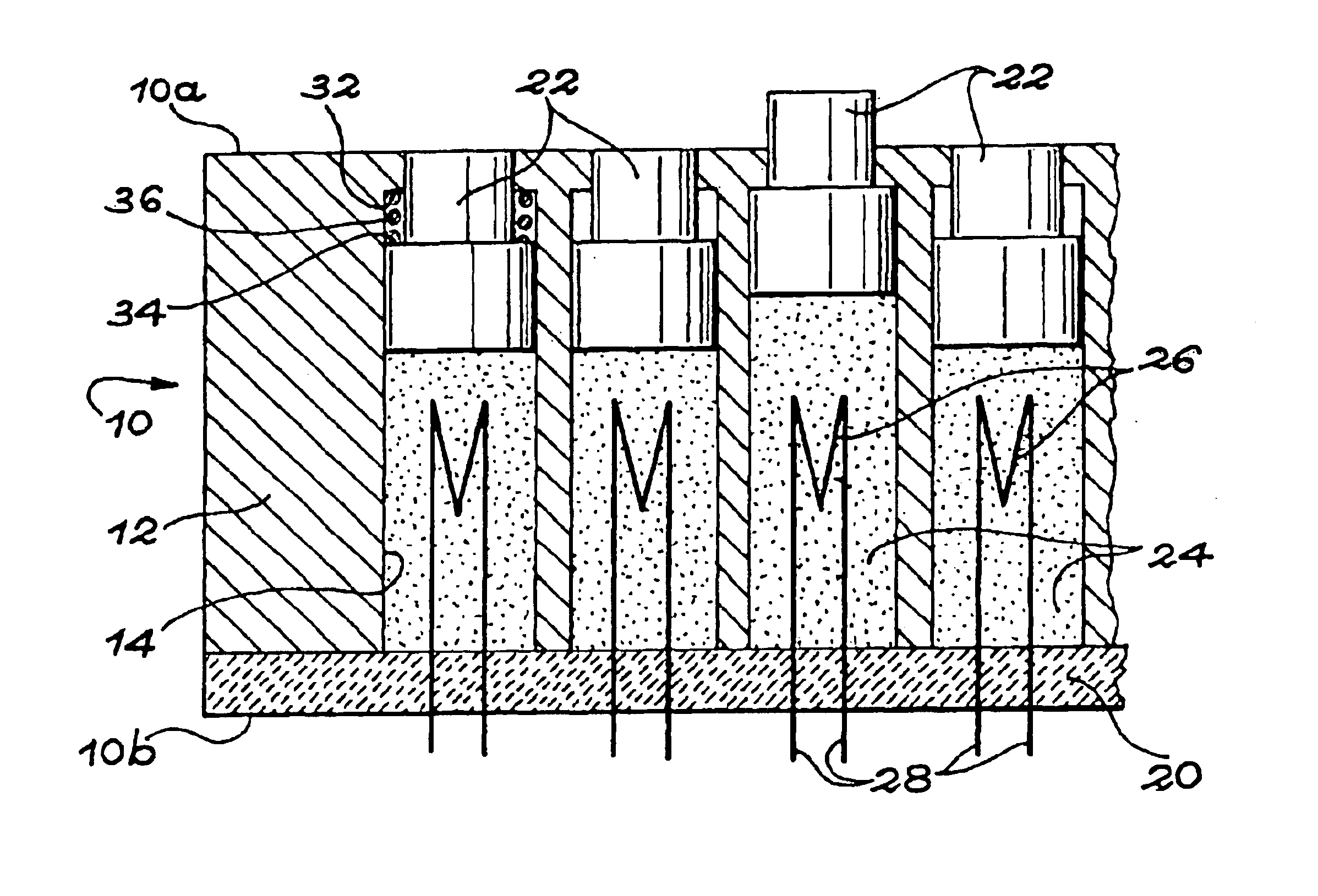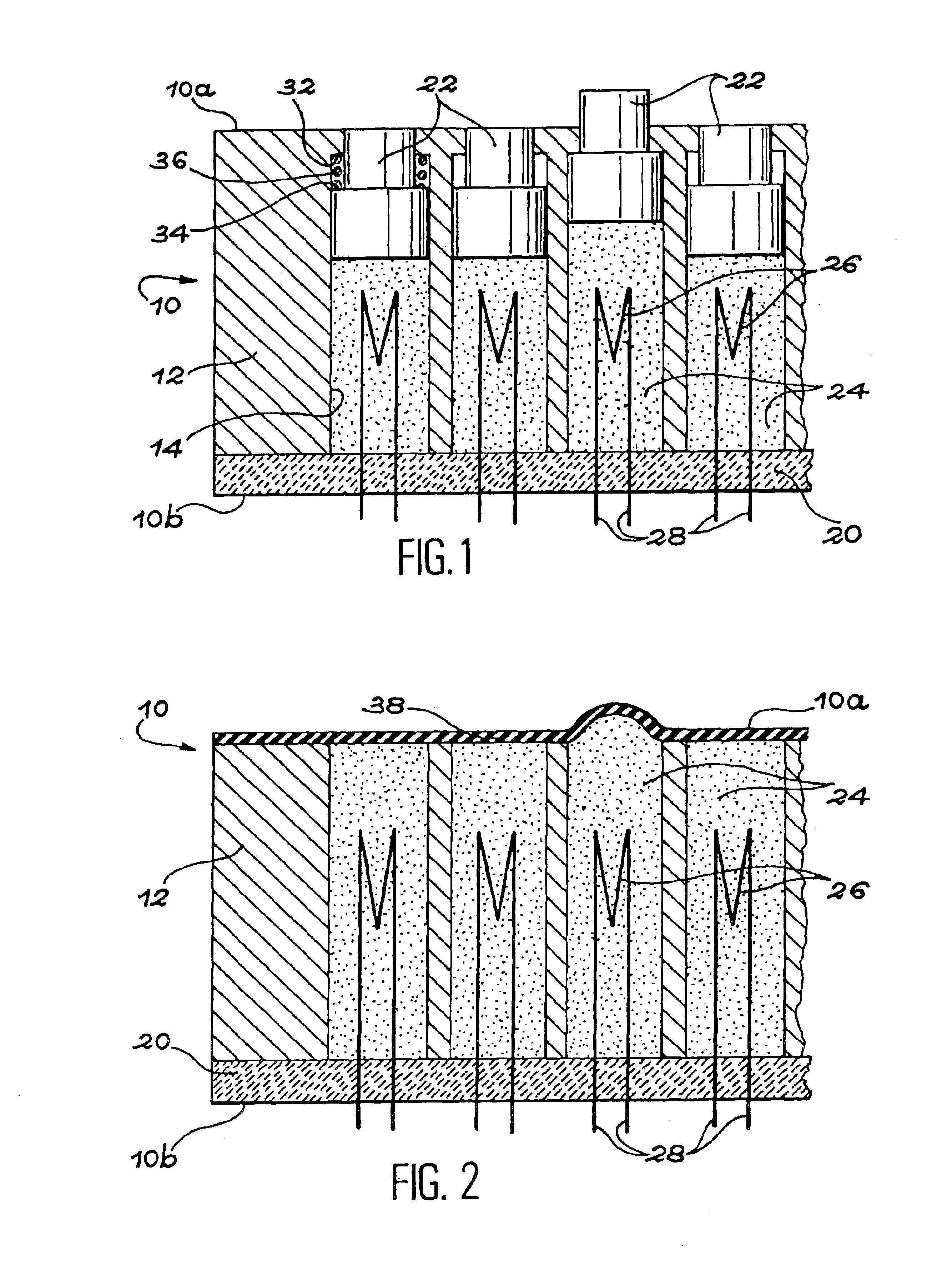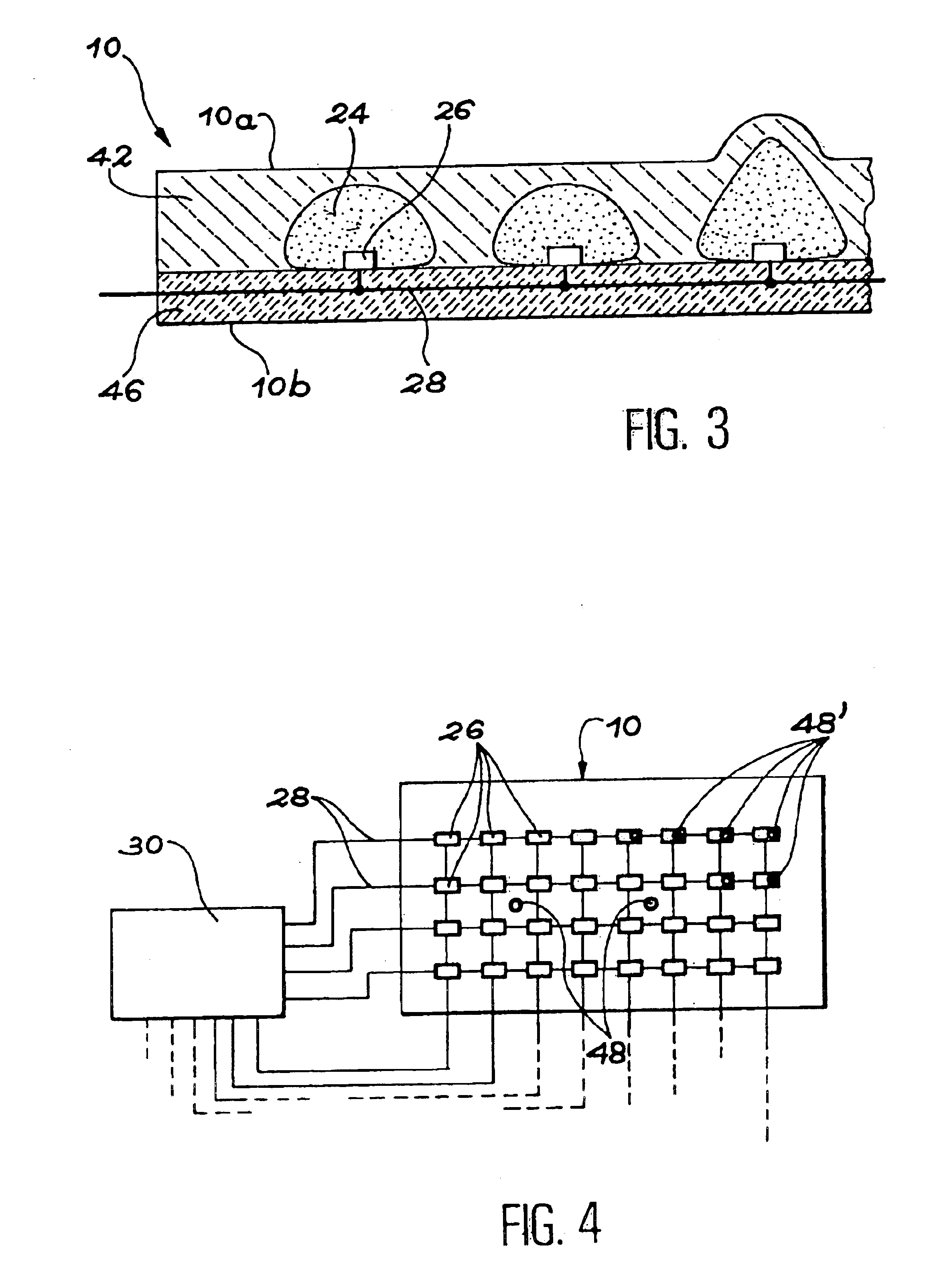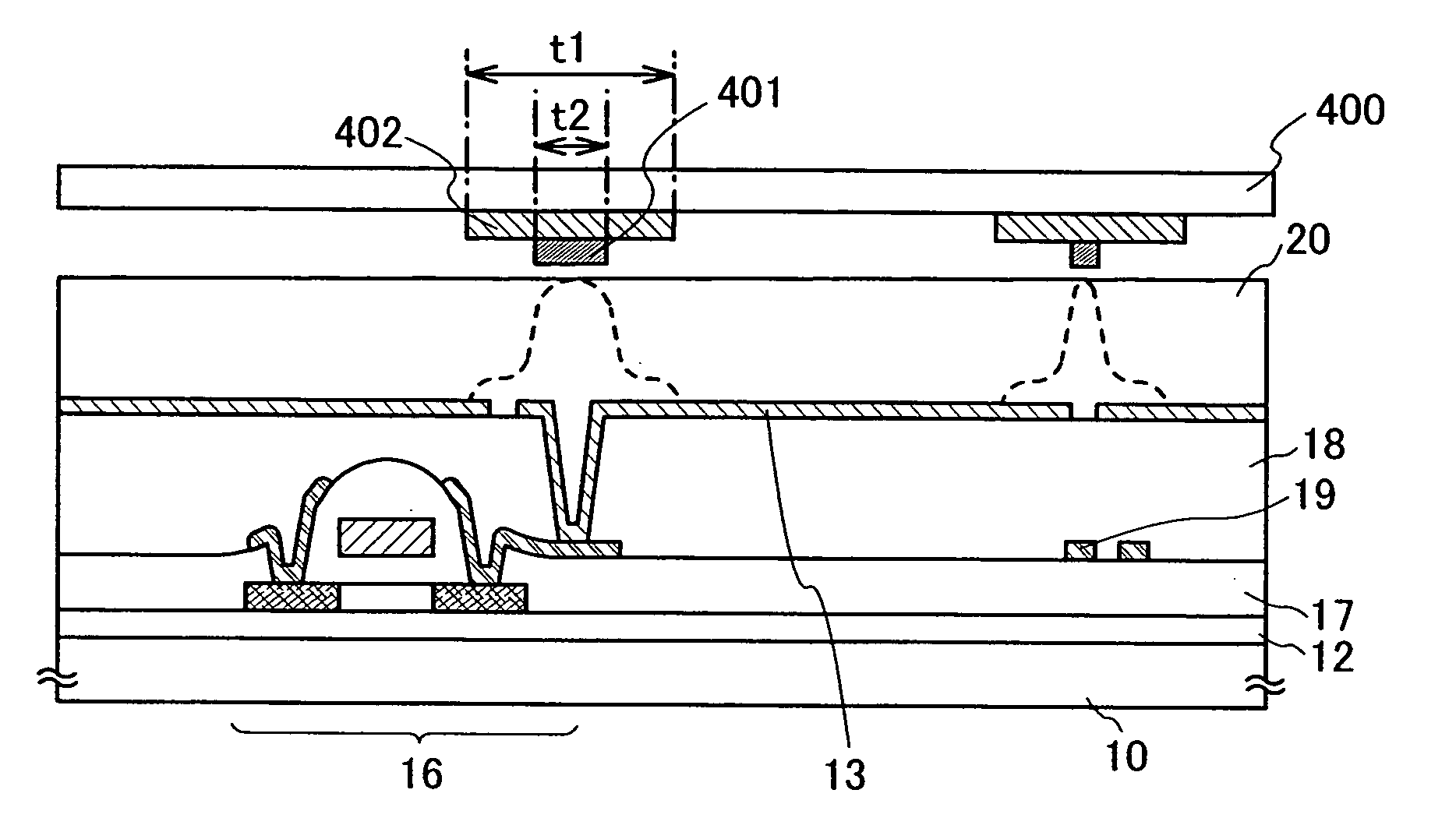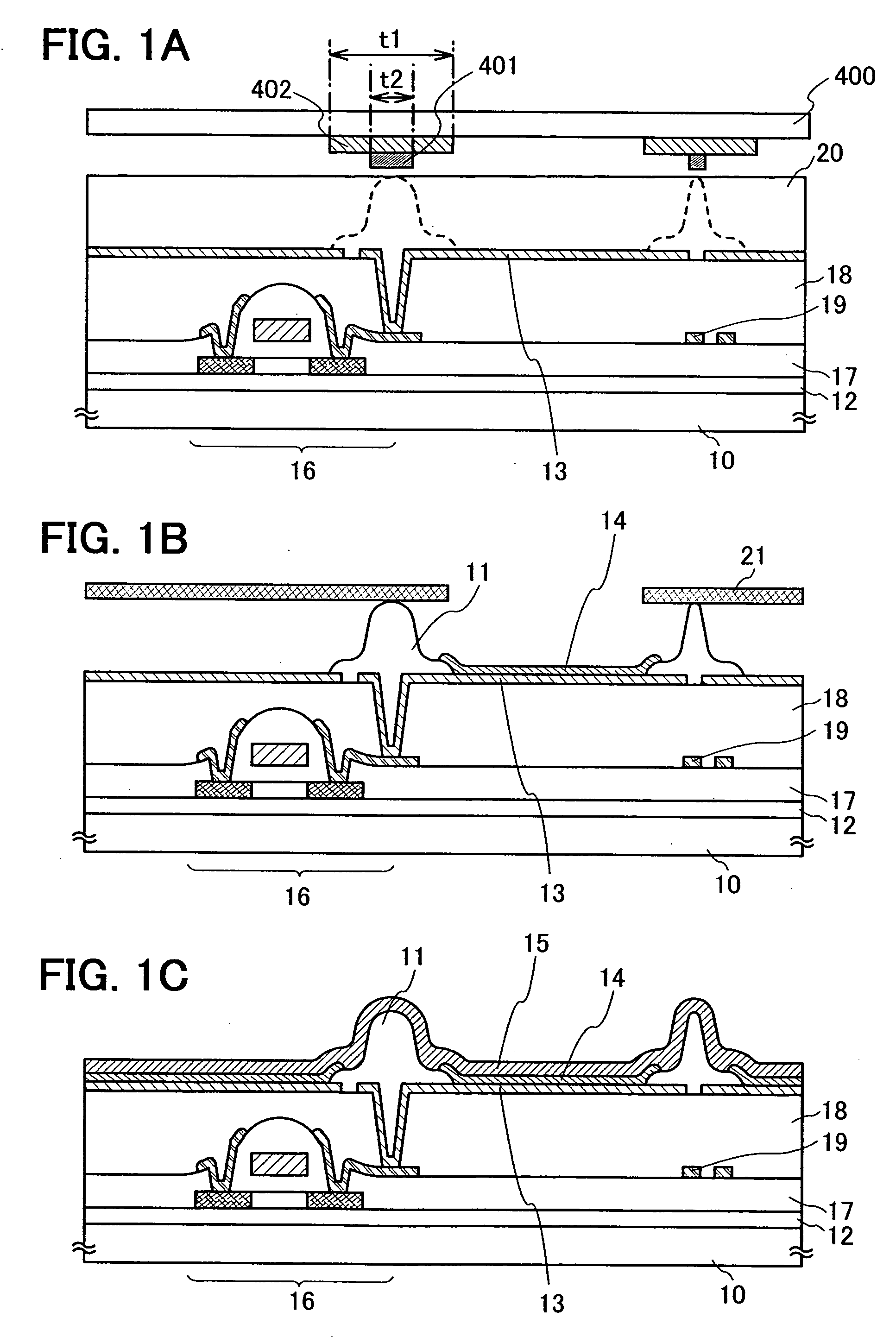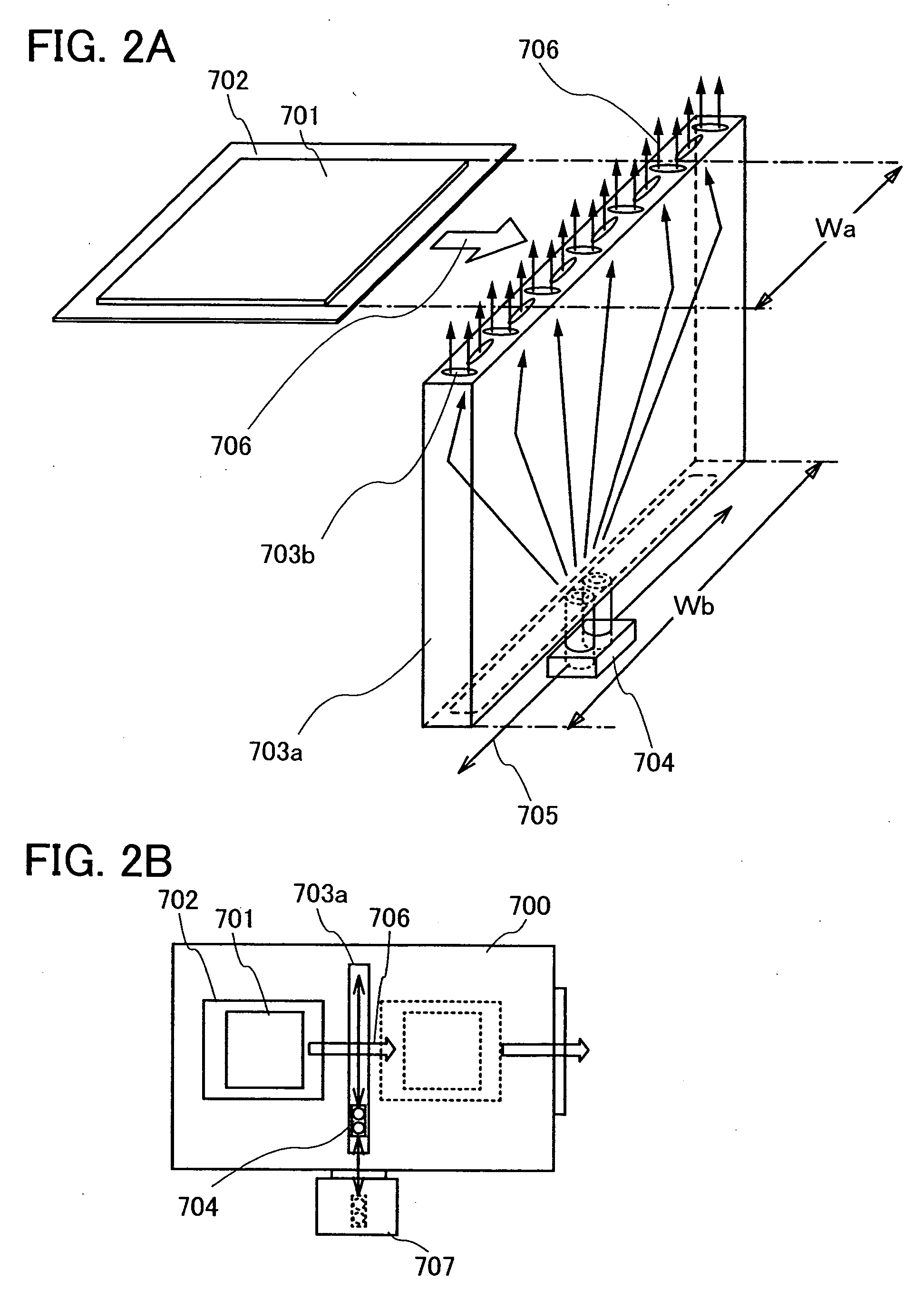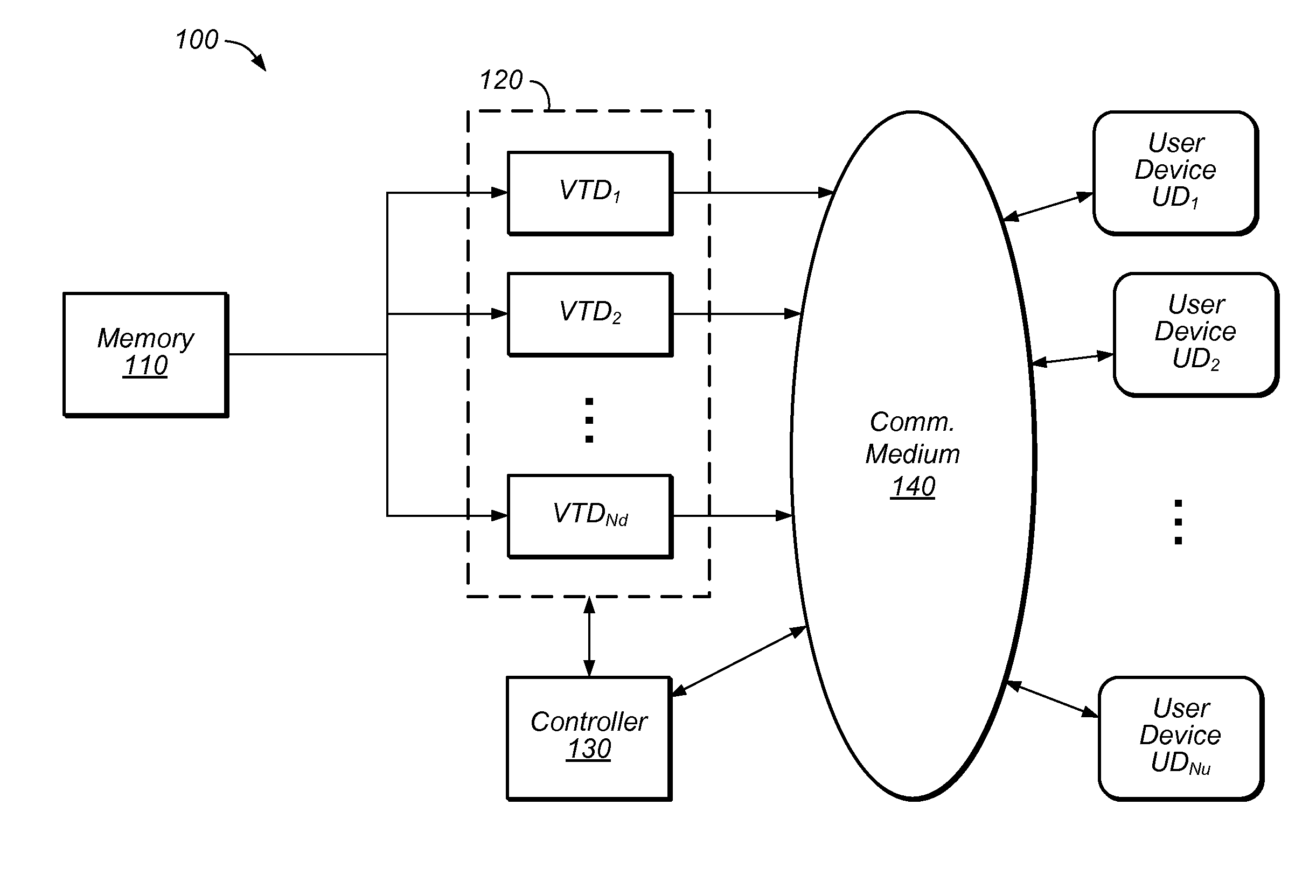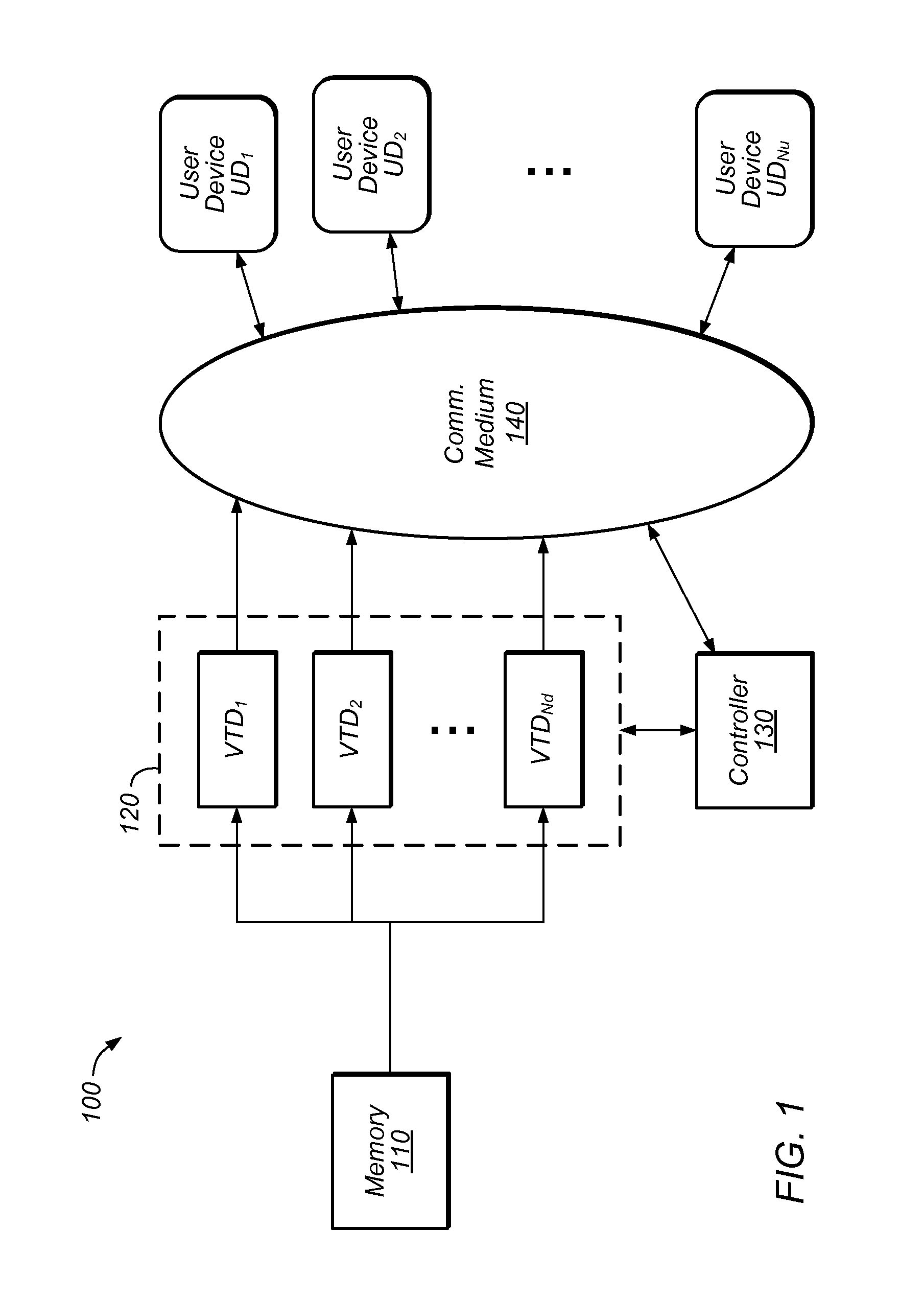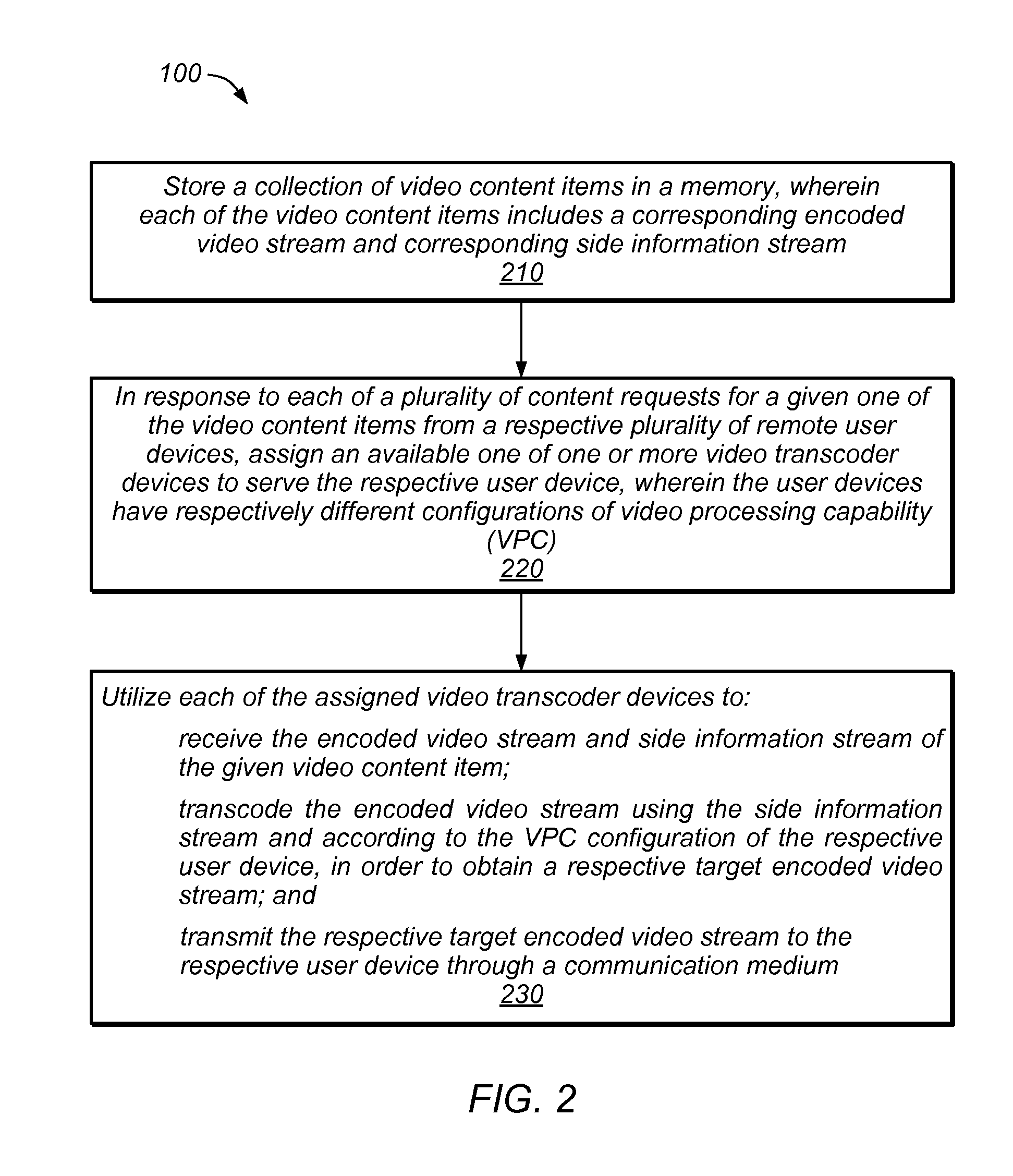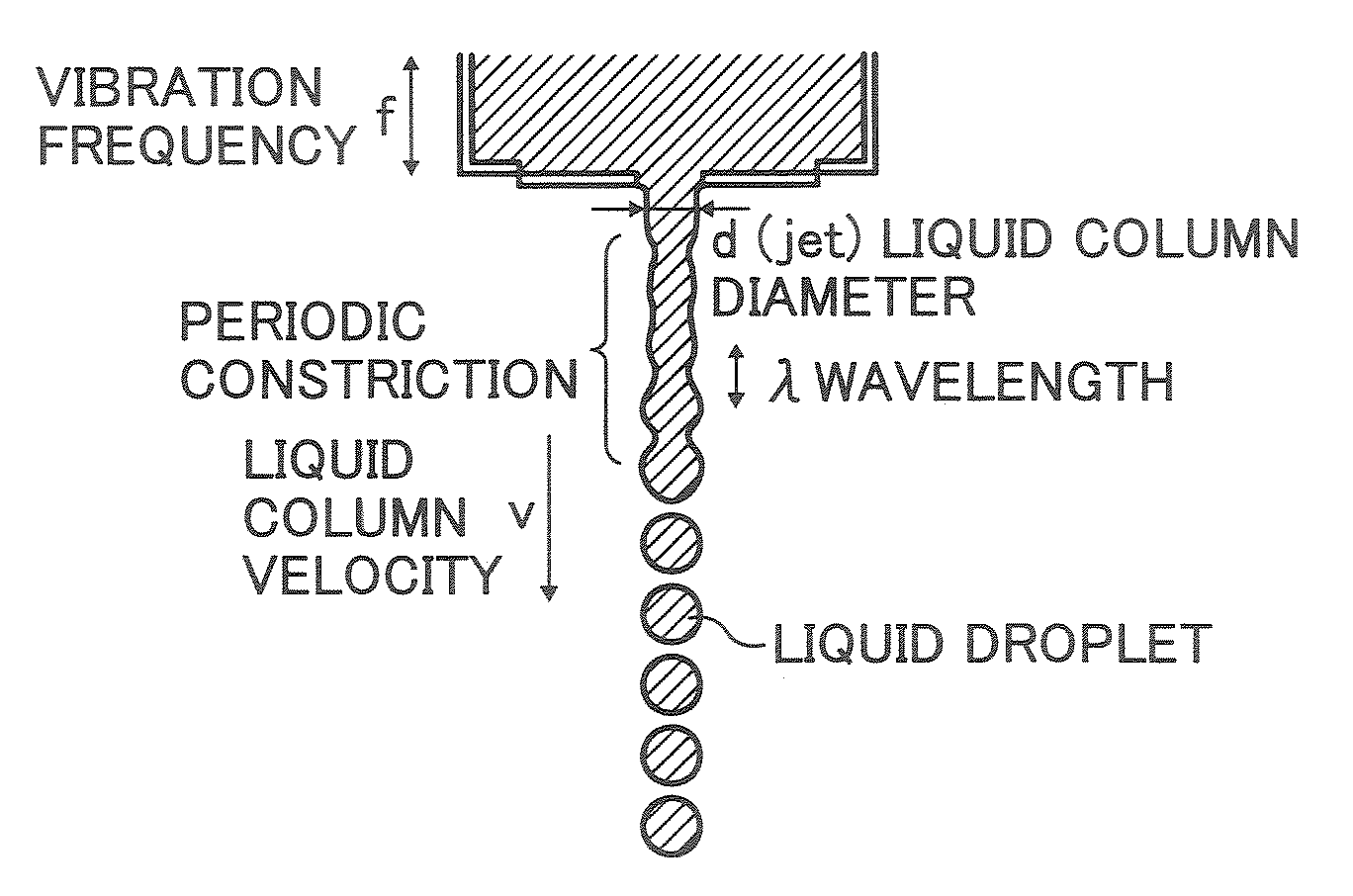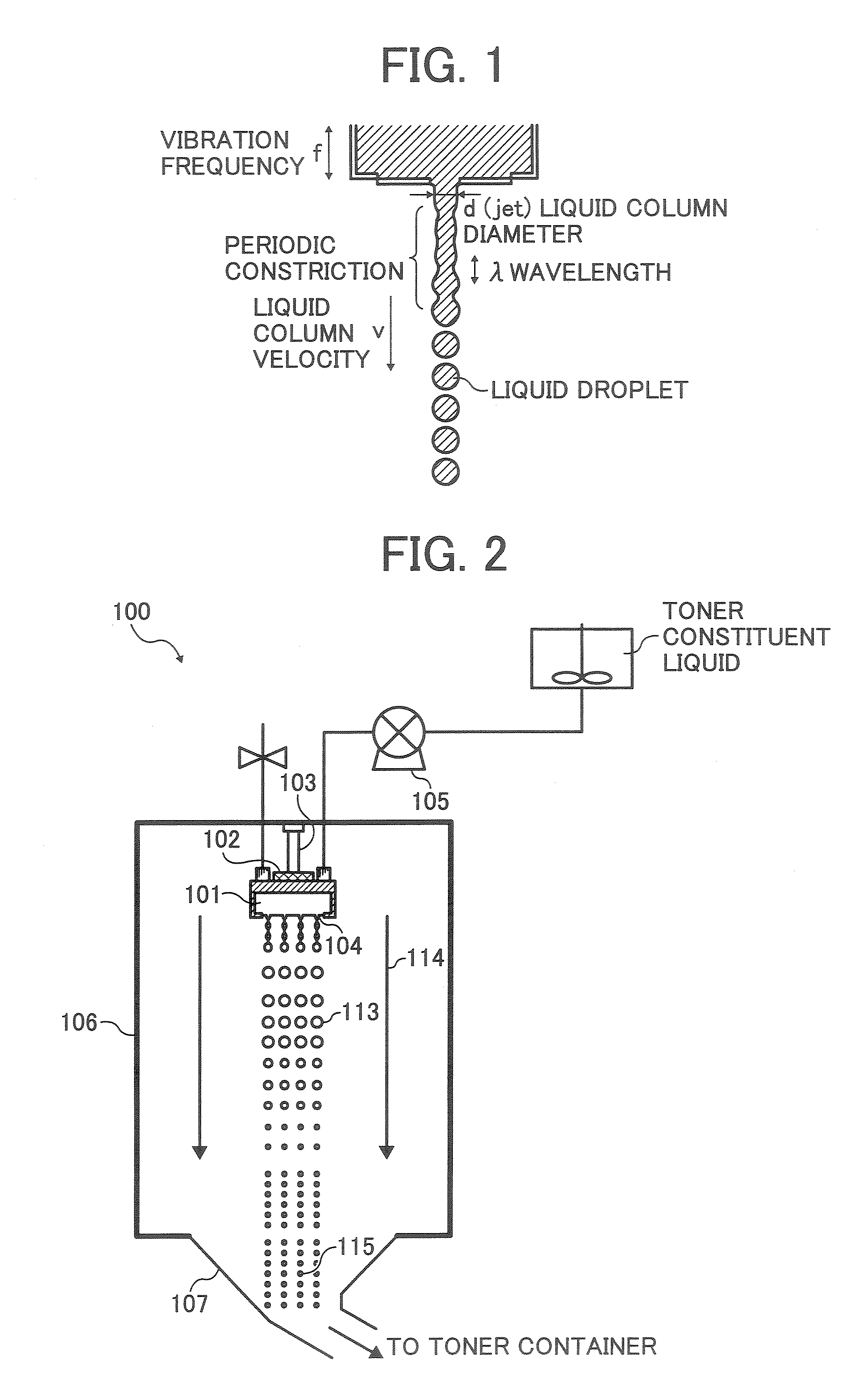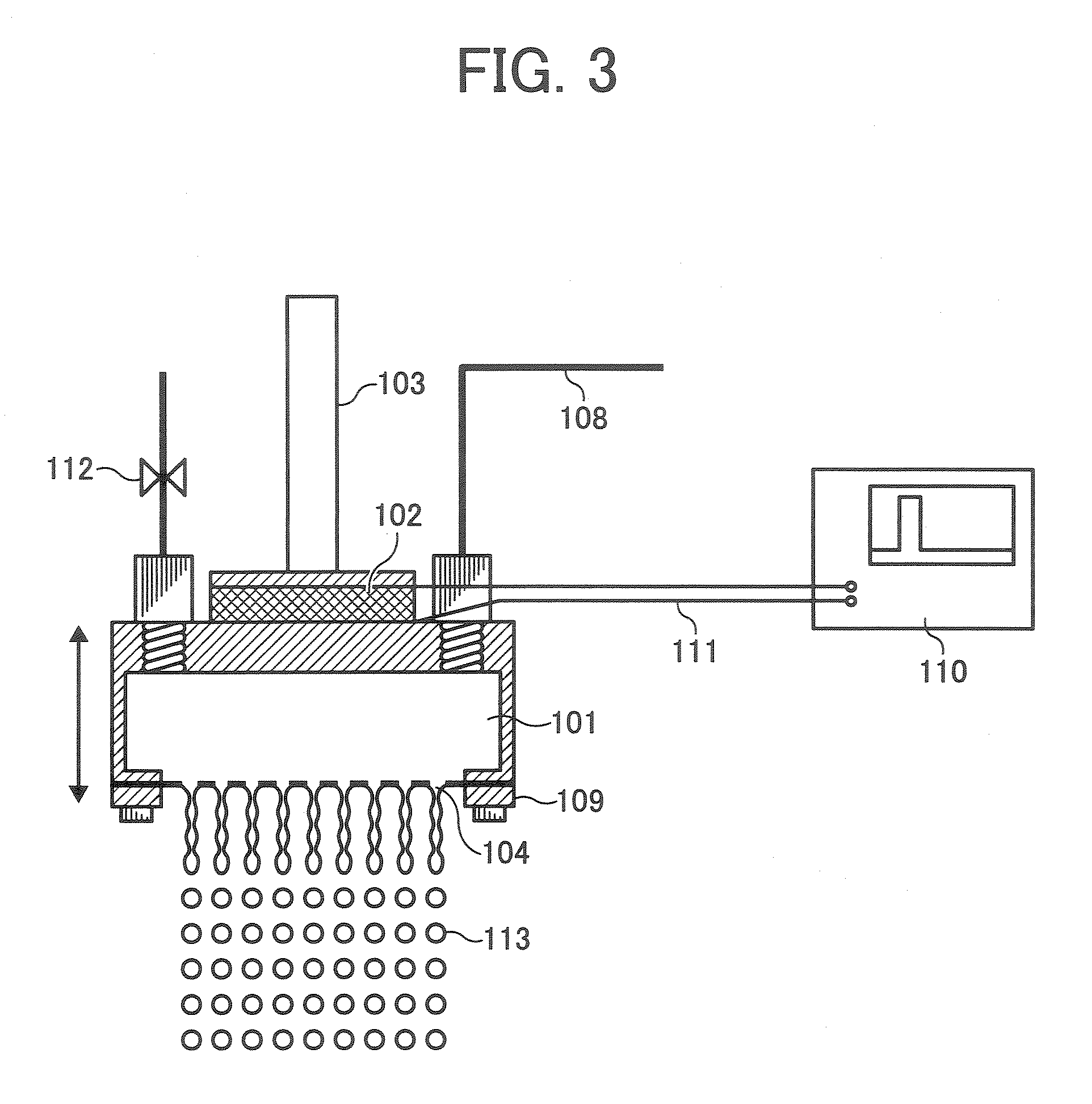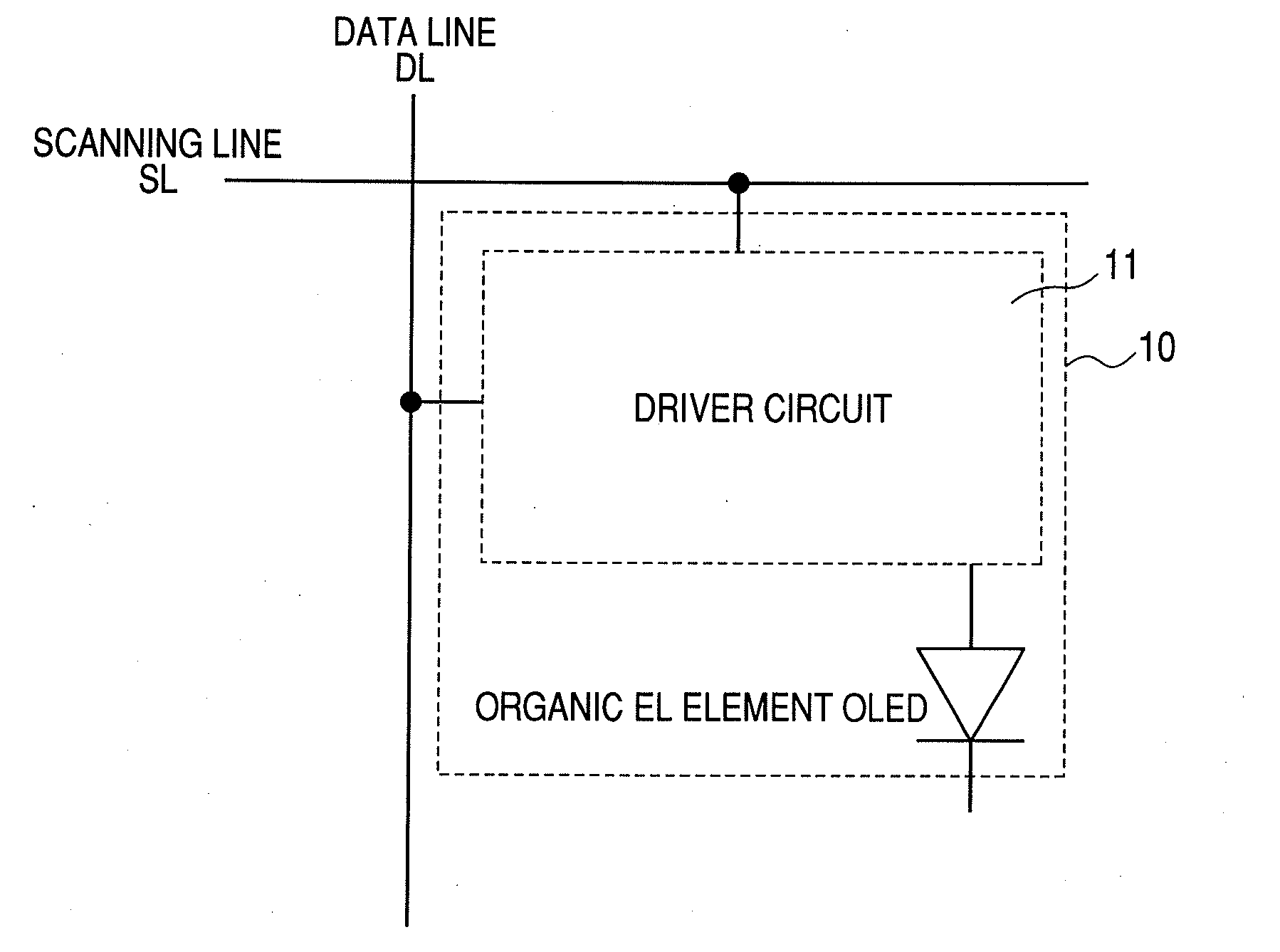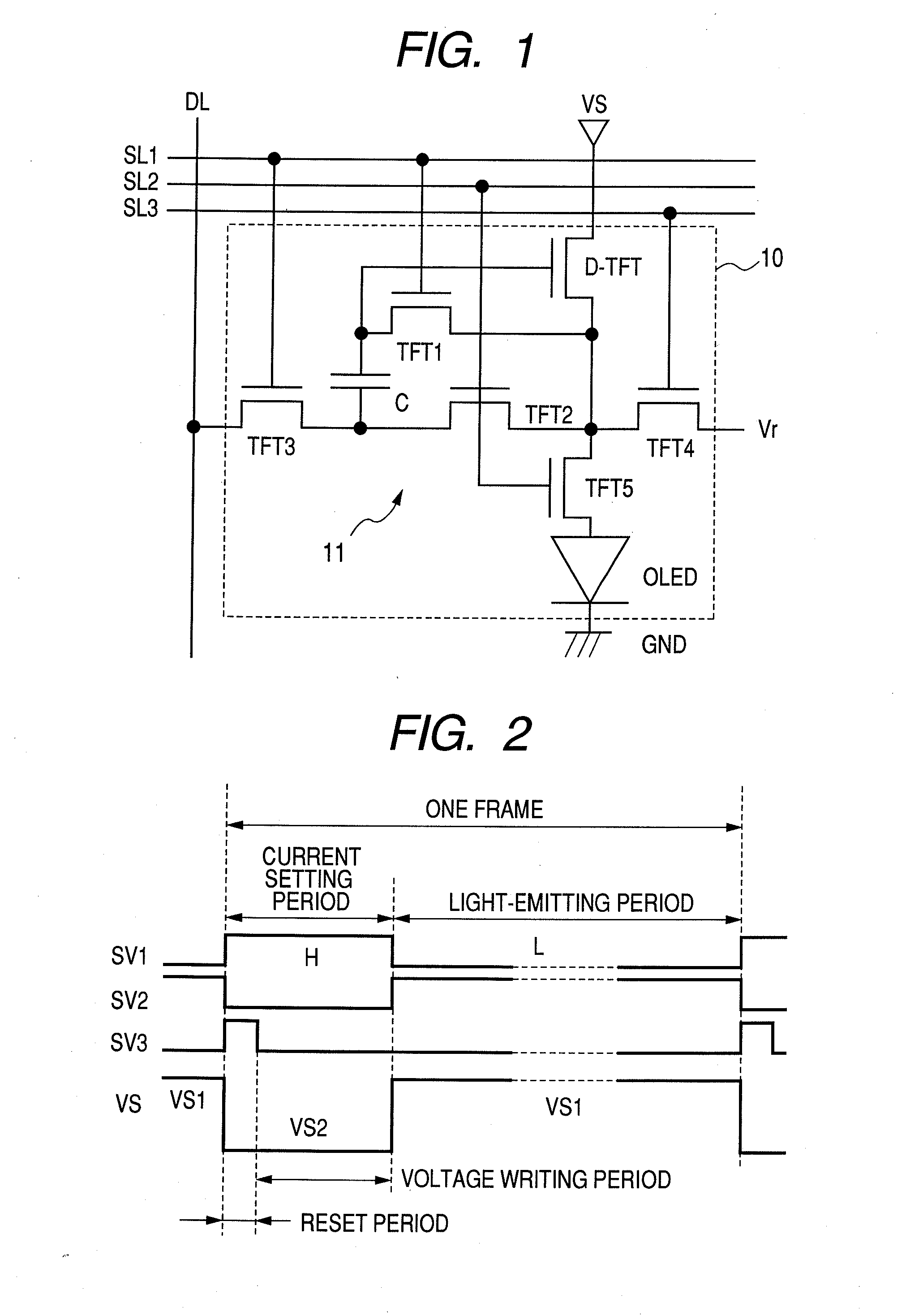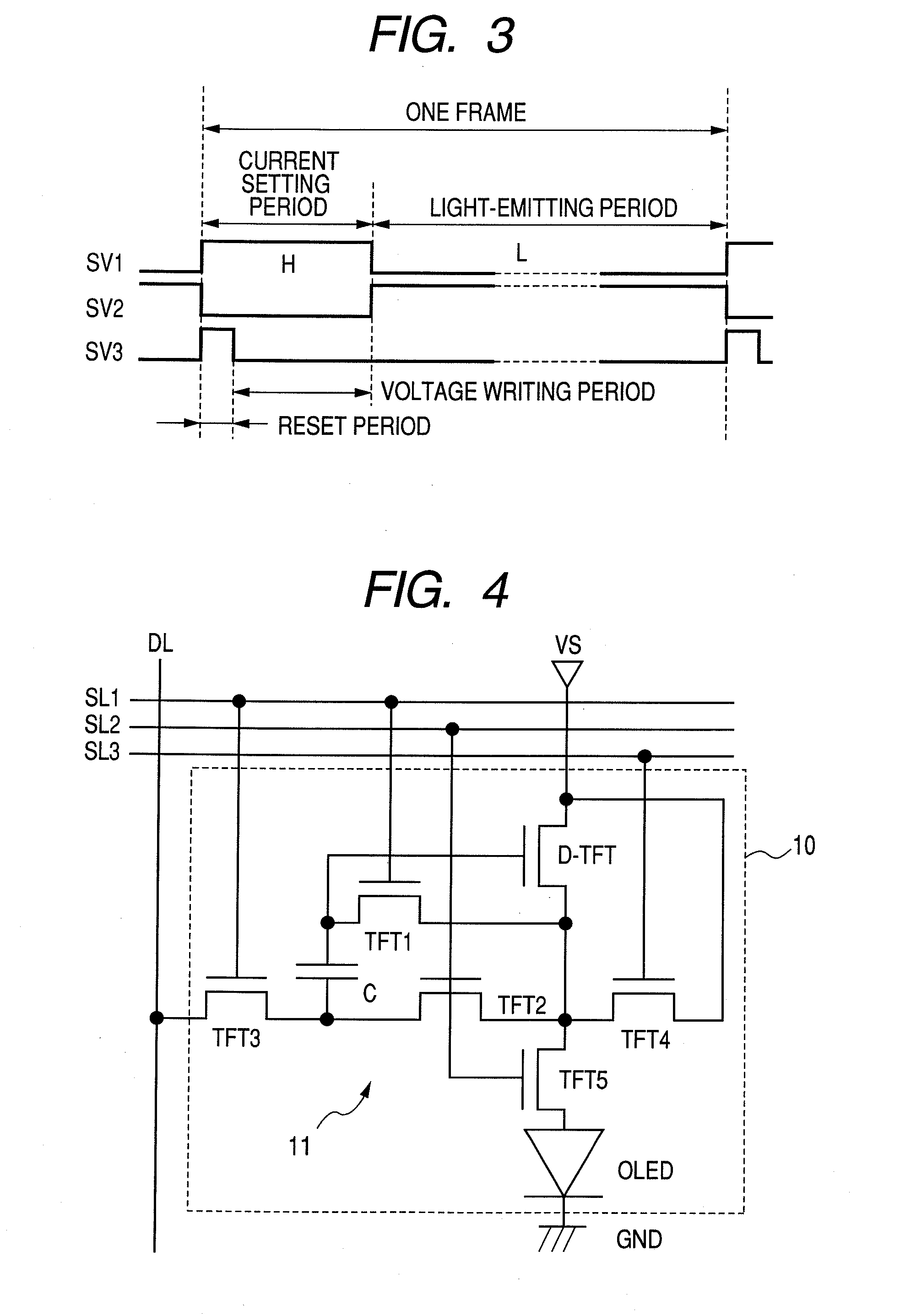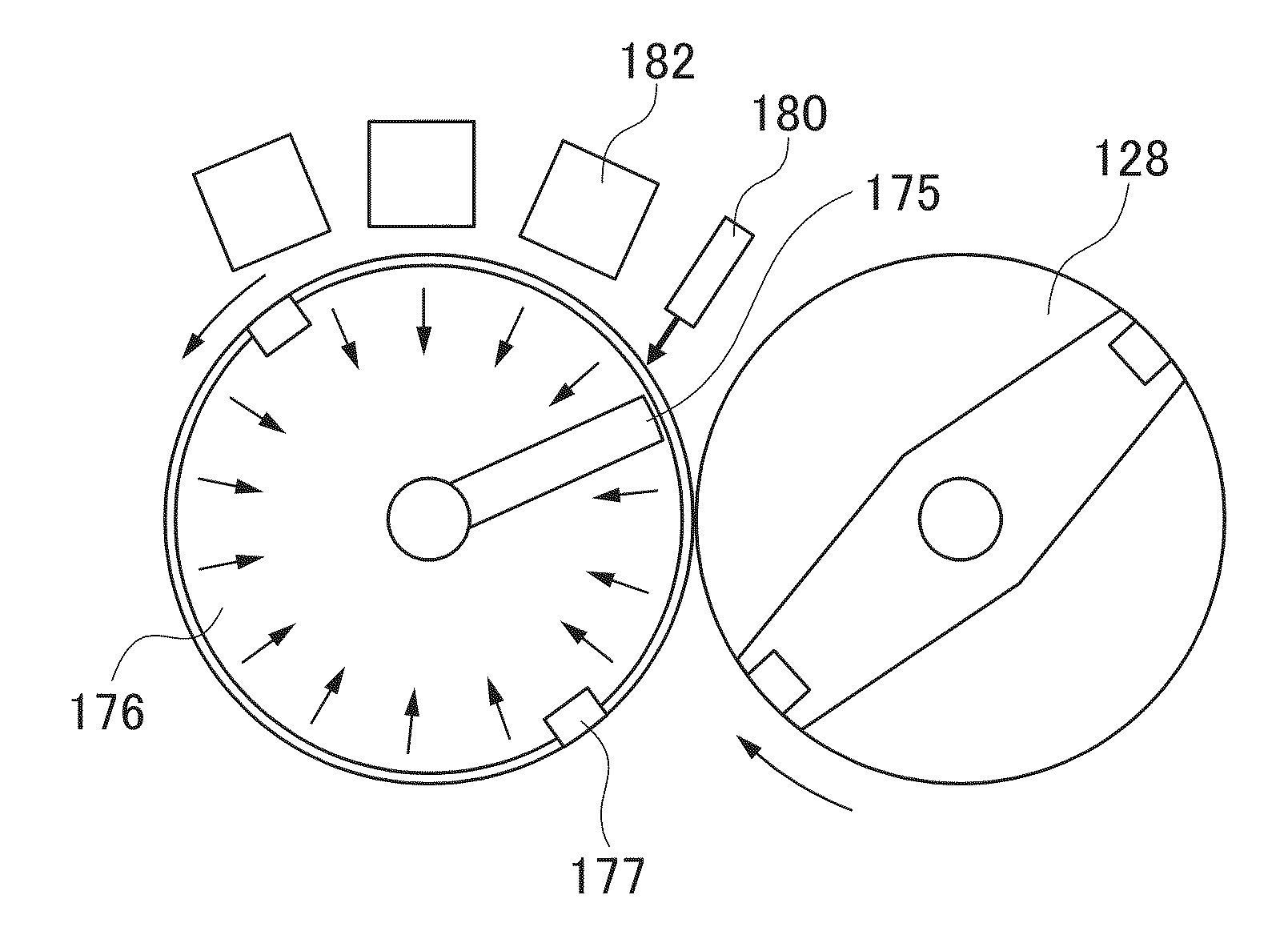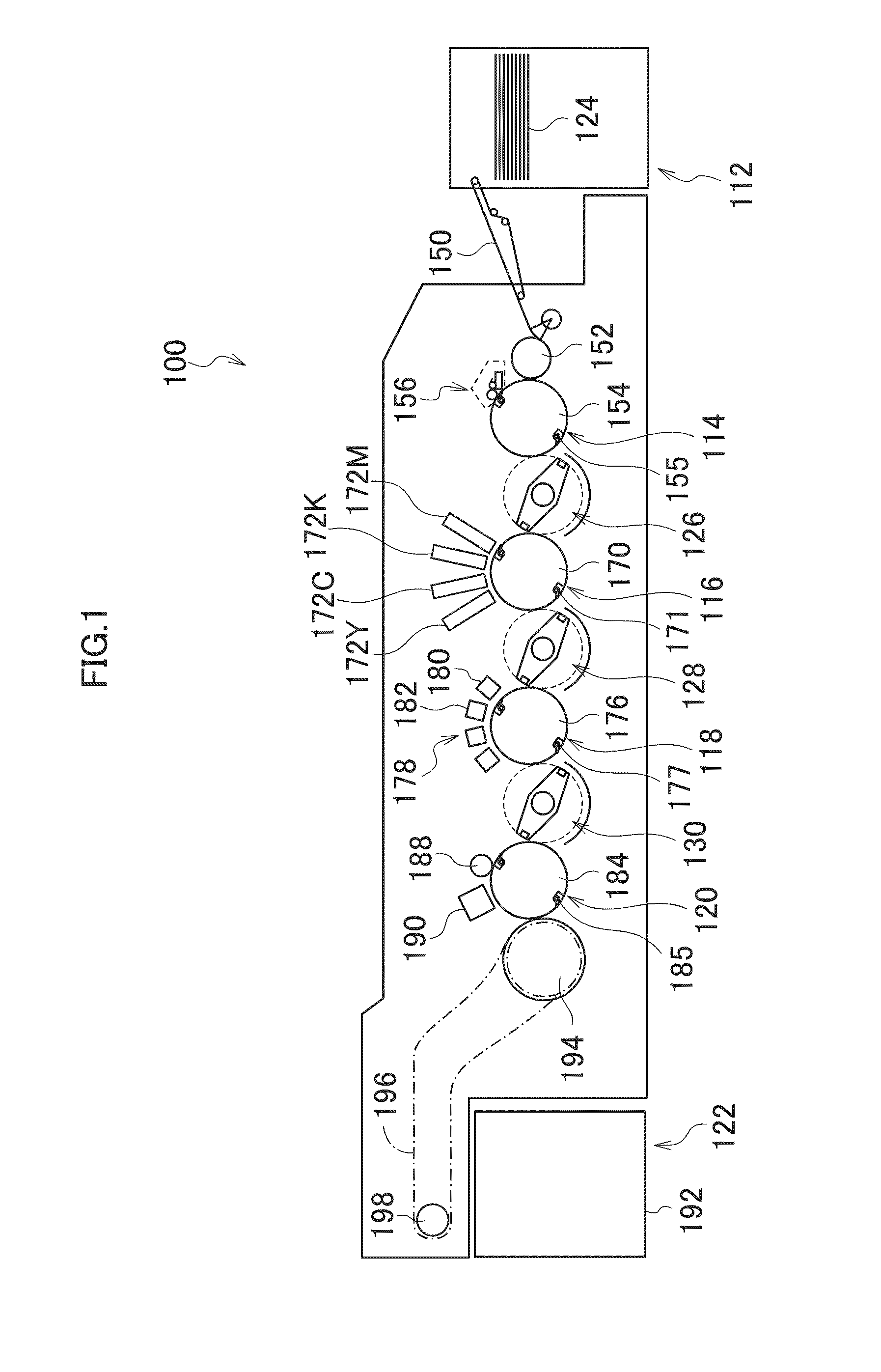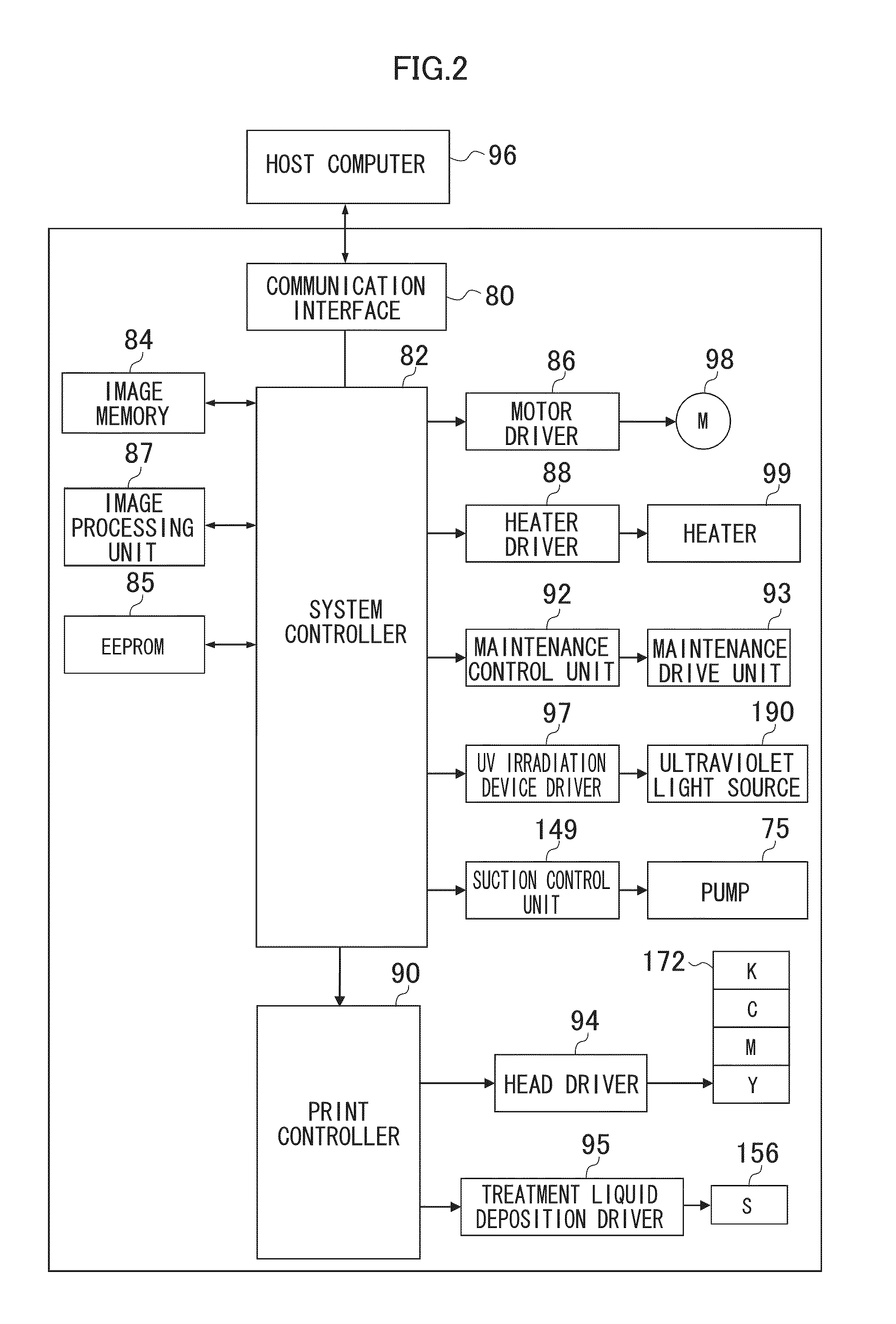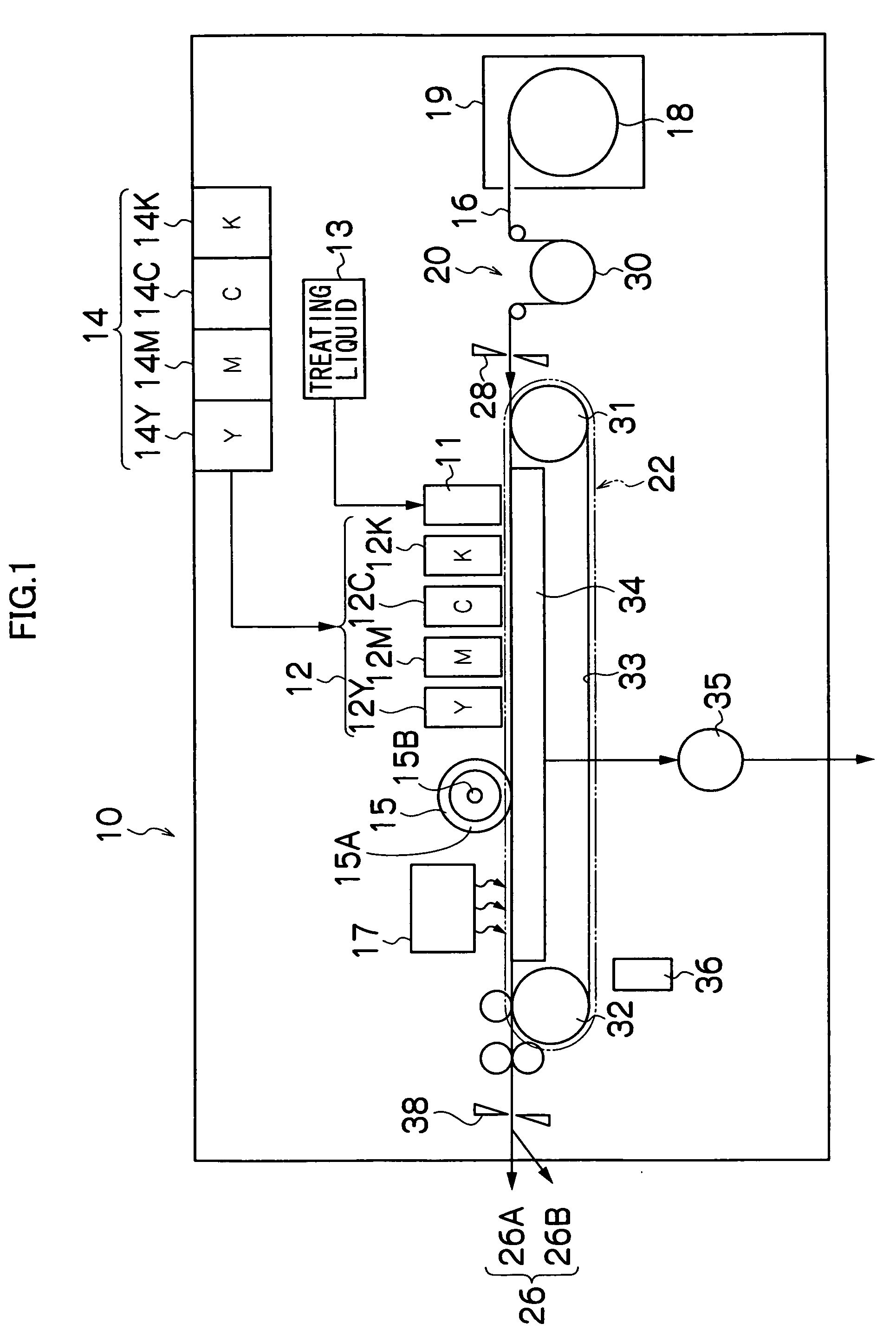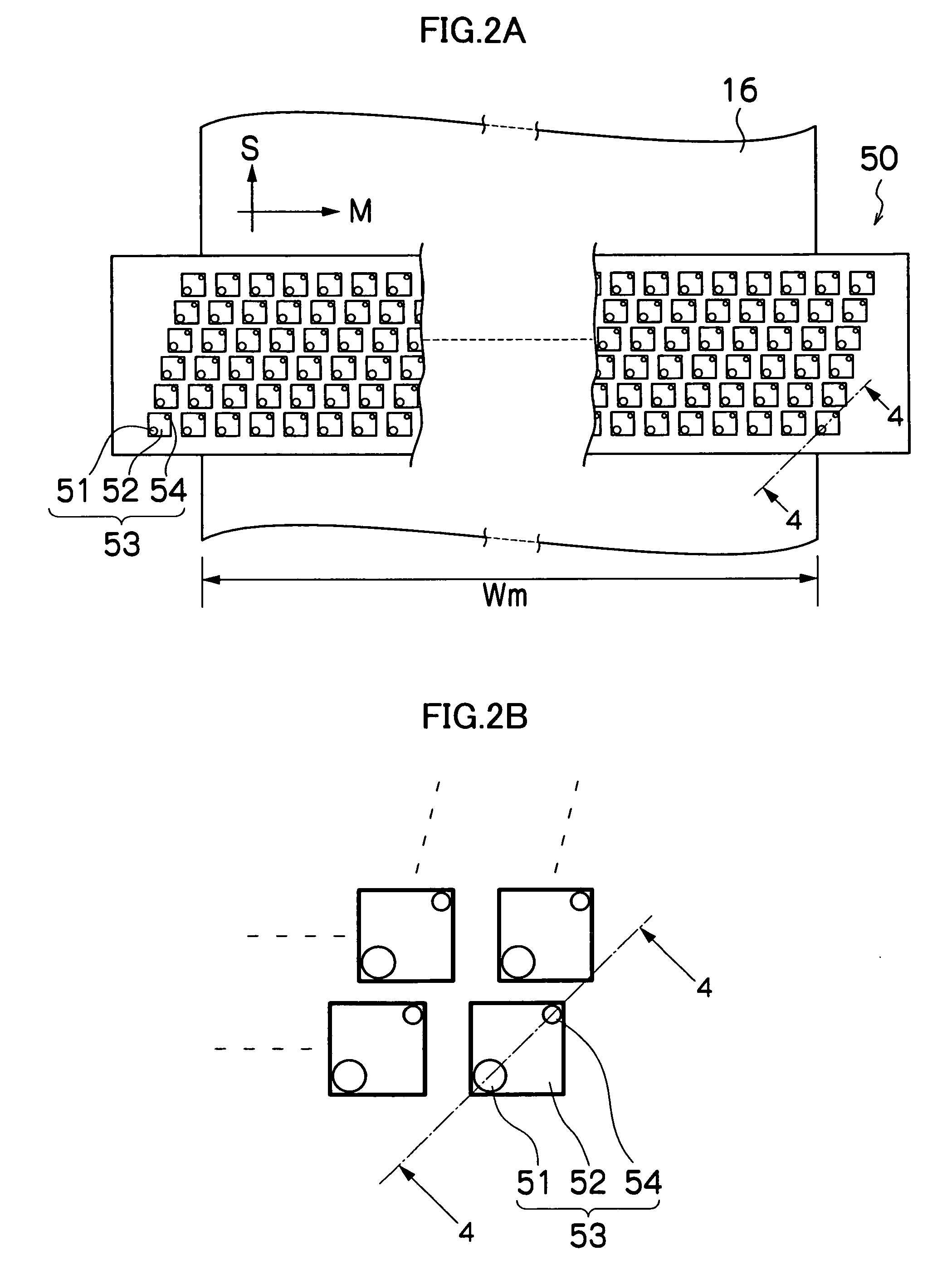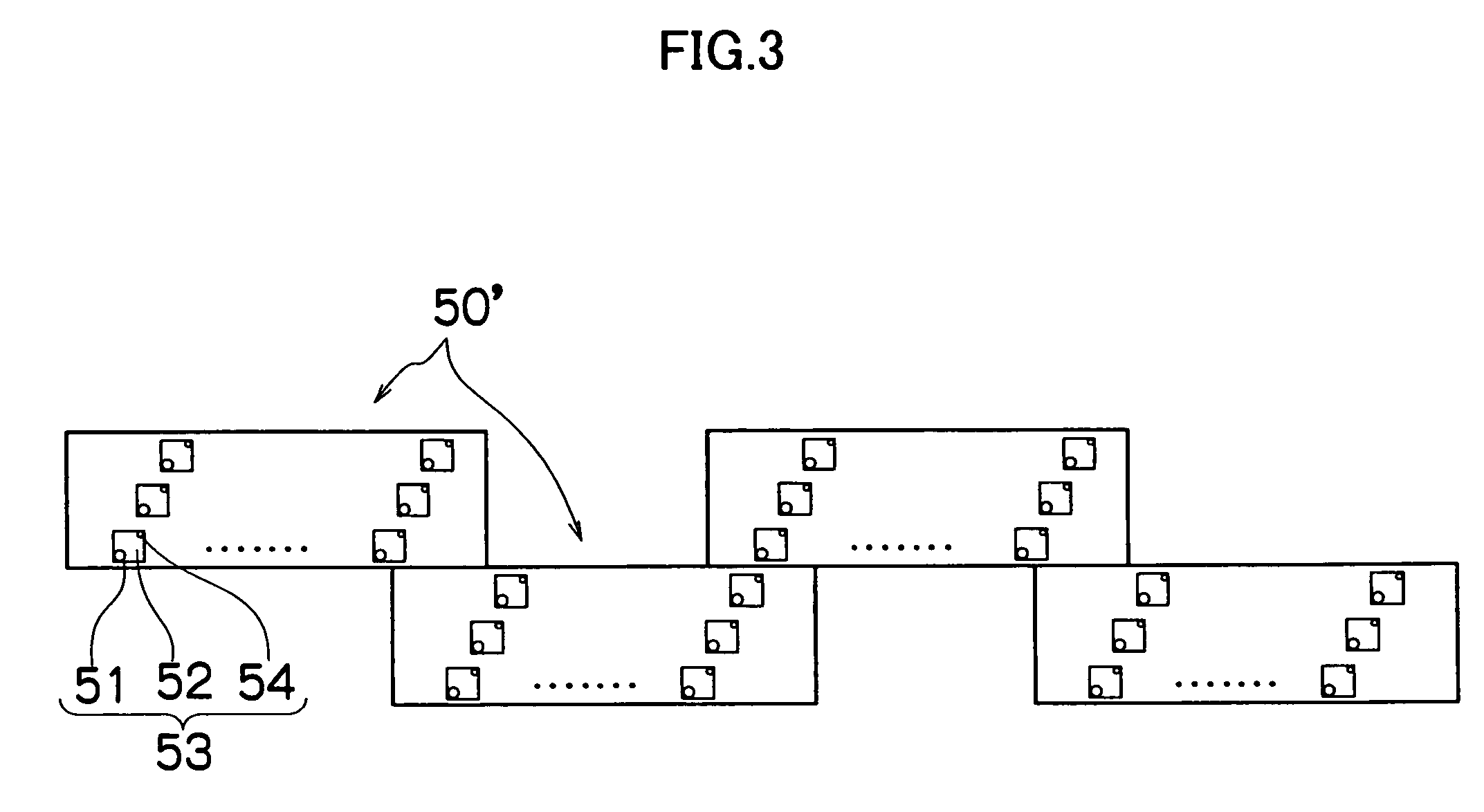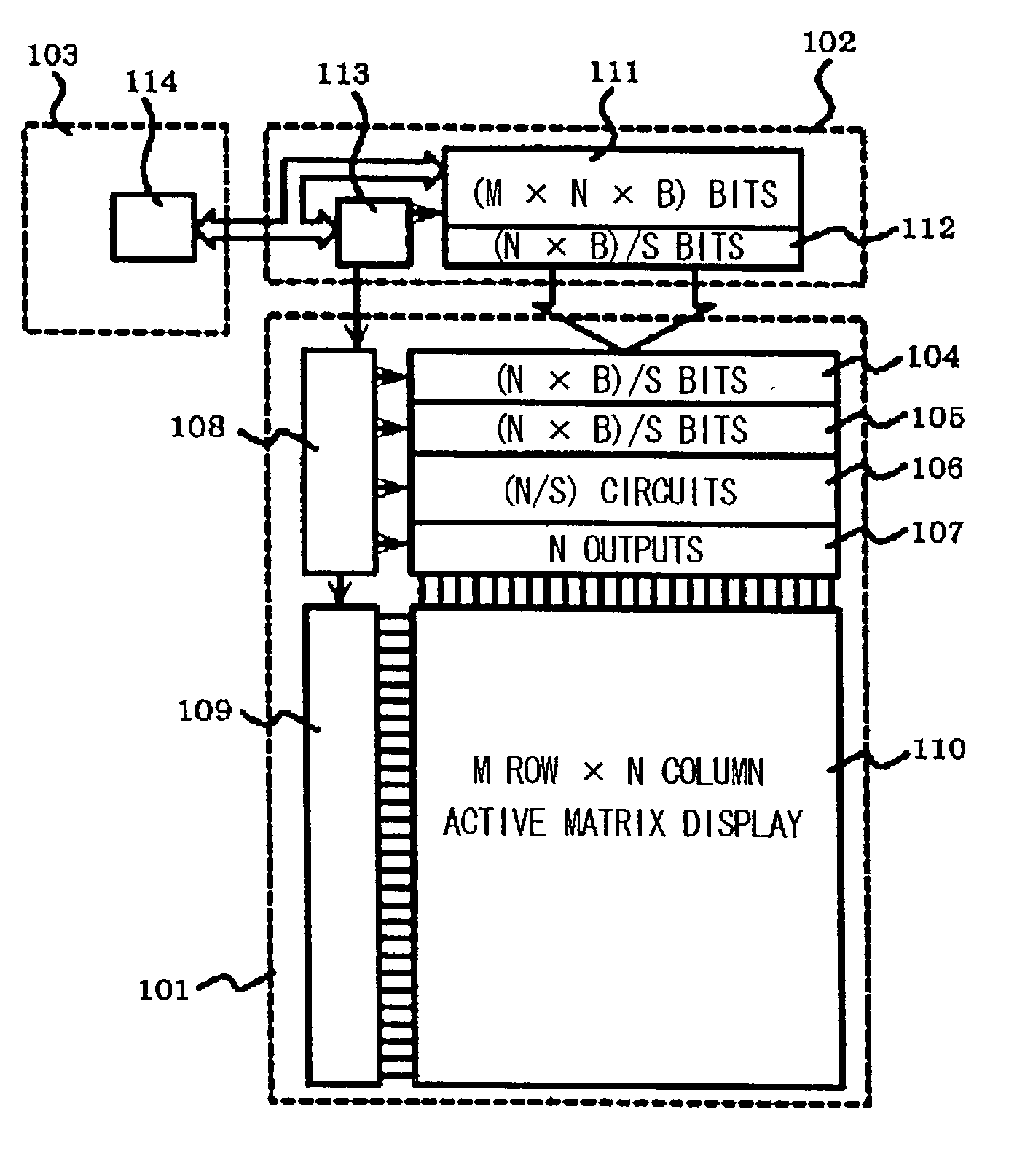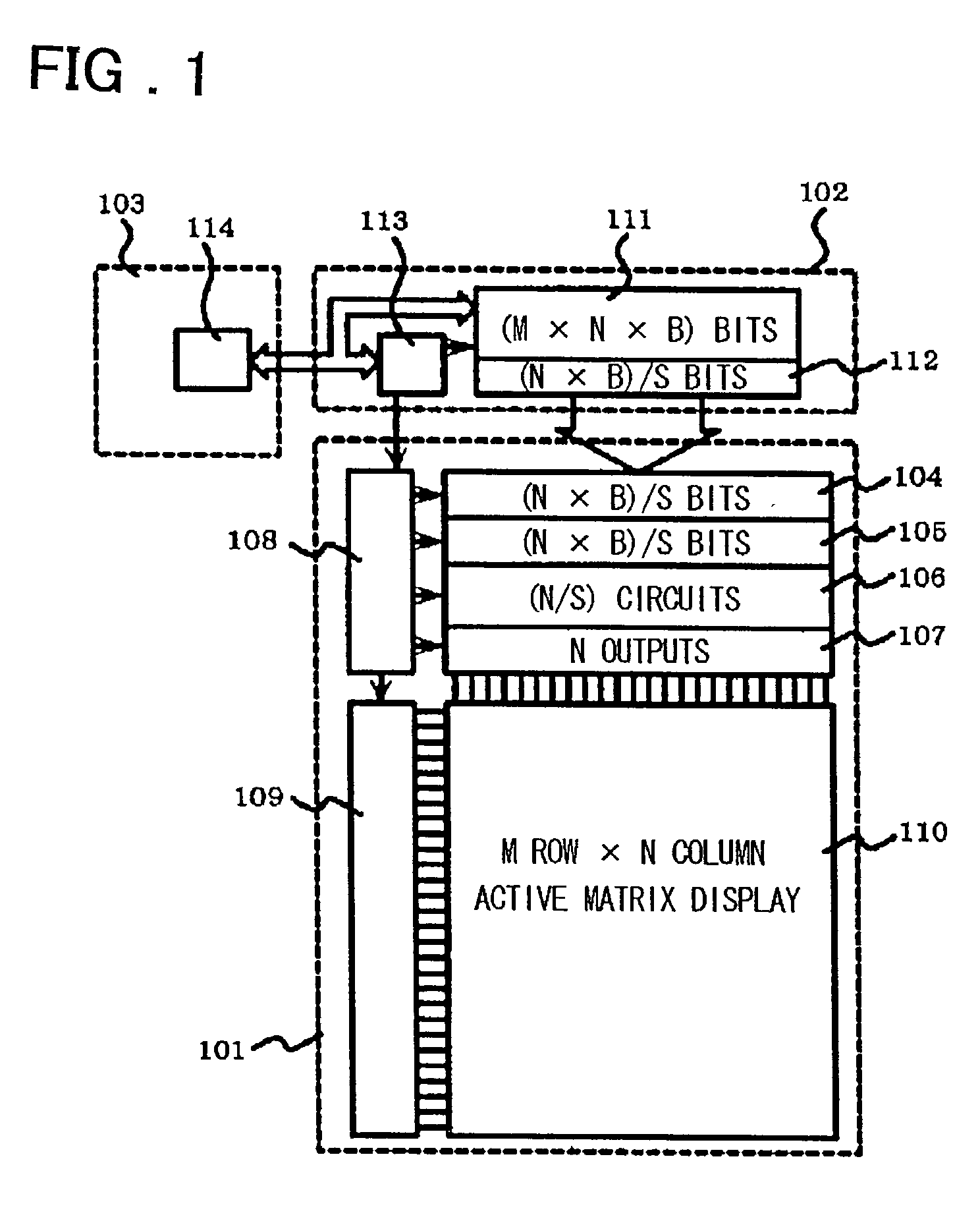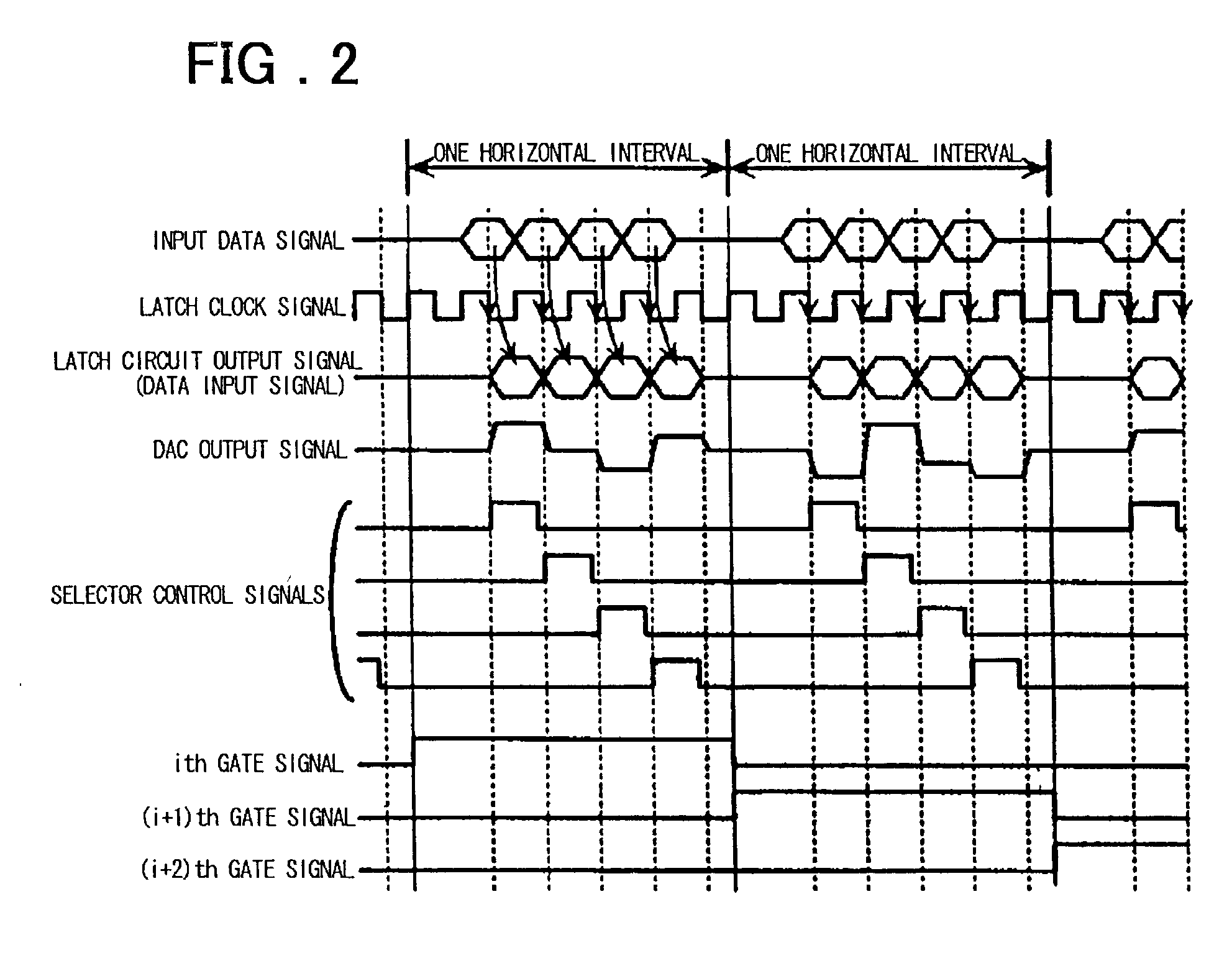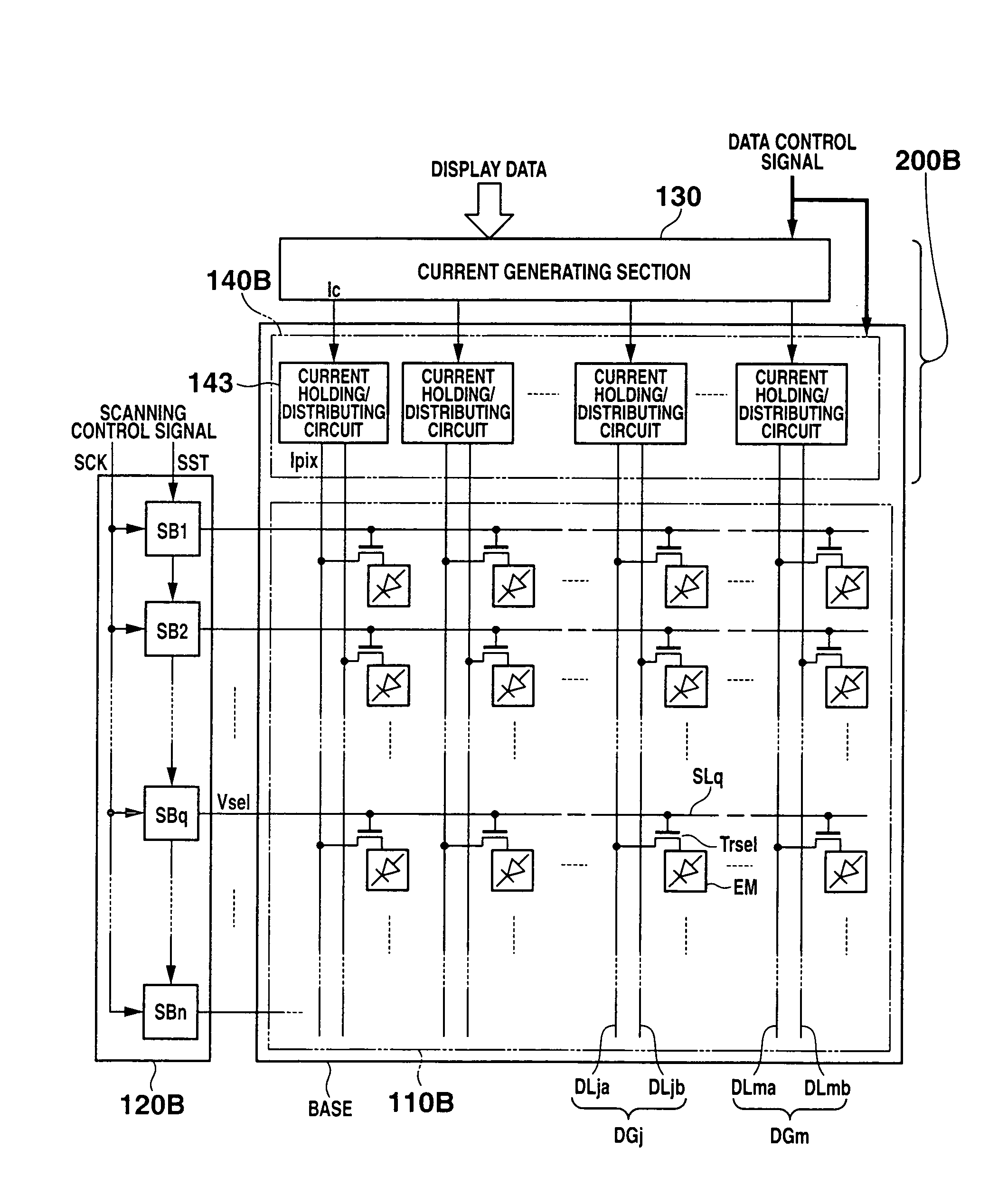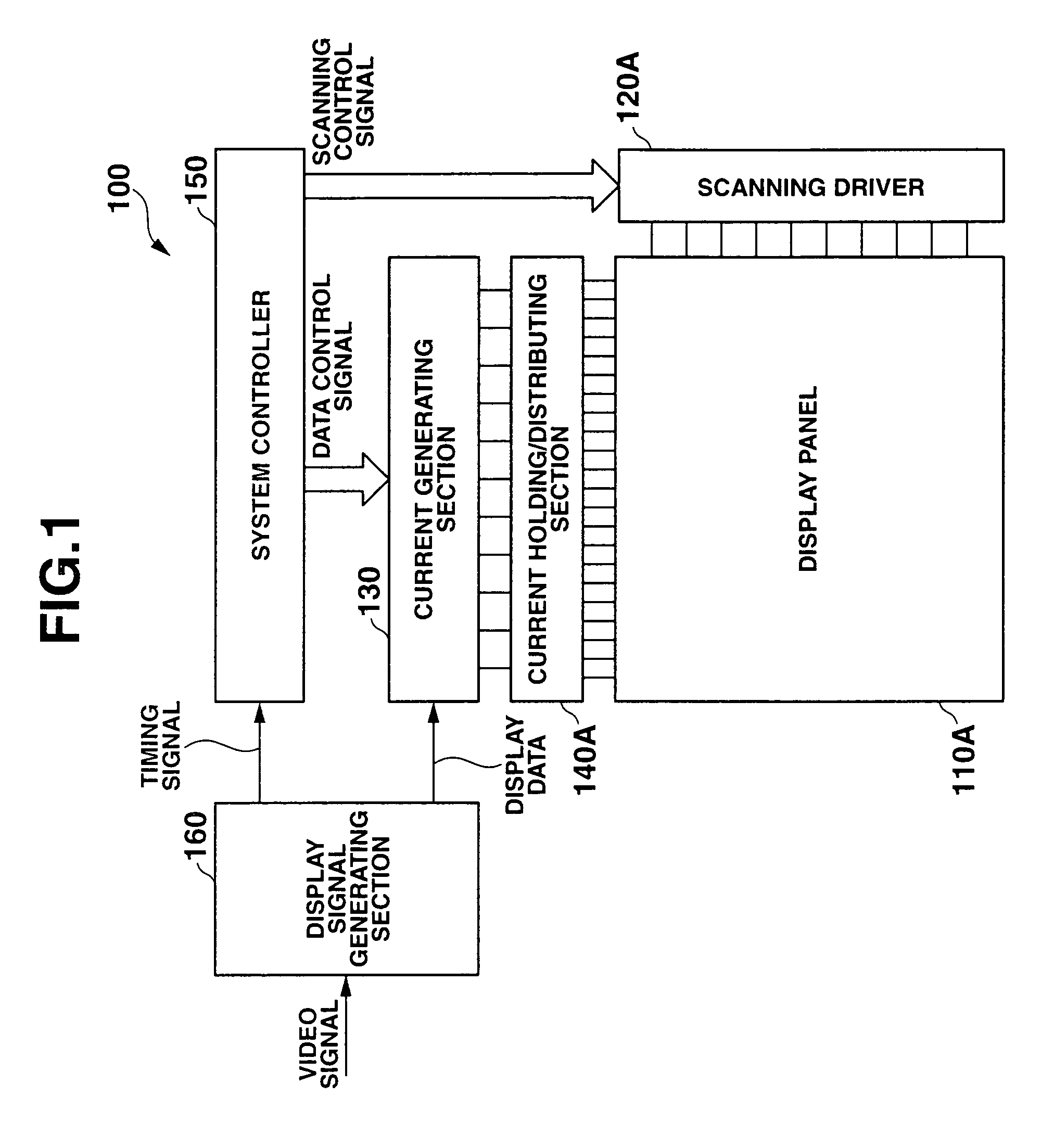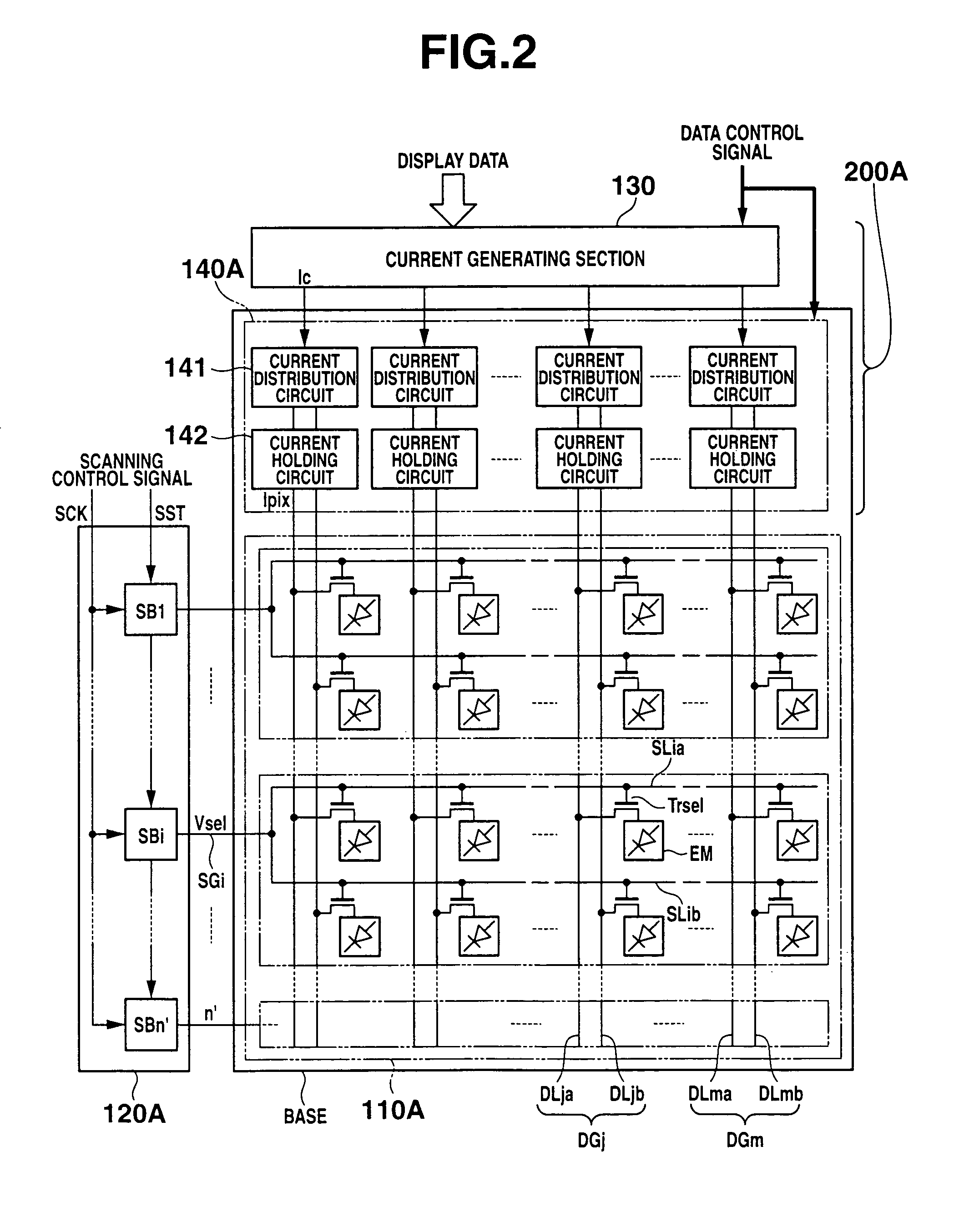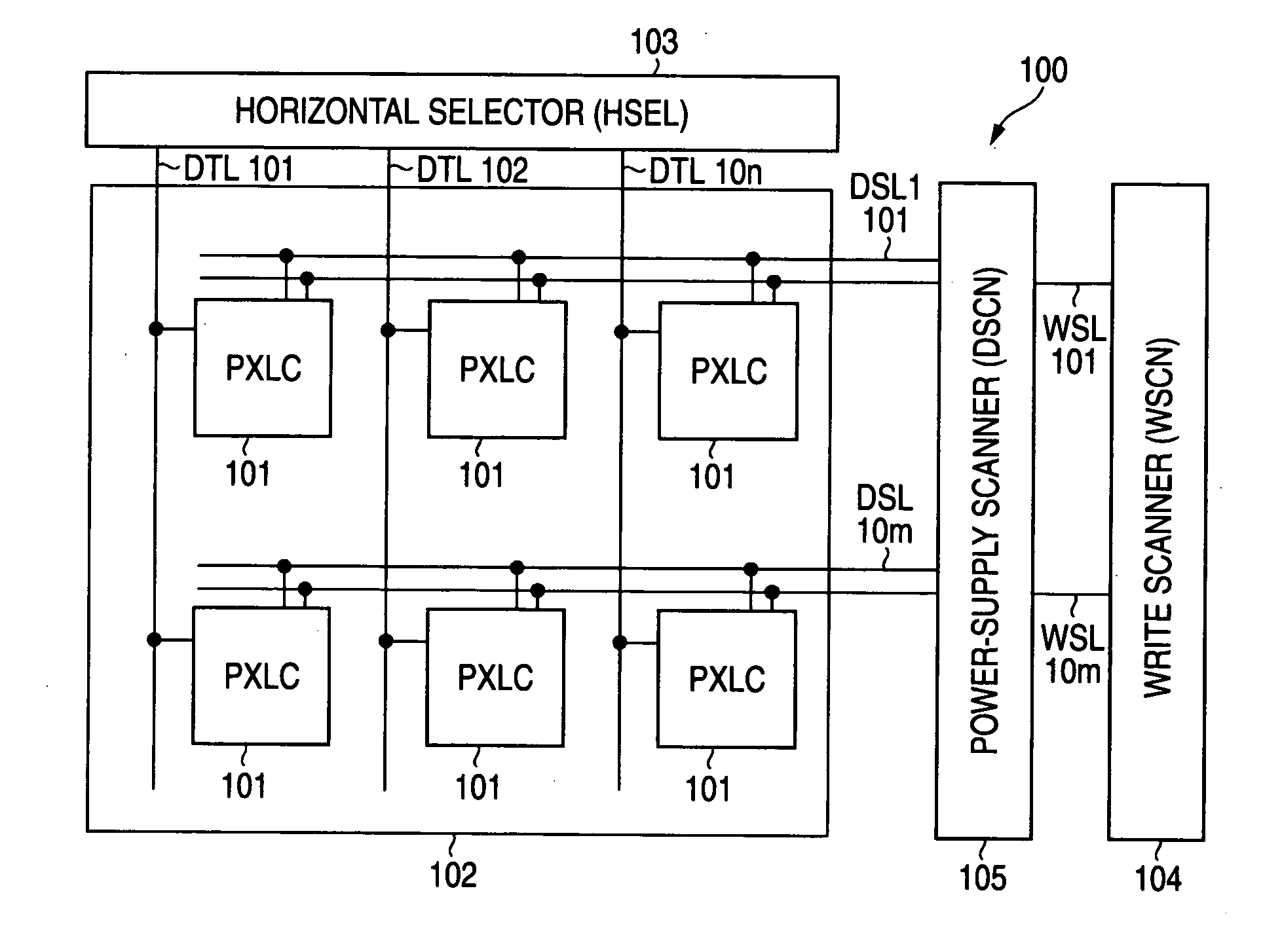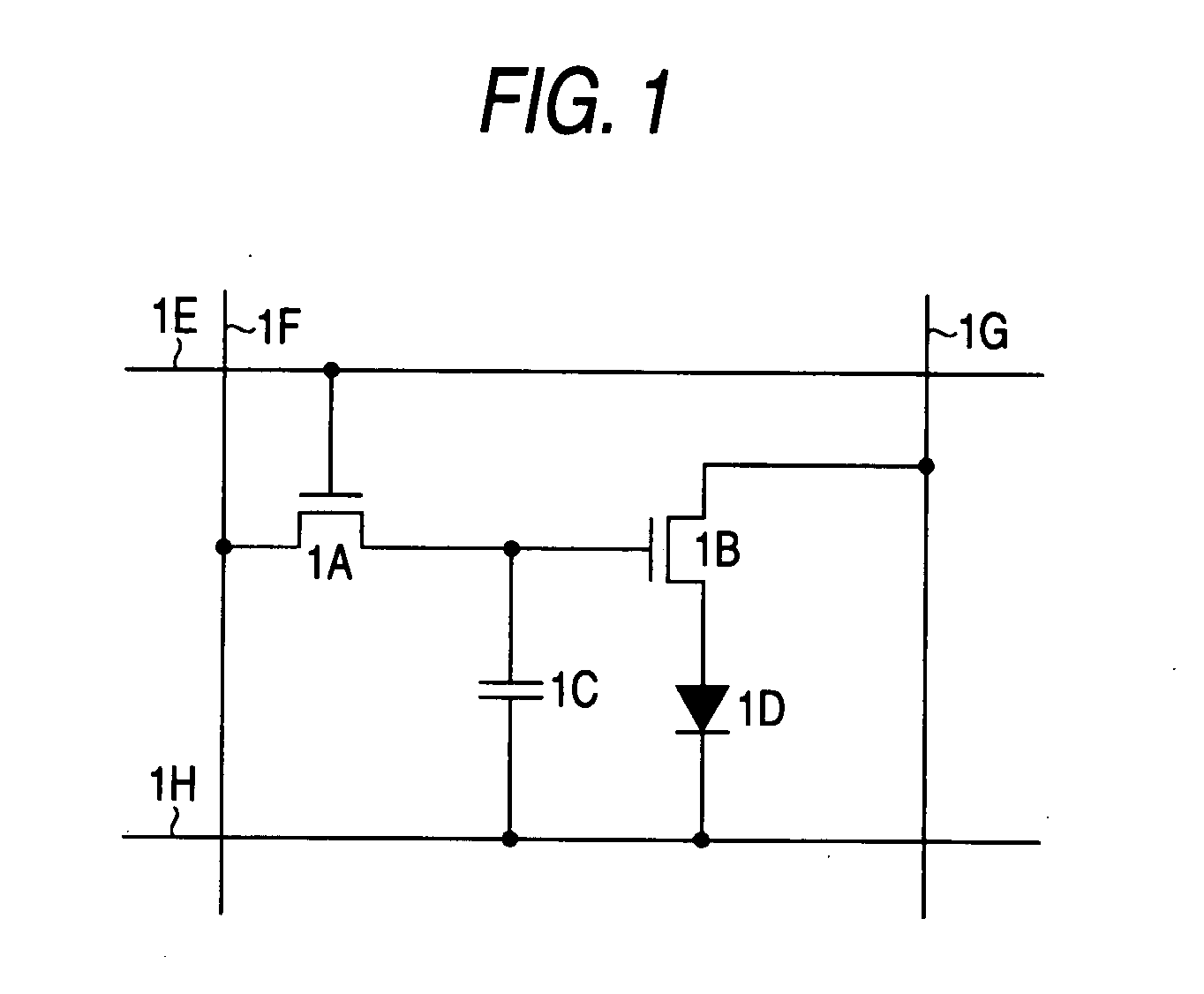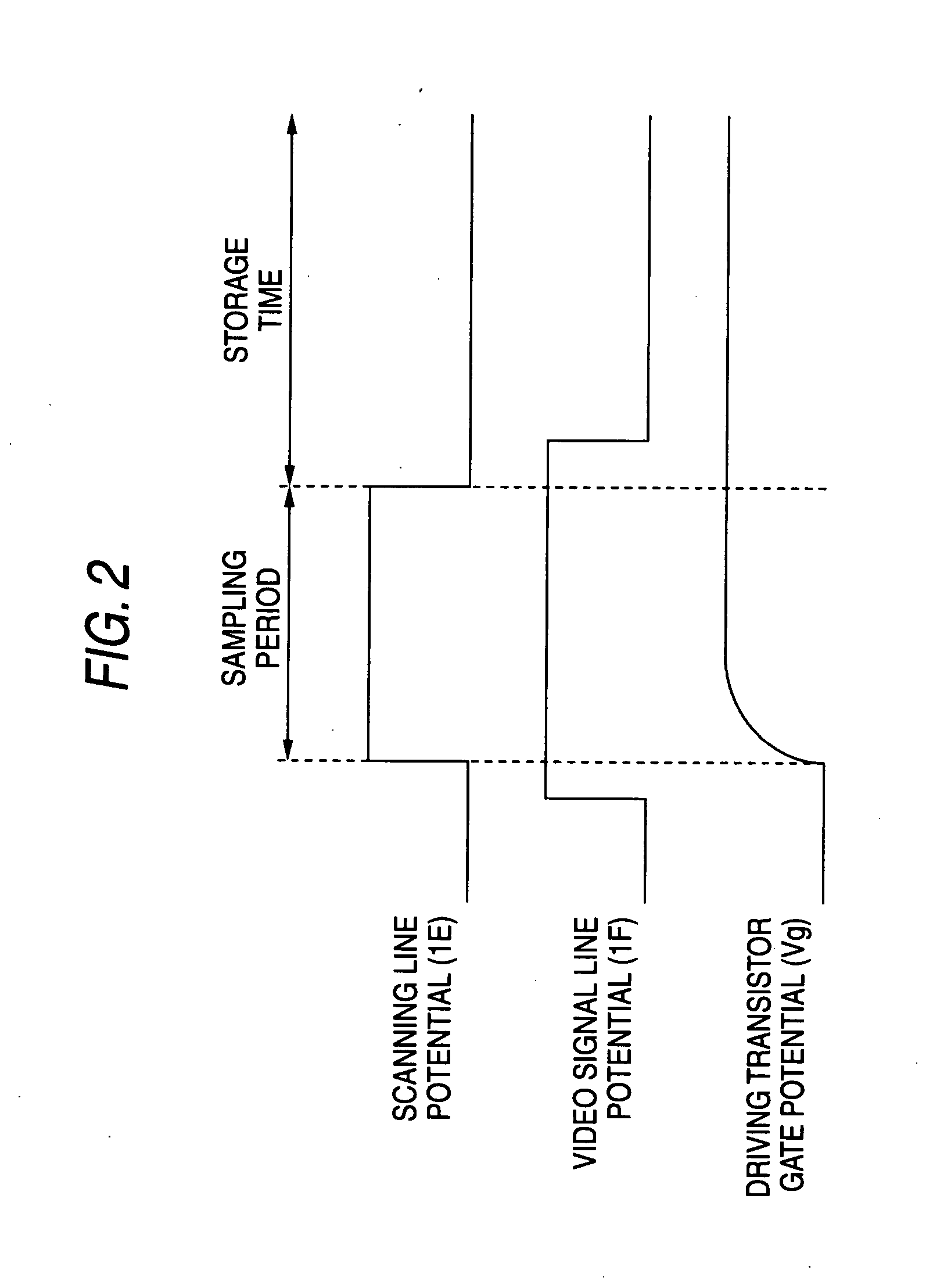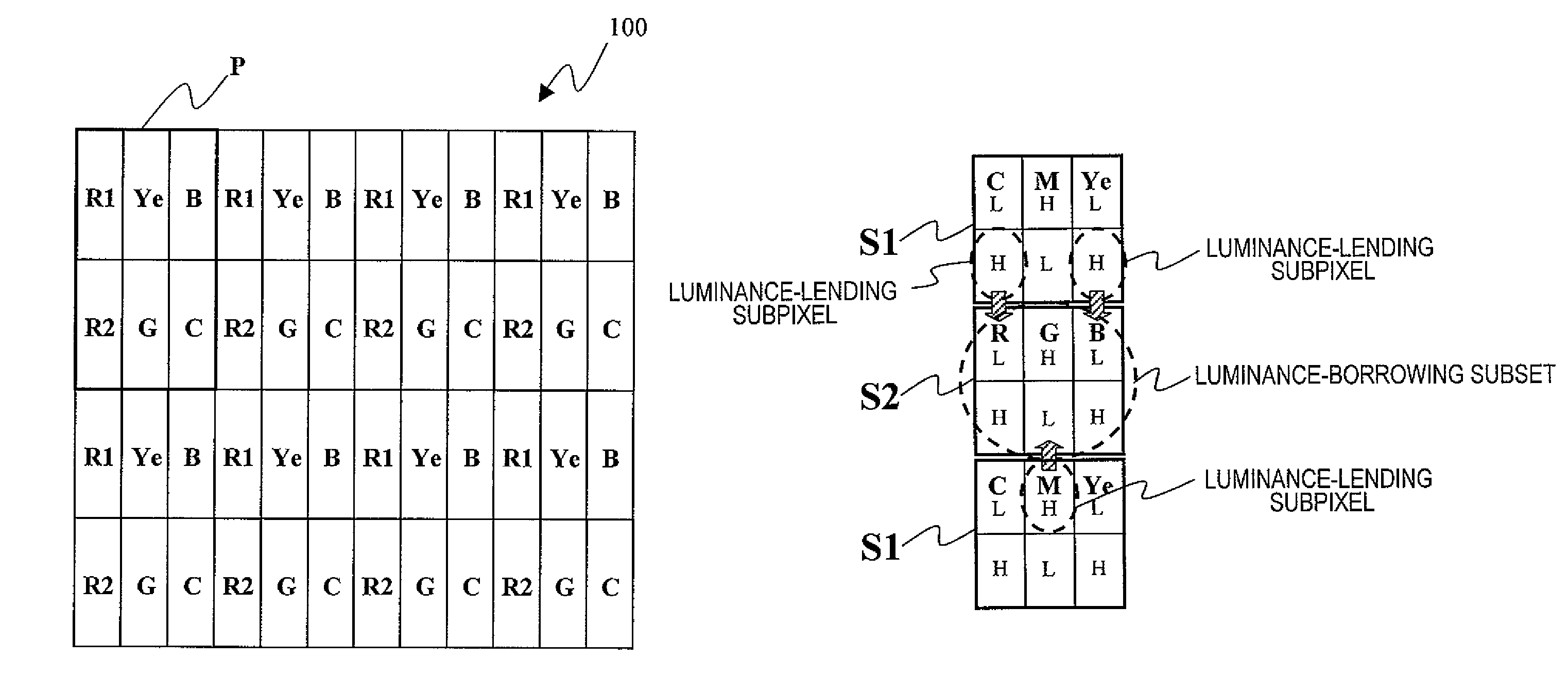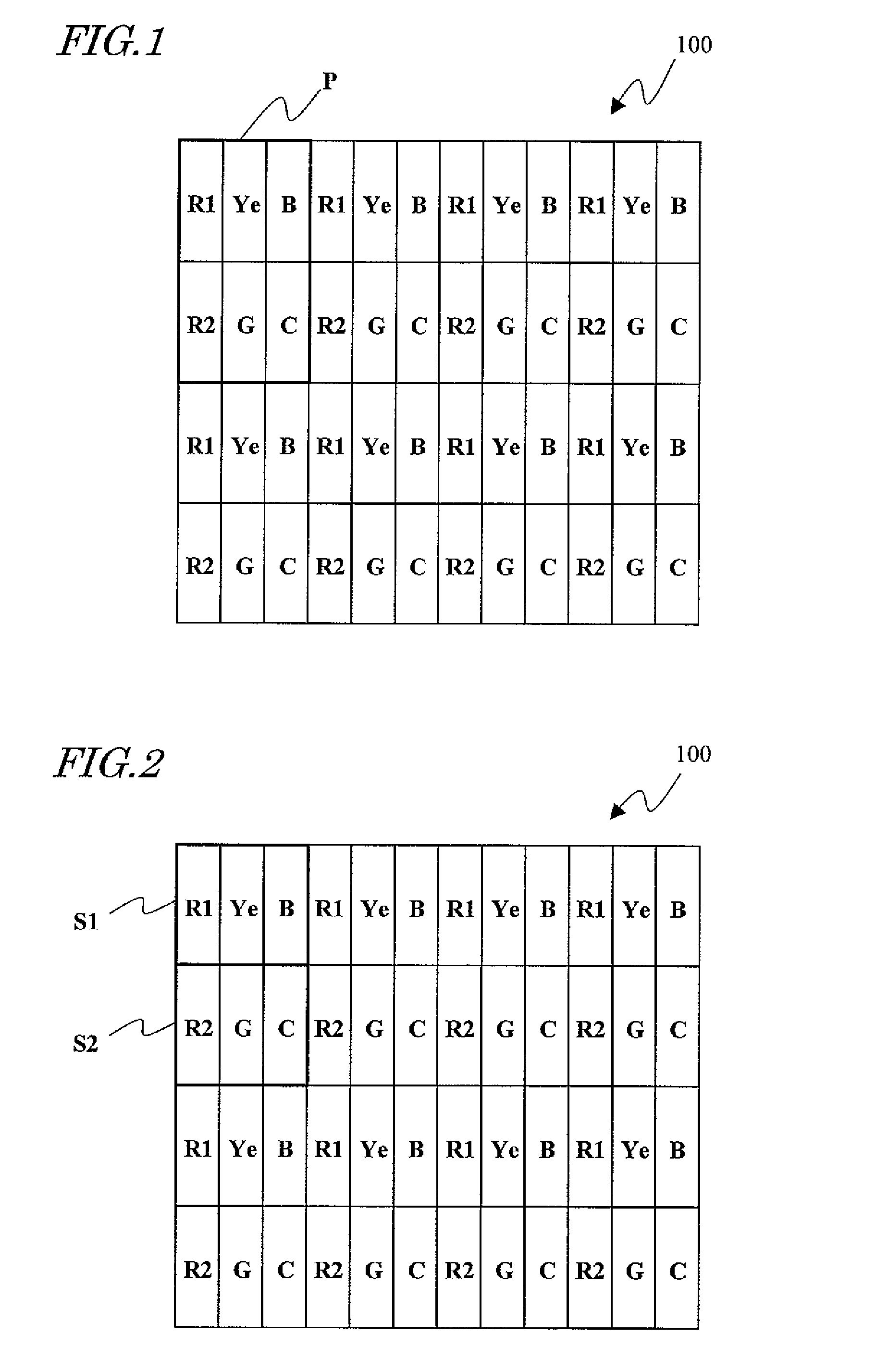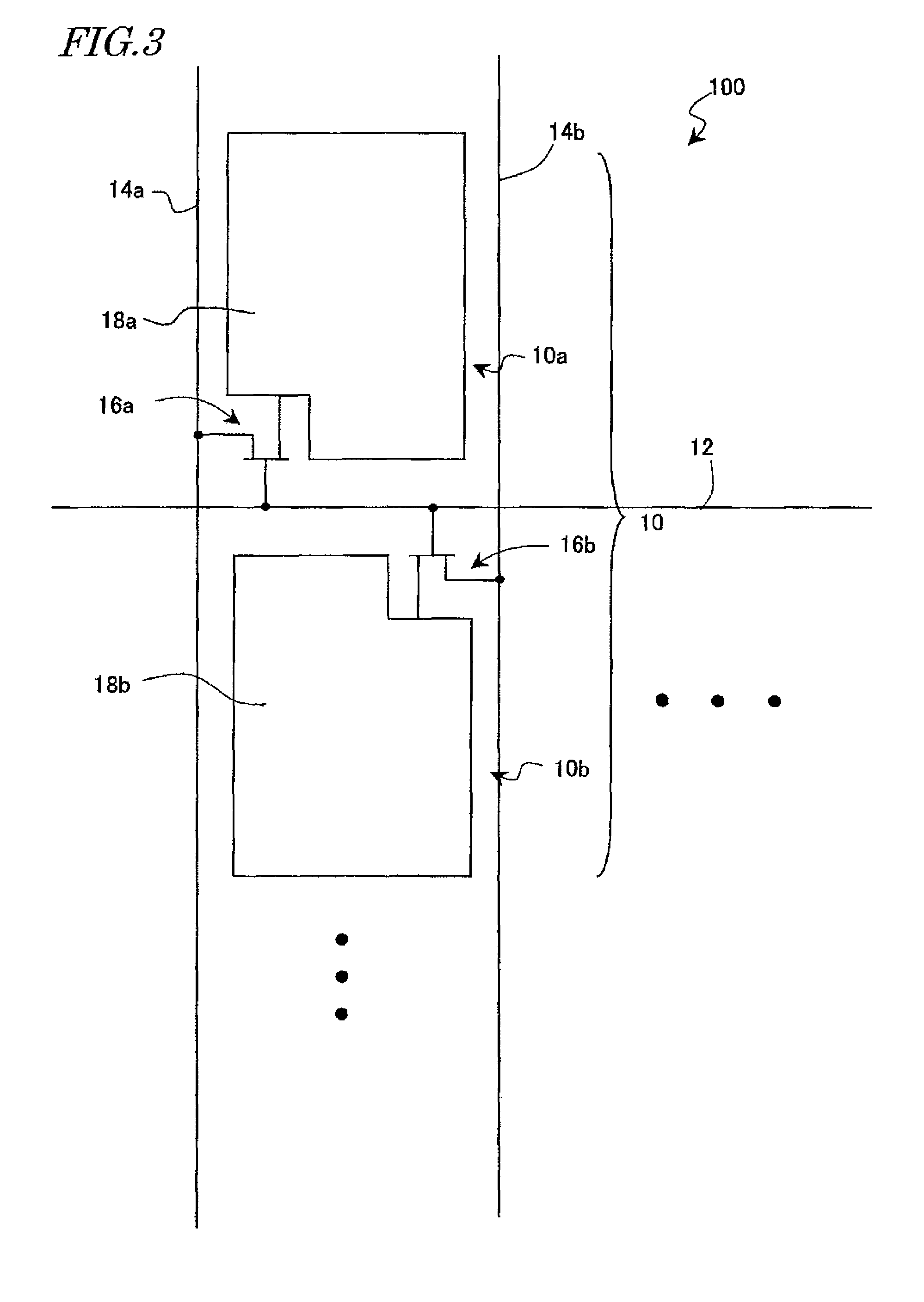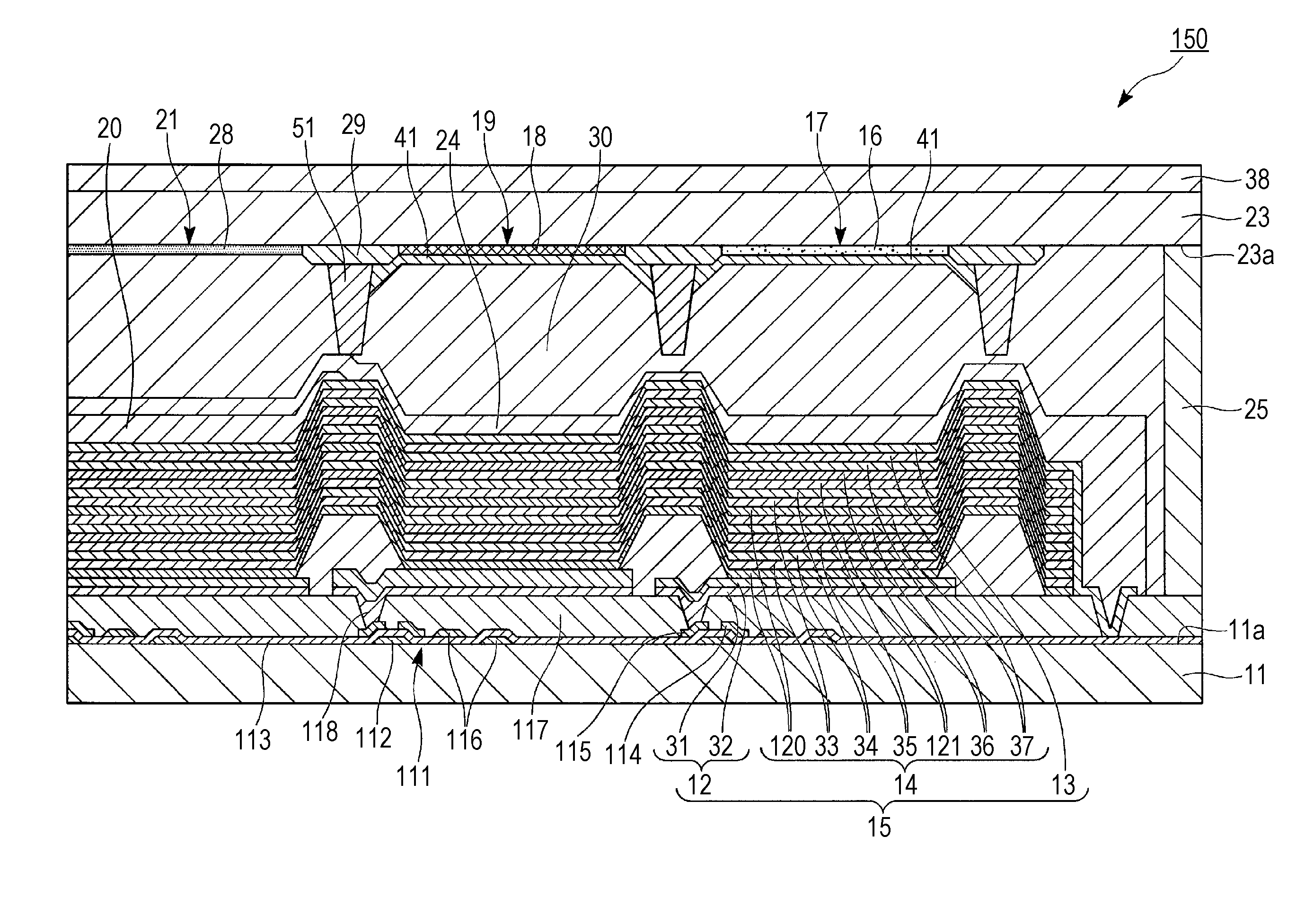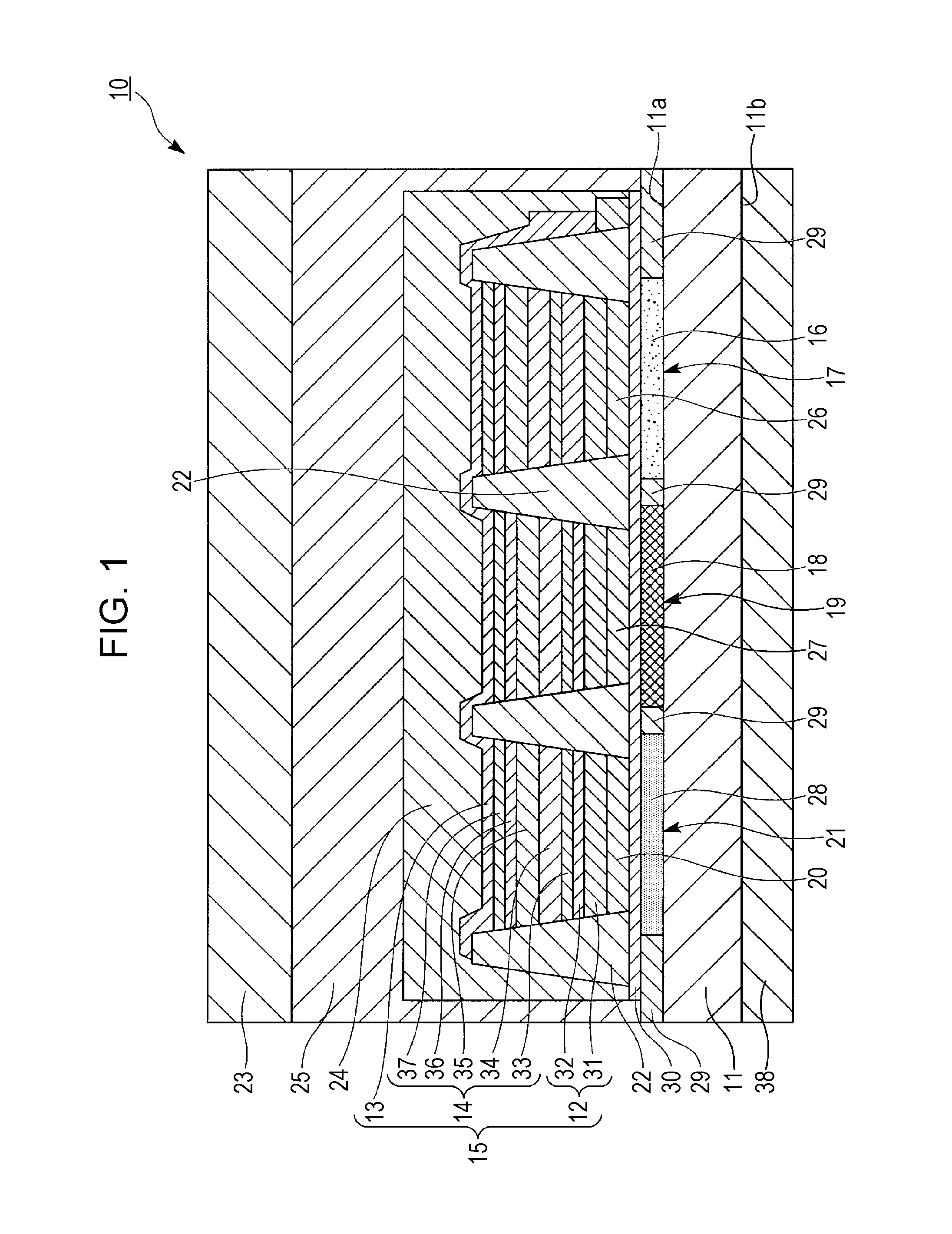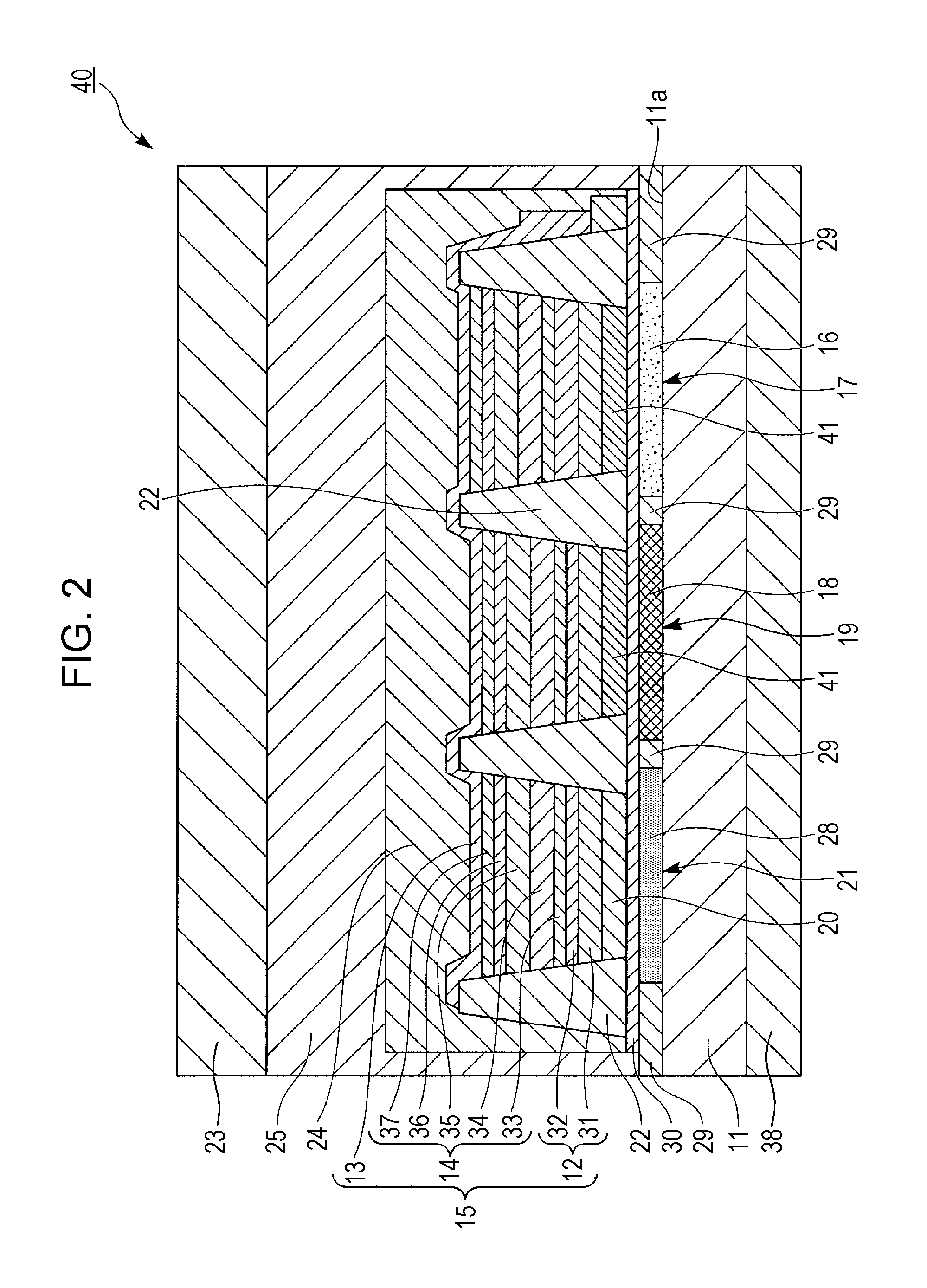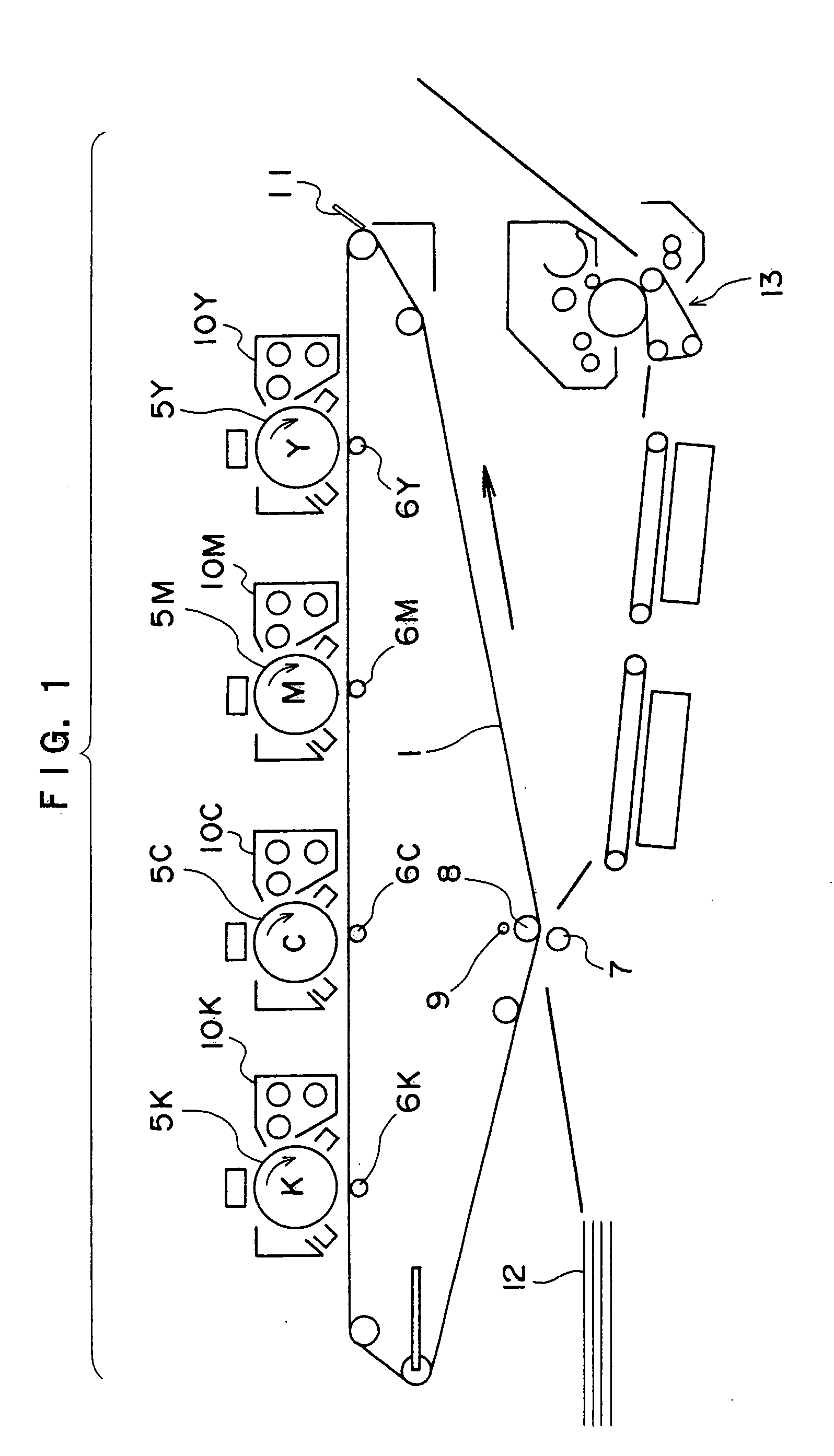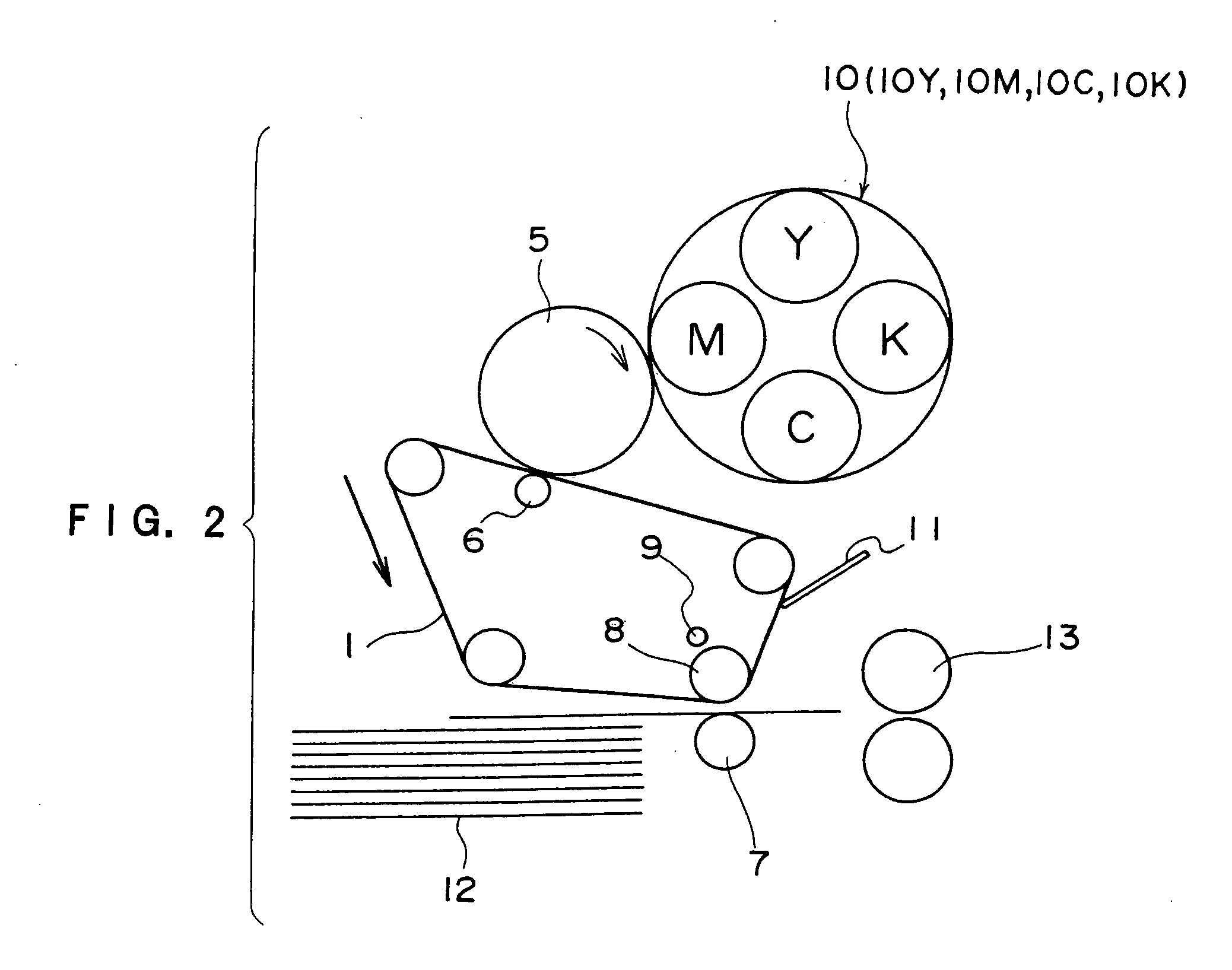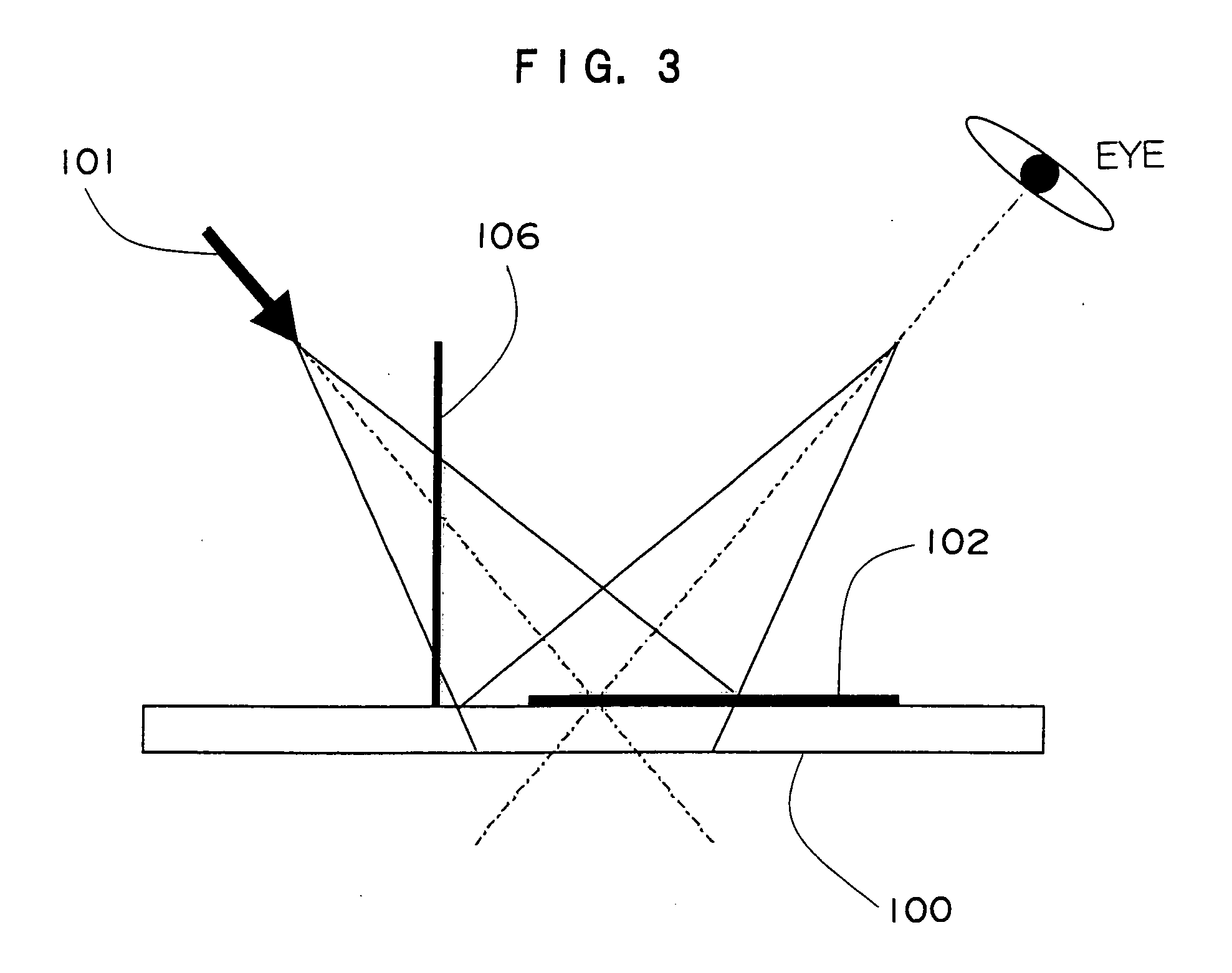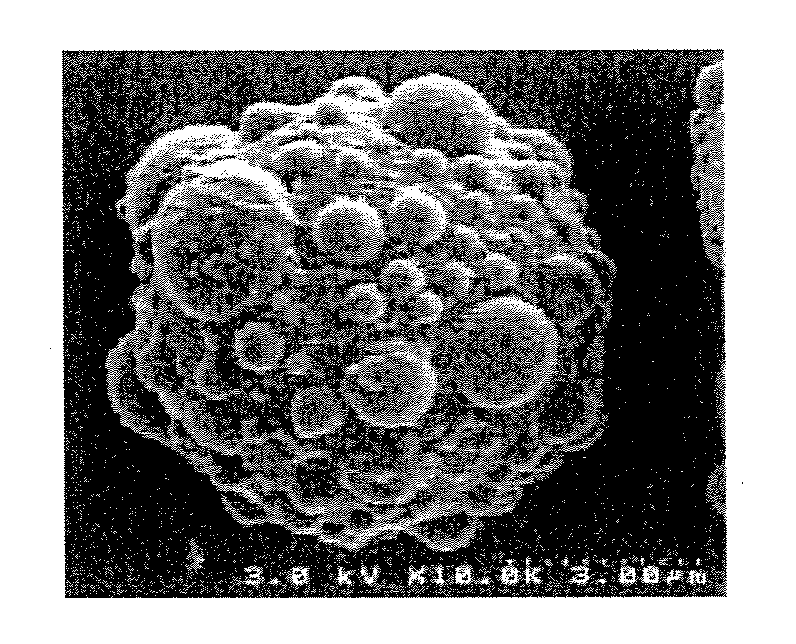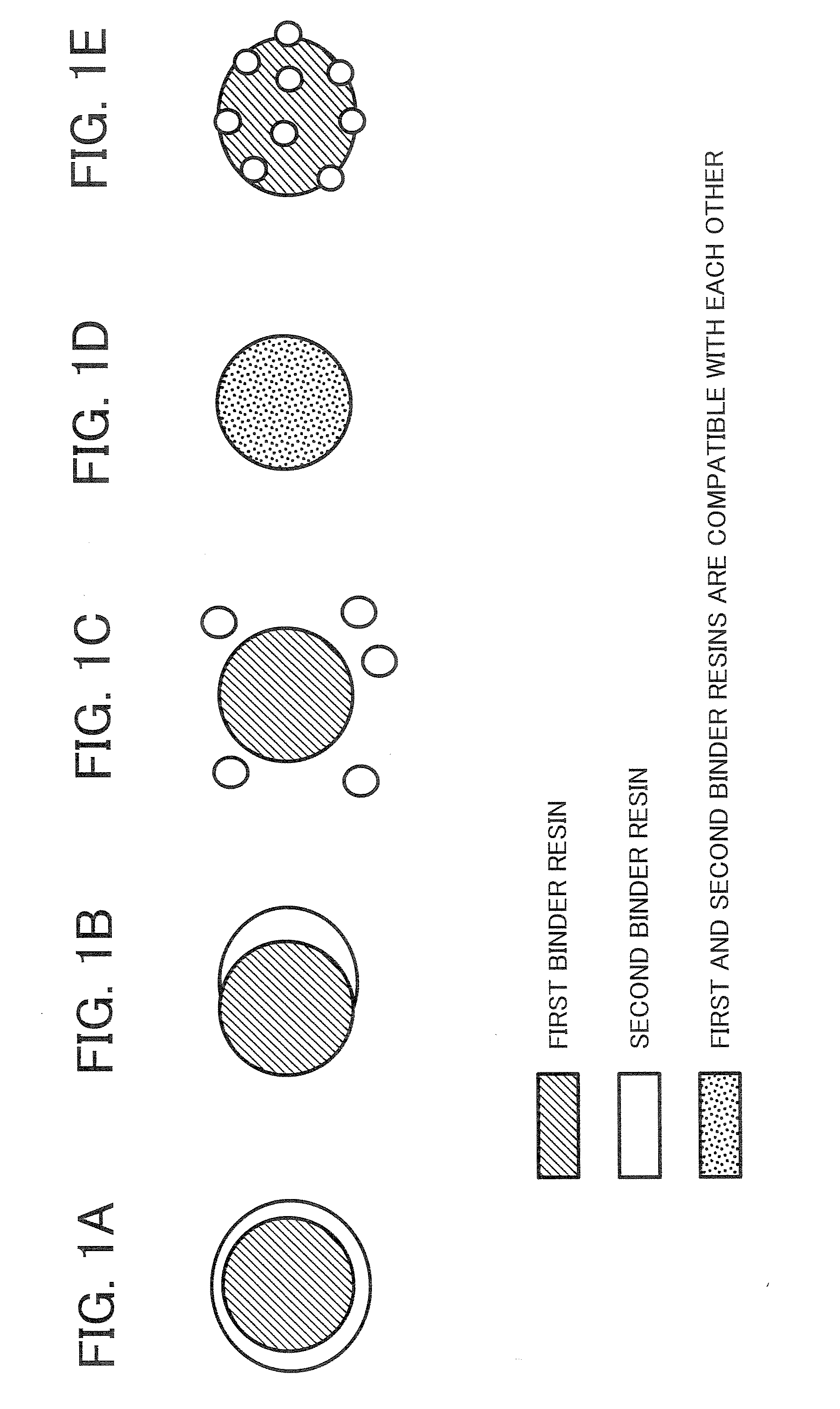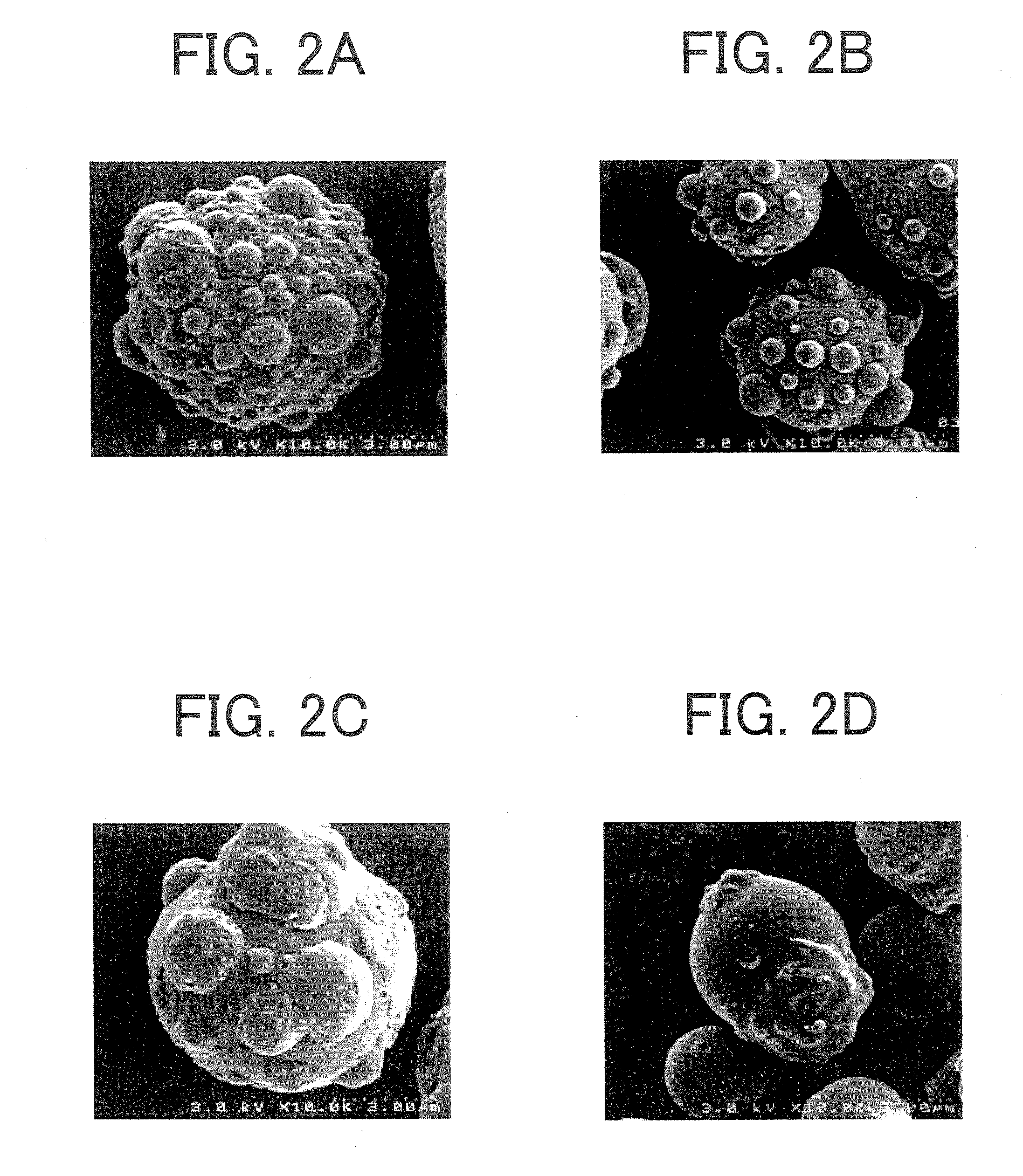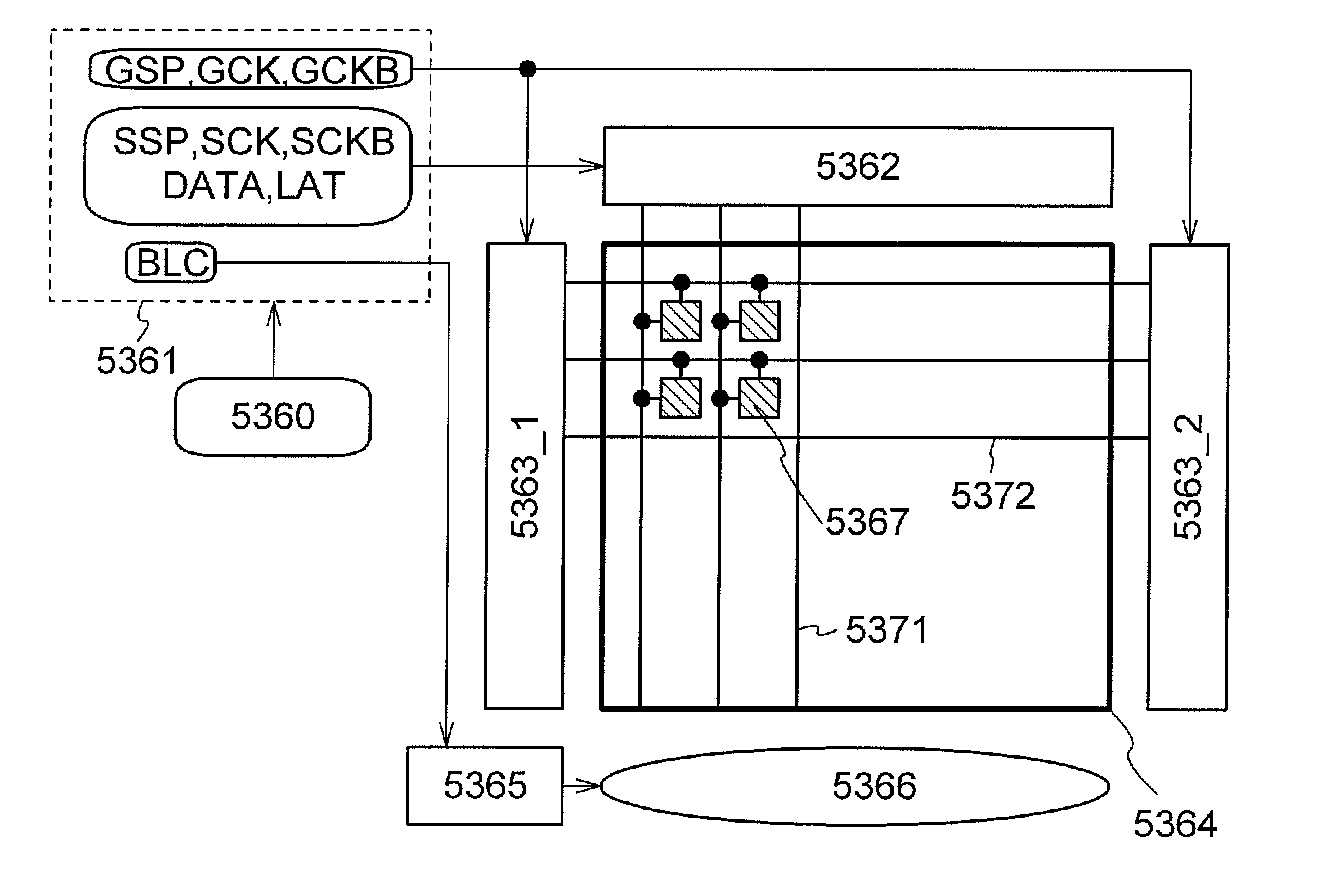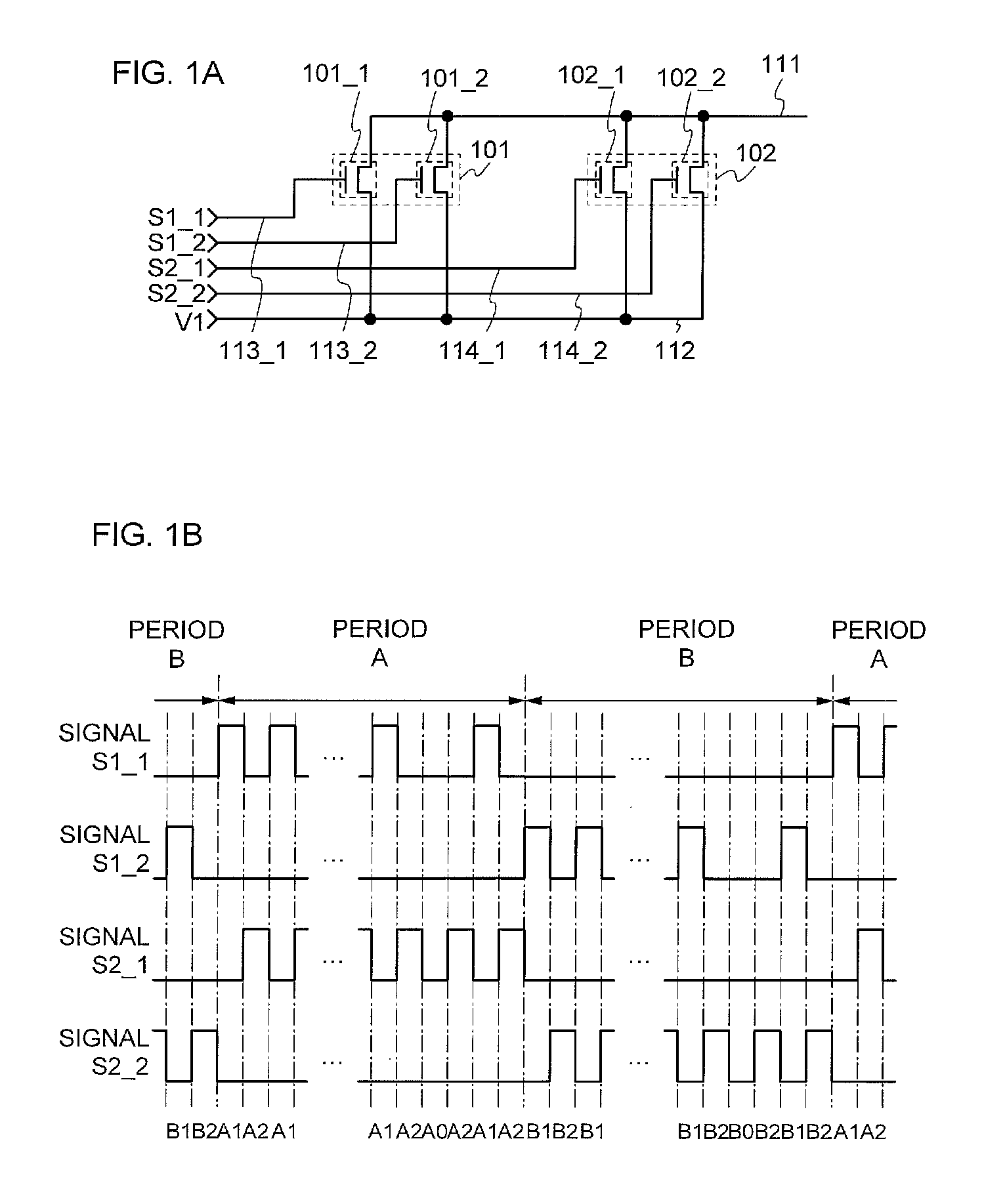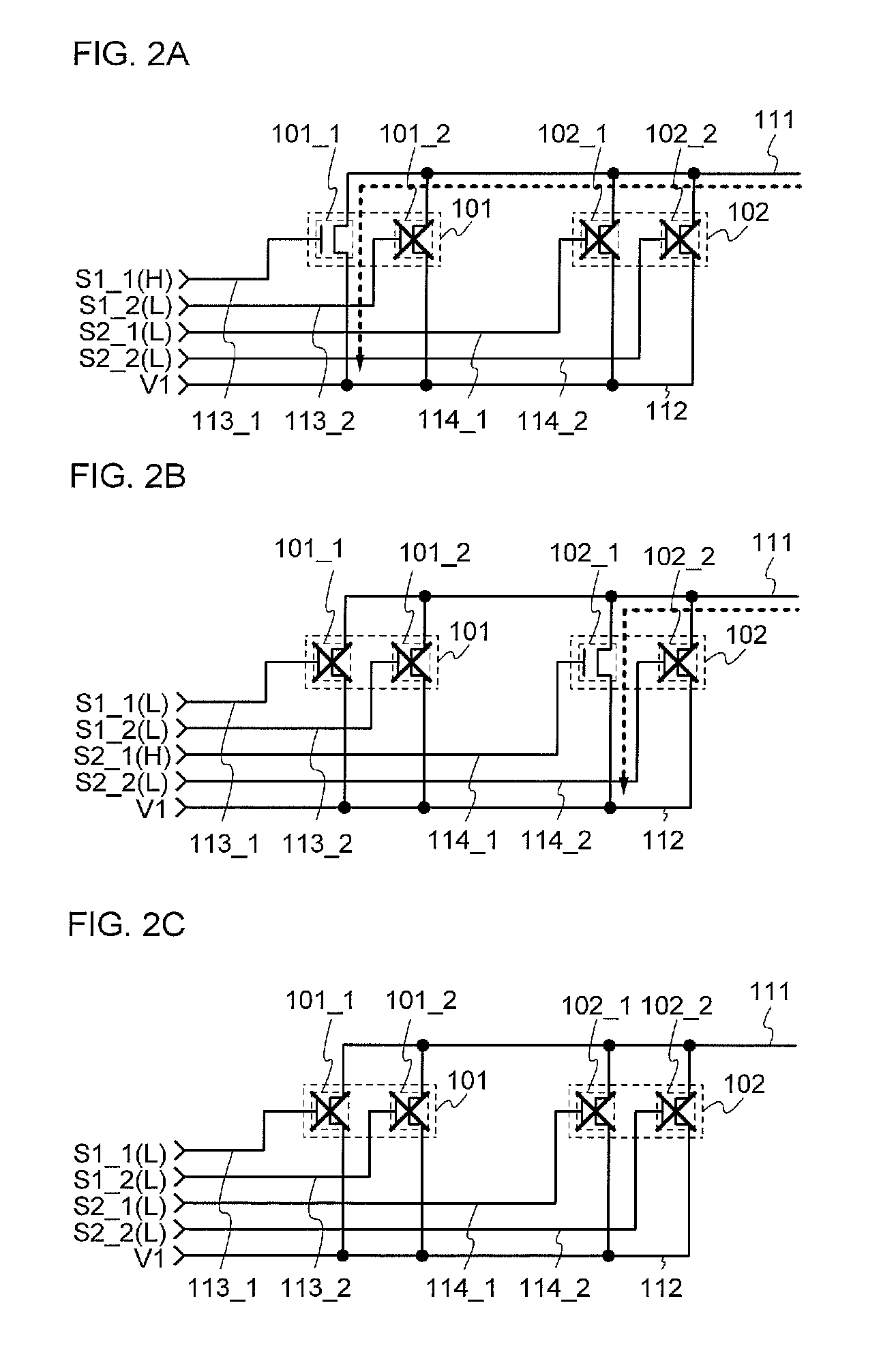Patents
Literature
701results about How to "High definition" patented technology
Efficacy Topic
Property
Owner
Technical Advancement
Application Domain
Technology Topic
Technology Field Word
Patent Country/Region
Patent Type
Patent Status
Application Year
Inventor
Optical Condition Design Method for a Compound-Eye Imaging Device
InactiveUS20100053600A1Cutting portionHigh definitionTelevision system detailsSolid-state devicesObservation pointHigh definition
An imaginary object plane is set in front of an imaging device body (plane setting step). A part of optical conditions of optical lenses are changed as variables, and positions of points (pixel observation points) on the imaginary object plane where lights coming from pixels of a solid-state imaging element and back-projected through the optical lenses are calculated (pixel observation point calculating step). The dispersion in position of the calculated pixel observation points is evaluated (evaluating step). Finally, a set of values of the variables giving maximum evaluated dispersion of the calculated pixel observation points is determined as optimum optical condition of the optical lenses (condition determining step). This reduces the number of pixels which image the same portions of the target object, making it possible to reduce portions of the same image information in multiple unit images, and to stably obtain a reconstructed image having a high definition.
Owner:FUNAI ELECTRIC CO LTD +1
Head mountable video display
InactiveUS7436568B1Easy to adjustQuality improvementPolarising elementsOptical light guidesVideo processingEyewear
The invention comprises a distributed direct retinal display projection system that can be fabricated as an embedded, integral part of an eyeglasses frame and can be configured to address a wide range of commercial, consumer and military applications. A system is described comprising a video processing module that may worn on a belt or carried in a pocket, which transmits an image through a multi-waveform optical cable that is configured with a wave guide per pixel.
Owner:KUYKENDALL JR JACOB L
Display device and method for manufacturing display device
InactiveUS20050140265A1Inhibit deteriorationImprove reliabilityDischarge tube luminescnet screensElectroluminescent light sourcesDisplay deviceSealant
An object of the present invention is to provide a highly reliable display device and a method for manufacturing the display device with a much easy way. According to one aspect of a method for manufacturing a display device of the invention, it comprises the steps of forming a light-emitting element over a first substrate; forming a frame to surround the light-emitting element; dropping a composition containing a liquid hygroscopic substance in a region surrounded with the frame; and forming a layer containing a hygroscopic substance by solidifying the composition, wherein the first substrate and a second substrate are adhered to each other with a sealant so that the light-emitting element, the layer containing a hygroscopic substance, and the frame are sealed between the pair of substrates.
Owner:SEMICON ENERGY LAB CO LTD
Manufacturing apparatus
InactiveUS20060011136A1High definitionIncrease opening ratioVacuum evaporation coatingSputtering coatingManufacturing cost reductionGas phase
It is an object of the present invention to provide a manufacturing apparatus that reduces a manufacturing cost by enhancing efficiency in the use of an EL material and that is provided with a vapor deposition apparatus which is one of manufacturing apparatuses superior in uniformity in forming an EL layer and in throughput in the case of manufacturing a full-color flat panel display using emission colors of red, green, and blue. According to one feature of the invention, a mask having a small opening with respect to a desired vapor deposition region is used, and the mask is moved accurately. Accordingly, a desired vapor deposition region is vapor deposited entirely. In addition, a vapor deposition method is not limited to movement of a mask, and it is preferable that a mask and a substrate move relatively, for example, the substrate may be moved at a μm level with the mask fixed.
Owner:SEMICON ENERGY LAB CO LTD
Semiconductor device and method for manufacturing the same
ActiveUS20110006302A1Easily brokenIncrease opening ratioTransistorSolid-state devicesDisplay deviceMoisture
It is an object to manufacture and provide a highly reliable display device including a thin film transistor with a high aperture ratio which has stable electric characteristics. In a manufacturing method of a semiconductor device having a thin film transistor in which a semiconductor layer including a channel formation region is formed using an oxide semiconductor film, a heat treatment for reducing moisture and the like which are impurities and for improving the purity of the oxide semiconductor film (a heat treatment for dehydration or dehydrogenation) is performed. Further, an aperture ratio is improved by forming a gate electrode layer, a source electrode layer, and a drain electrode layer using conductive films having light transmitting properties.
Owner:SEMICON ENERGY LAB CO LTD
Display apparatus using oxide semiconductor and production method thereof
ActiveUS8164256B2Drive stabilityHigh definitionDischarge tube luminescnet screensLamp detailsHydrogenEngineering
A display apparatus includes a light-emitting layer, a pair of electrodes sandwiching the light-emitting layer, a transistor with an active layer for driving the light-emitting layer through the pair of the electrodes, and a matrix wiring portion having a scanning electrode line, a signal electrode line, and a first insulating layer. The active layer has an oxide which contains In and Zn and at least a part of which is amorphous, and further includes a second insulating layer containing hydrogen in an amount of less than 3×1021 atoms / cm3 disposed between the active layer and the first insulating layer.
Owner:CANON KK
Display device and method for manufacturing the same
InactiveUS20090078939A1Improve performanceIncrease the aperture ratioTransistorSolid-state devicesMicrofabricationDisplay device
To provide a display device which can realize high performance of a field-effect transistor which forms a pixel of the display device and which can achieve improvement in an aperture ratio of a pixel, which has been reduced due to increase in the number of field-effect transistors, and reduction in the area of the field-effect transistor which occupies the pixel, without depending on a microfabrication technique of the field-effect transistor, even when the number of field-effect transistors in the pixel is increased. A display device is provided with a plurality of pixels in which a plurality of field-effect transistors including a semiconductor layer which is separated from a semiconductor substrate and is bonded to a supporting substrate having an insulating surface are stacked with a planarization layer interposed therebetween.
Owner:SEMICON ENERGY LAB CO LTD
Generating, viewing, interpreting, and utilizing a quantitative database of metabolites
InactiveUS20040143461A1High physical propertyImproved physical propertyData processing applicationsData visualisationDrugLipid metabolism
This disclosure provides methods for the creation of a quantitative database of metabolites, particularly lipid metabolites, using chromatographic technology; methods for assembling that information into a visual format for interpretation, and methods of this information to identify and understand metabolome-wide effects, for instance those effects influenced by pharmaceuticals, genes, toxins, diet or the environment. Also provided are metabolite databases, such as lipid metabolite databases, that are stored on a computer readable medium, which include quantitative measurements of a plurality of metabolites.
Owner:TETHYS BIOSCI
Process and system for printing images on absorptive surfaces
InactiveUS20070103529A1High definitionHigh resolutionDuplicating/marking methodsInksFiberColor image
A novel process for printing high quality, high resolution, multi-color images on fibrous or porous materials or other ink absorbing materials, or on materials having high surface tension with a liquid ink, and especially over garments, is disclosed. The process is effected by applying a wetting composition, prior to, concomitant with and / or subsequent to applying an ink composition and formation of the images. Pre-printing and printing systems for executing the above process are further disclosed.
Owner:KORNIT DIGITAL LTD
System for aperturing and coaperturing webs and web assemblies
InactiveUS6837956B2Reduce distortionReduce frictionLamination ancillary operationsLaminationEngineeringMechanical engineering
Improved aperturing of a web can be obtained by providing pins with an extended tapered section that is substantially convex in shape. When the tapered section is longer than the penetration depth of the pins into the receiving recesses of a female roll, frictional forces in the nip between layers are reduced. Pins with extended tapered sections can be used in devices for producing apertured composite web assemblies comprising sections of absorbent matter attached to a nonwoven web or other carrier layer.
Owner:KIMBERLY-CLARK WORLDWIDE INC
Low cost 3D radar imaging and 3D association method from low count linear arrays for all weather autonomous vehicle navigation
A low cost, all weather, high definition RF radar system for an autonomous vehicle is described. The high definition RF radar system generates true target object data suitable for imaging, scene understanding, and all weather navigation of the autonomous vehicle. The high definition RF radar system includes a pair of independent orthogonal linear arrays. Data from both linear arrays is fed to a processor that performs data association to form true target detections and target positions. A Boolean association method for determining true target detections and target positions reduces many of the ghosts or incorrect detections that can produce image artifacts. The high definition RF radar system provides near optimal imaging in any dense scene for autonomous vehicle navigation, including during visually obscured weather conditions such as fog.
Owner:RFNAV INC
Projection apparatus
ActiveUS20170010473A1High definitionProjectorsPicture reproducers using projection devicesLaser beamsInstrumentation
Provided is a projection apparatus for projecting an image which can be seen stereoscopically, wherein the apparatus is made smaller and the definition of the projected image is higher than would be the case if the present configuration were not employed. The projection apparatus is an apparatus for projecting an image which can be seen stereoscopically, by scanning with one set of at least red, green, and blue laser beams, and includes a light source section that emits the laser beams, a scan section that scans a projection region two-dimensionally with the laser beams, and a microlens array that includes microlenses on which the laser beams from the scan section are incident and that changes emission angles of the laser beams in accordance with incident positions of the laser beams on the microlenses to create a light ray field in which light rays whose positions and directions are controlled are emitted from each point on surfaces of the microlenses in accordance with an image to be projected.
Owner:CITIZEN WATCH CO LTD
Video coding
ActiveUS20120169923A1High definitionPulse modulation television signal transmissionPicture reproducers using cathode ray tubesHigh-definition televisionPattern recognition
Techniques are discussed for providing mechanisms for coding and transmitting high definition video, e.g., over low bandwidth connections. In particular, foreground-objects are identified as distinct from the background of a scene represented in a plurality of video frames received from a video source, such as a camera. In identifying foreground-objects, semantically significant and semantically insignificant movement (e.g., repetitive versus non-repetitive movement) is differentiated. Processing of the foreground-objects and background proceed at different update rates or frequencies.
Owner:PELCO INC
Light emitting device and electronic apparatus
ActiveUS20090195144A1Easy to makeEasy to manufactureDischarge tube luminescnet screensLamp detailsLight emitting deviceElectron
A light emitting device includes a substrate, a plurality of light emitting elements that is formed on the substrate, and a partition wall layer that is formed on the substrate so as to form a plurality of opening parts in the plan view. Each of the plurality of light emitting elements includes a pixel electrode, an opposing electrode, and a light emitting function layer interposed between the pixel electrode and the opposing electrode. One of the light emitting function layers is formed to be assigned to each of the plurality of opening parts, and a plurality of the pixel electrodes is formed to be fitted into each of the plurality of opening parts. One pixel of the light emitting device includes the light emitting element that includes at least one of the pixel electrodes fitted into one of the plurality of opening parts, and at least one of the pixel electrodes that is fitted into the one of the plurality of opening parts that is adjacent to each other.
Owner:SEIKO EPSON CORP
Element with expansible relief
InactiveUS6877986B2High resolutionLow costFluid-pressure actuator componentsTeaching apparatusRegular patternBiomedical engineering
An element (10) comprises sealed cavities (24) arranged according to a regular pattern. Each cavity (24) contains a product such as a wax which changes in volume, in reversible fashion, when a given temperature threshold is crossed, together with an individual heating organ (26). The cavities (24) are separated from the front face (10a) of the element by a mobile or deformable organ (38). A separate piloting for each of the heating organs (26) makes it possible to make the relief of the front face (10a) of the element evolve in controlled fashion. Such an element can be used to re-transcribe, in relief, tactile (visually handicapped) or visual information.
Owner:INTELLECTUAL VENTURES FUND 83 LLC
Semiconductor device and manufacturing method thereof
ActiveUS20070085475A1Reduce the number of stepsAvoid defectsDischarge tube luminescnet screensElectroluminescent light sourcesEvaporationMiniaturization
As a result of miniaturization of a pixel region associated with an improvement in definition and an increase in a substrate size associated with an increase in area, defects due to precision, bending, and the like of a mask used at the time of evaporation have become issues. A partition including portions with different thicknesses over a pixel electrode (also referred to as a first electrode) in a display region and in the vicinity of a pixel electrode layer is formed, without increasing the number of steps, by using a photomask or a reticle provided with an auxiliary pattern having a light intensity reduction function made of a diffraction grating pattern or a semi-transmissive film.
Owner:SEMICON ENERGY LAB CO LTD
Distributed Architecture for Encoding and Delivering Video Content
ActiveUS20130343450A1Avoid burdenEasy to useColor television with pulse code modulationColor television with bandwidth reductionSide informationImage resolution
A split architecture for encoding a video stream. A source encoder may encode a video content stream to obtain an encoded bitstream and a side information stream. The side information stream includes information characterizing rate and / or distortion estimation functions per block of the video content stream. Also, a different set of estimation functions may be included per coding mode. The encoded bitstream and side information stream may be received by a video transcoder, which transcodes the encoded bitstream to a client-requested picture resolution, according to a client-requested video format and bit rate. The side information stream allows the transcoder to efficient and compactly perform rate control for its output bitstream, which is transmitted to the client device. This split architecture may be especially useful to operators of content delivery networks.
Owner:COHERENT LOGIX
Method for manufacturing toner and toner
InactiveUS20080063971A1Efficient productionSmall particle sizeDevelopersLiquid spraying apparatusSolid massPolyolefin
A method for manufacturing a toner, including: dissolving or dispersing toner constituents including a resin, a colorant, a release agent, and a graft polymer including a polyolefin resin unit and a vinyl resin unit in a solvent, to prepare a toner constituent liquid; supplying the toner constituent liquid to a retention part configured to retain the toner constituent liquid; discharging the toner constituent liquid from the retention part to a granulation space through plural holes arranged on the retention part, while exciting the toner constituent liquid by a vibration means in contact with a part of the retention part, so that the discharged columnar toner constituent liquid is constricted to form liquid droplets; and converting the liquid droplets into solid toner particles; together with a toner manufactured by the above method.
Owner:RICOH KK
Light-emitting display device
ActiveUS20100001983A1Reduce power consumptionImprove mobilityCathode-ray tube indicatorsInput/output processes for data processingHemt circuitsDisplay device
A light-emitting display device which suppresses influence of characteristic variations of a driving transistor and characteristic shift caused by electrical stress. The device includes multiple pixels including an organic EL element (OLED) which emits light at a luminance determined based on supplied current and a drive circuit for supplying current to OLED based on a control voltage from a data line. The drive circuit includes a driving transistor (D-TFT) for OLED, a capacitor element, and multiple switch elements. D-TFT has a source terminal connected with an anode terminal of OLED. The capacitor and switch elements operate so that, when current is supplied from the drive circuit to OLED, a voltage difference between gate and source terminals of D-TFT is a sum of threshold voltage of the driving transistor and voltage determined from voltage of a drain terminal of the driving transistor and the control voltage during current setting period.
Owner:CANON KK
Inkjet recording apparatus and method
ActiveUS20110205321A1High definitionQuality improvementPower drive mechanismsOther printing apparatusEngineeringMechanical engineering
An inkjet recording apparatus includes: a liquid ejection head which ejects an aqueous ultraviolet-curable ink toward a recording surface of a recording medium; a holding and drying unit including: a suction holding drum which conveys the recording medium while holding a back surface side of the recording medium by suction through suction holes formed in an outer circumferential surface of the drum; and a hot air flow drying device disposed to face the outer circumferential surface of the drum; a transfer conveyance device which is arranged at a downstream side of the holding and drying unit and conveys the recording medium while holding a leading end of the recording medium and curving the back surface side in a convex shape; and a fixing unit including an ultraviolet light irradiation device which is arranged at a downstream side of the transfer conveyance device and irradiates ultraviolet light onto the image.
Owner:FUJIFILM CORP
Ink set and method and apparatus for recording image
InactiveUS20070054981A1Improve scratch resistanceImprove waterproof performanceInksCoatingsOrganic solventWater soluble
An ink set comprising an ink containing at least an organic pigment, a water-soluble organic solvent and water and a treating liquid which is applied to a recording medium before applying the ink to the recording medium and produces an agglomerate upon contact with the ink, the ink containing a low molecular weight dispersant having a molecular weight of 2000 or lower and polymer fine particles.
Owner:FUJIFILM CORP
Display device and semiconductor device
InactiveUS20030067434A1High definitionIncrease the number of pixelsCathode-ray tube indicatorsInput/output processes for data processingEngineeringLine driver
A display device of high definition, multiple colors and low power consumption includes a display panel having a pixel section in which pixels are arrayed in the form of a matrix at the cross points of a plurality of data lines and a plurality of scanning lines, a scanning circuit for applying voltage sequentially to the plurality of scanning lines, and a data-line driver, which receives display data supplied by a host device, for applying signals corresponding to the display data to the plurality of data lines. Provided external to the display panel is a controller IC having a display memory for storing display data corresponding to the pixel section, an output buffer for reading data out of the display memory and outputting this data to the display panel, and a controller for controlling the display memory and output buffer and communication with the host device. The display panel is provided with a digital / analog converter, which forms part of the data-line driver, for converting display data represented by a digital signal to an analog signal. The width of a bus for data transfer between the controller IC and data-line driver of the display panel is such that data of a greater number of bits is transferred in parallel by a single transfer than is transferred by the bus between the controller and the host device. This allows the operating frequency of the data-line driver to be reduced.
Owner:HANNSTAR DISPLAY CORPORATION
Display drive apparatus in which display pixels in a plurality of specific rows are set in a selected state with periods at least overlapping each other, and gradation current is supplied to the display pixels during the selected state, and display apparatus
ActiveUS7944414B2High definitionStatic indicating devicesElectric analogue storesPixel basedComputer science
A display drive apparatus includes a selection circuit which sets display pixels in a plurality of specific rows of the display panel in a selected state with periods at least overlapping each other. A gradation signal generation circuit generates a gradation signal which controls a luminance gradation of each display pixel based on the display data and sequentially supplies the generated gradation signal in time series. A plurality of signal distribution circuits sequentially distribute the gradation signal supplied by the gradation signal generation circuit in accordance with the plurality of display pixels in each column at the timing of time-series supply. A plurality of current holding circuits individually hold the distributed gradation signal and simultaneously supply as the gradation current a current having a current value based on the held gradation signal to the display pixels in the plurality of specific rows.
Owner:SOLAS OLED LTD
Display device and electronic equiipment
InactiveUS20080030437A1Correction of mobilityMaintaining light emissionElectrical apparatusStatic indicating devicesControl signalDisplay device
A display device is disclosed. The display device includes: a pixel array unit and a driving unit which drives the pixel array unit. The pixel array unit includes rows of scanning line, columns of signal lines, pixels in a matrix state arranged at portions where scanning lines and signal lines cross each other and power supply lines arranged corresponding to respective rows of pixels. The driving unit includes a main scanner performing line-sequential scanning to pixels by each row by supplying a control signal to each scanning line sequentially, a power supply scanner supplying a power supply voltage which is switched to a first potential and a second potential to each power supply line so as to correspond to the line-sequential scanning, and a signal selector supplying a signal potential and a reference potential to be video signal to columns of signal lines so as to correspond to the line-sequential scanning.
Owner:SONY CORP
Multiple-primary-color liquid crystal display device
ActiveUS8654050B2High definitionIncrease brightnessOpticsCathode-ray tube indicatorsLiquid-crystal displayHigh luminance
A multi-primary-color liquid crystal display device according to the present invention is adapted to conduct a display operation in at least four primary colors. The device has a plurality of pixels that form at least two different types of subsets. The device can perform rendering processing in which at least one of the pixels that form a first one of the at least two different types of subsets lends a luminance to a second type of subset. Each pixel includes a first sub-pixel and a second sub-pixel that could have mutually different luminance. The second type of subset borrows a luminance from one of the first and second sub-pixels of the at least one pixel that has the higher luminance.
Owner:SHARP KK
Organic electroluminescent display device, electronic apparatus including the same, and method for producing organic electroluminescent display device
ActiveUS20140312339A1High definitionLow costSolid-state devicesSemiconductor/solid-state device manufacturingOrganic electroluminescenceWavelength conversion
An organic EL display device includes an organic EL section including an organic layer held between a first electrode and a second electrode, one of the two electrodes serving as a reflective electrode, and the other serving as a translucent electrode; a blue pixel portion including a blue color filter configured to mainly transmit a light component in a blue wavelength region of light emitted from the organic EL section; a green pixel portion including a green color filter configured to mainly transmit a light component in a green wavelength region of the light emitted from the organic EL section; and a red pixel portion including a wavelength conversion layer configured to absorb at least one of the light component in the blue wavelength region and the light component in the green wavelength region of the light emitted from the organic EL section and emit light in a red wavelength region.
Owner:SHARP KK
Resin composition for printing plate
InactiveUS20100093119A1Good solvent resistanceImprove the immunityPhotosensitive materialsLayered productsPolymer sciencePolycarbonate
Disclosed is a polymer having excellent solvent resistance which can be produced by using a polycarbonate diol having a repeating unit represented by the formula (1) and / or (2), having a hydroxyl group at both termini, and having a number average molecular weight of from 300 to 50,000:wherein R1 represents a linear or branched hydrocarbon group having 2 to 50 carbon atoms; and n represents an integer of 2 to 50,wherein R2 represents a linear or branched hydrocarbon group having 10 to 50 carbon atoms.
Owner:ASAHI KASEI E-MATERIALS CORPORATION
Intermediate transfer belt, production method thereof, and image-forming device using the intermediate transfer belt
InactiveUS20070025740A1Reducing number of raised spot and irregularityHigh definitionElectrographic process apparatusImage formationPolyaniline
The present invention provides an intermediate transfer belt comprising a polyimide resin comprising polyaniline, wherein the absolute maximum length of the largest particle of the polyaniline is approximately 10.0 μm or less, a preparation thereof, and an image-forming device comprising the intermediate transfer belt.
Owner:FUJIFILM BUSINESS INNOVATION CORP
Toner, method of preparing the toner, and developer, image forming method, image forming apparatus, and process cartridge using the toner
InactiveUS20070141500A1Good combination of toner propertyQuality improvementElectrographic process apparatusDevelopersImage formationColoring agents
A toner is provided including a colorant; a first binder resin; and a second binder resin, wherein an amount of the first binder resin and an amount of the second binder resin are phase separated from each other in the toner, and wherein a phase of the first binder resin is partially or completely covered with a phase of the second binder resin; and a method of preparing the toner, and a developer, an image forming method, an image forming apparatus, and a process cartridge using the toner.
Owner:RICOH KK
Method for driving display device
InactiveUS20100182306A1Shorten the timeDegradation can be suppressedSolid-state devicesCathode-ray tube indicatorsLiquid-crystal displayDisplay device
To suppress degradation of a transistor. A method for driving a liquid crystal display device has a first period and a second period. In the first period, a first transistor and a second transistor are alternately turned on and off repeatedly, and a third transistor and a fourth transistor are turned off. In the second period, the first transistor and the second transistor are turned off, and the third transistor and the fourth transistor are alternately turned on and off repeatedly. Accordingly, the time during which the transistor is on can be reduced, so that degradation of characteristics of the transistor can be suppressed.
Owner:SEMICON ENERGY LAB CO LTD
Features
- R&D
- Intellectual Property
- Life Sciences
- Materials
- Tech Scout
Why Patsnap Eureka
- Unparalleled Data Quality
- Higher Quality Content
- 60% Fewer Hallucinations
Social media
Patsnap Eureka Blog
Learn More Browse by: Latest US Patents, China's latest patents, Technical Efficacy Thesaurus, Application Domain, Technology Topic, Popular Technical Reports.
© 2025 PatSnap. All rights reserved.Legal|Privacy policy|Modern Slavery Act Transparency Statement|Sitemap|About US| Contact US: help@patsnap.com
